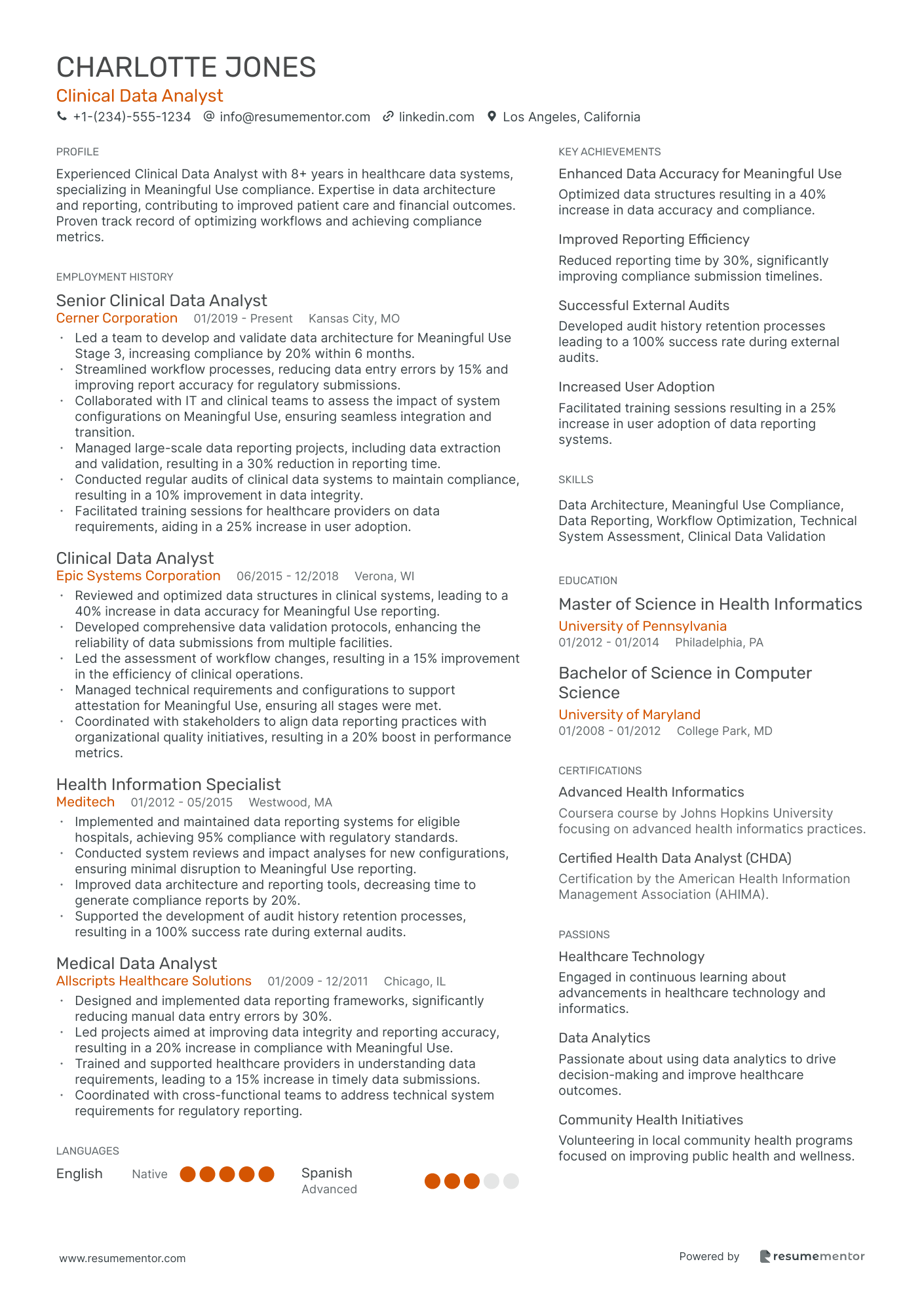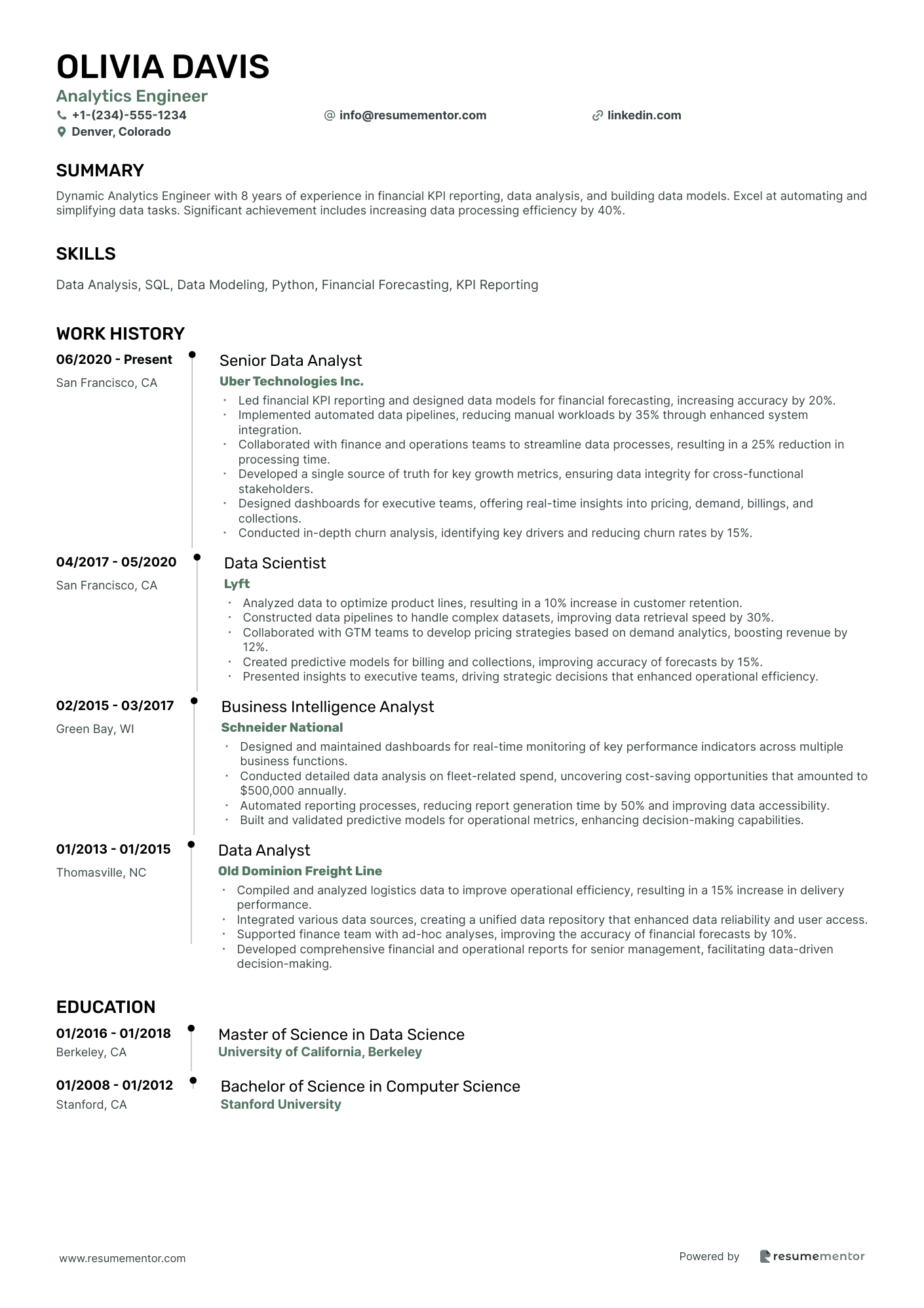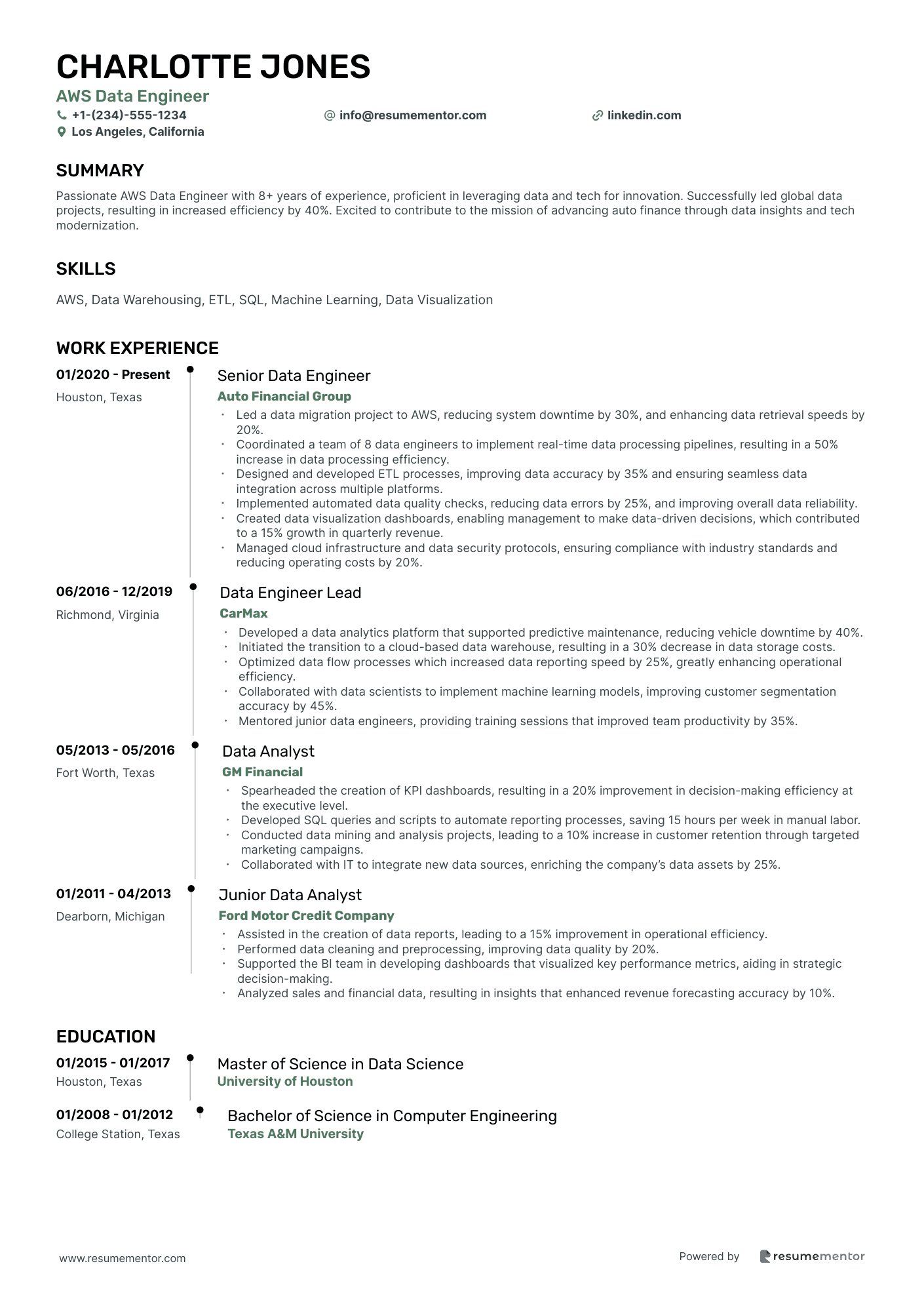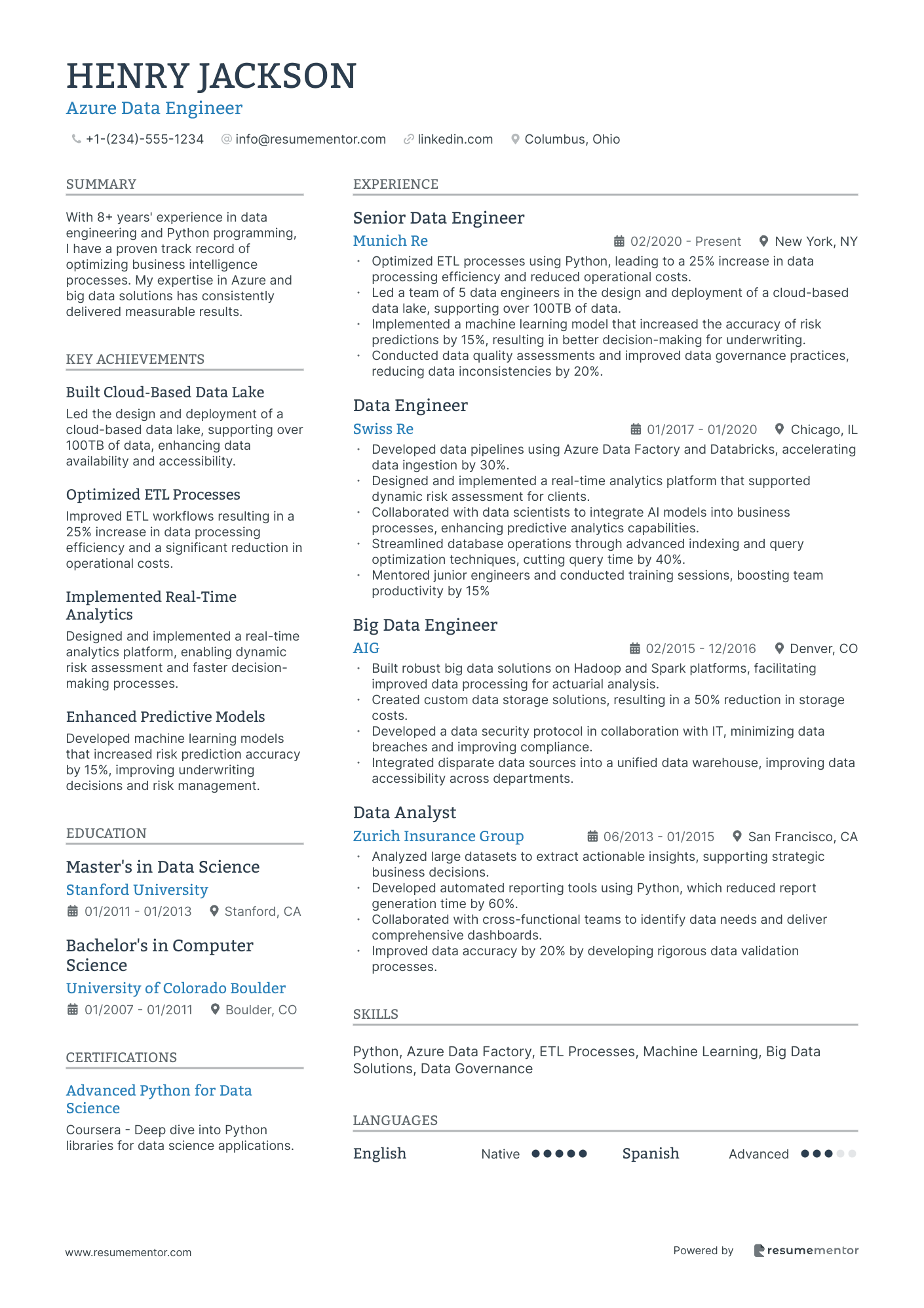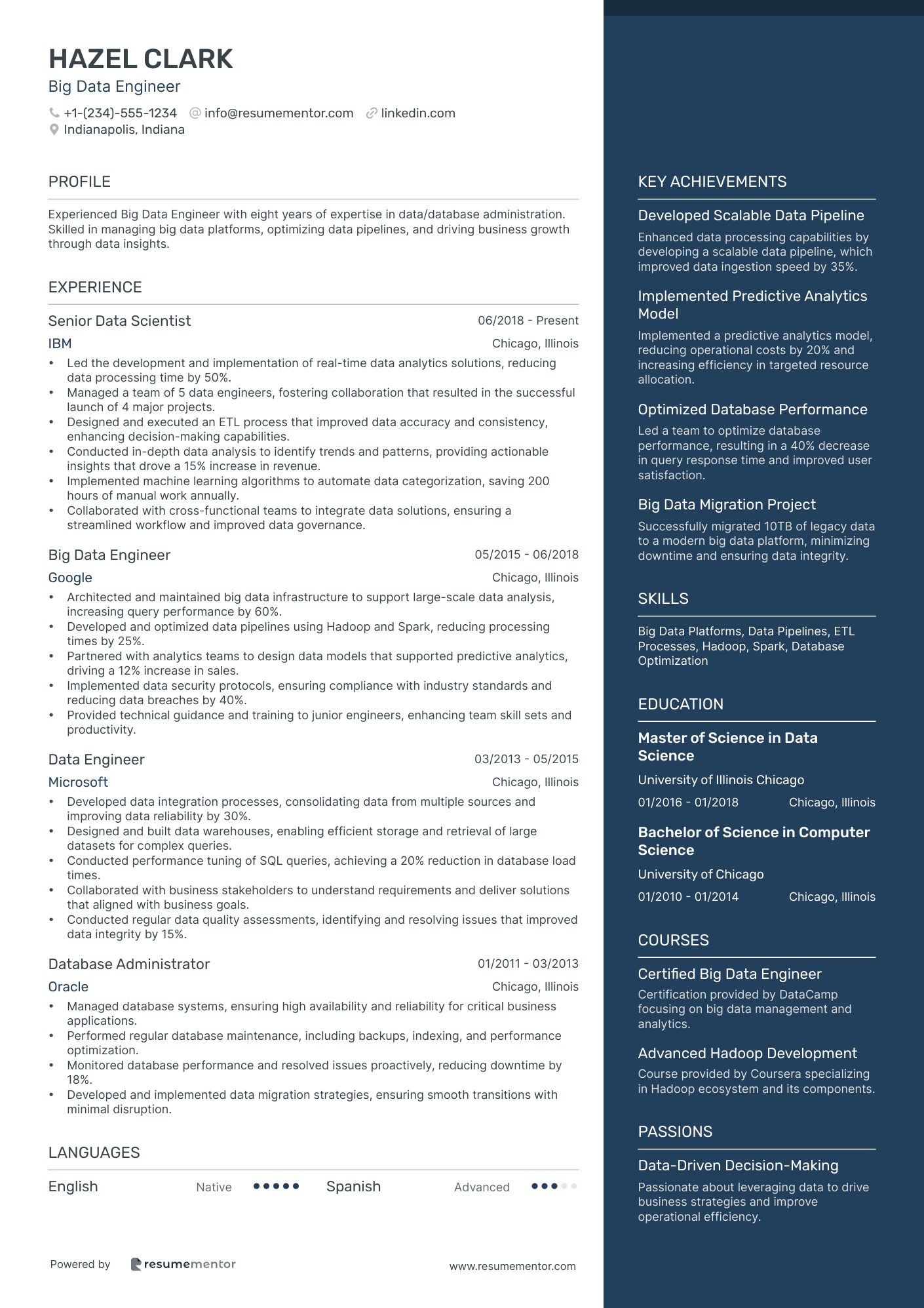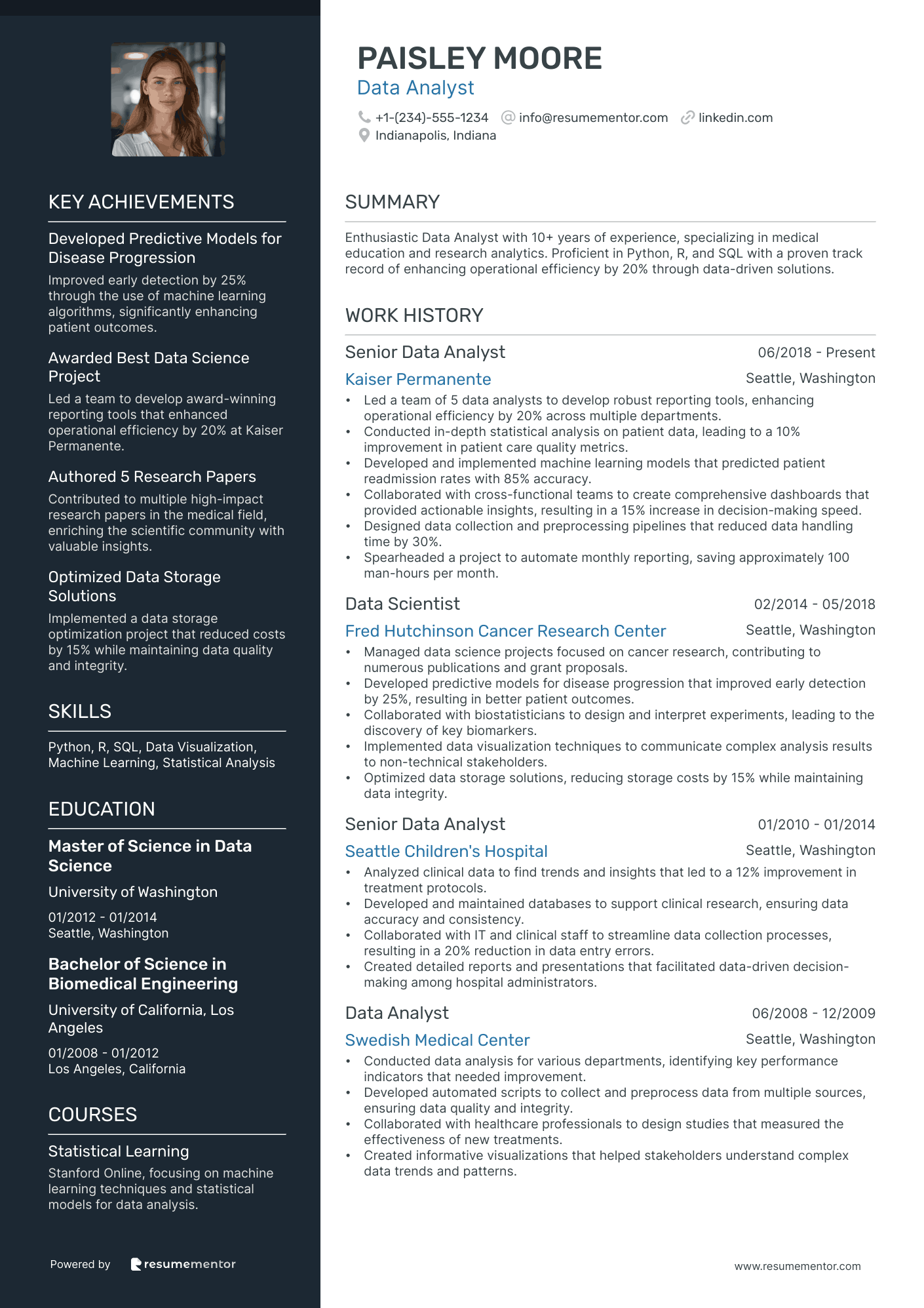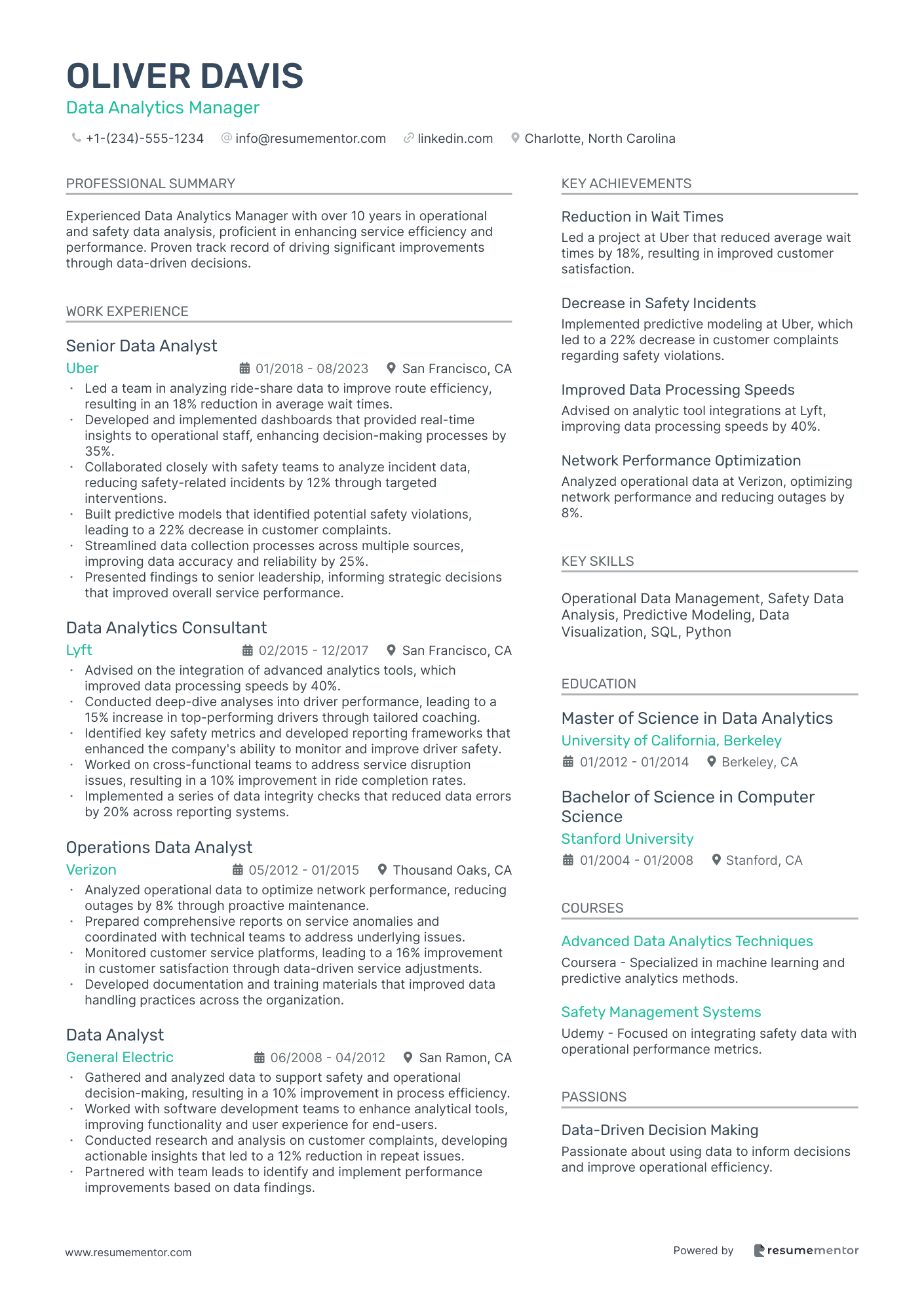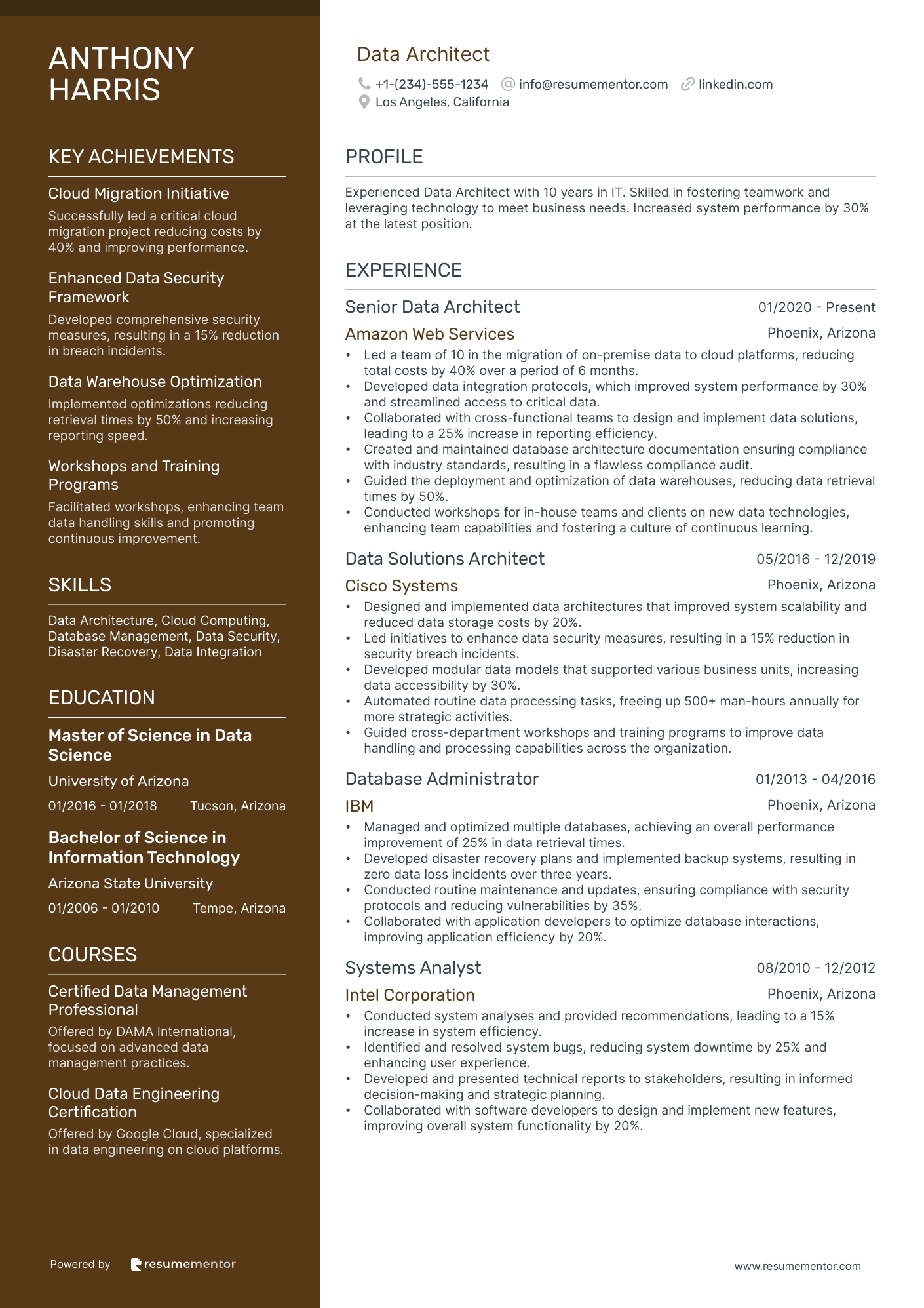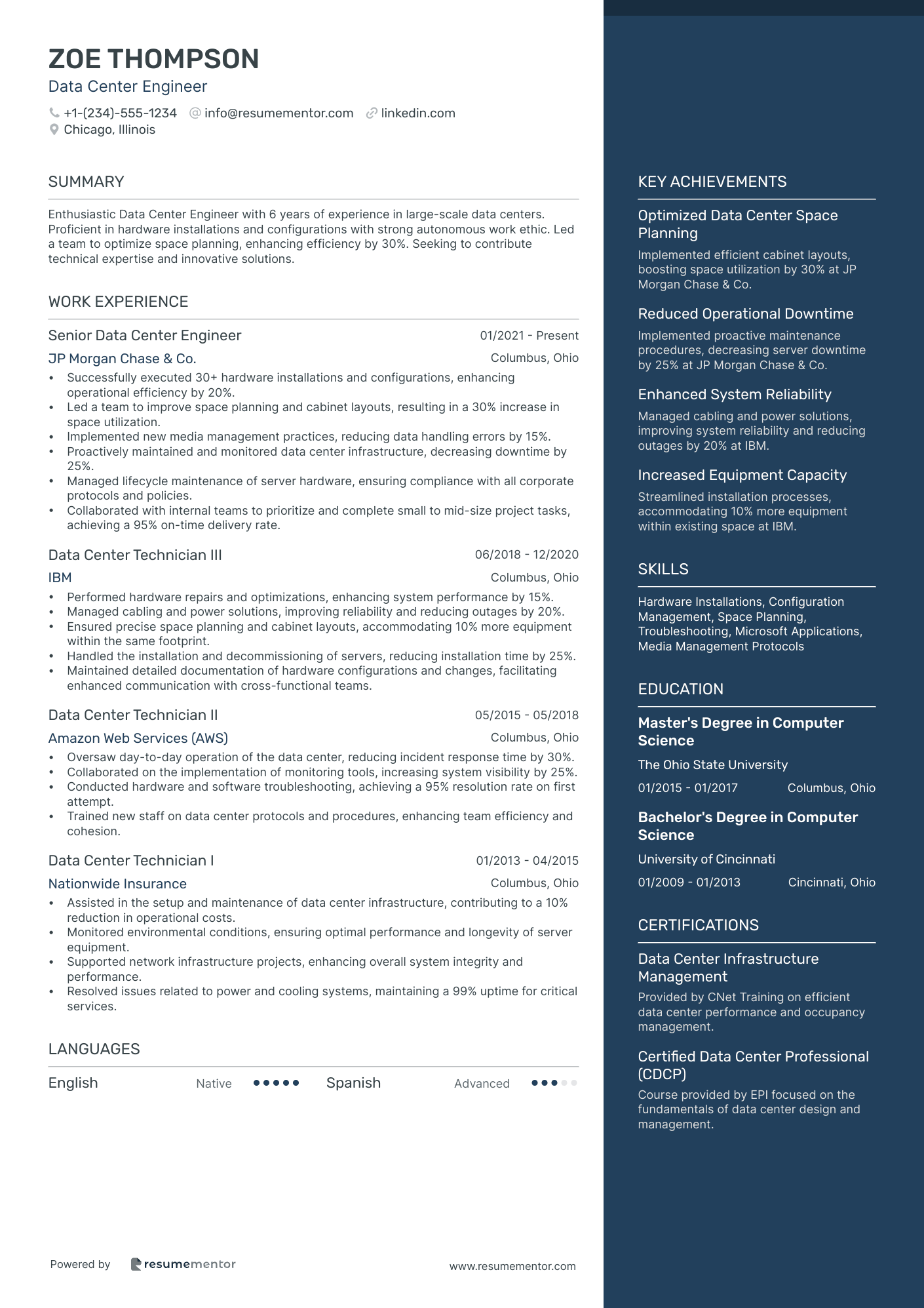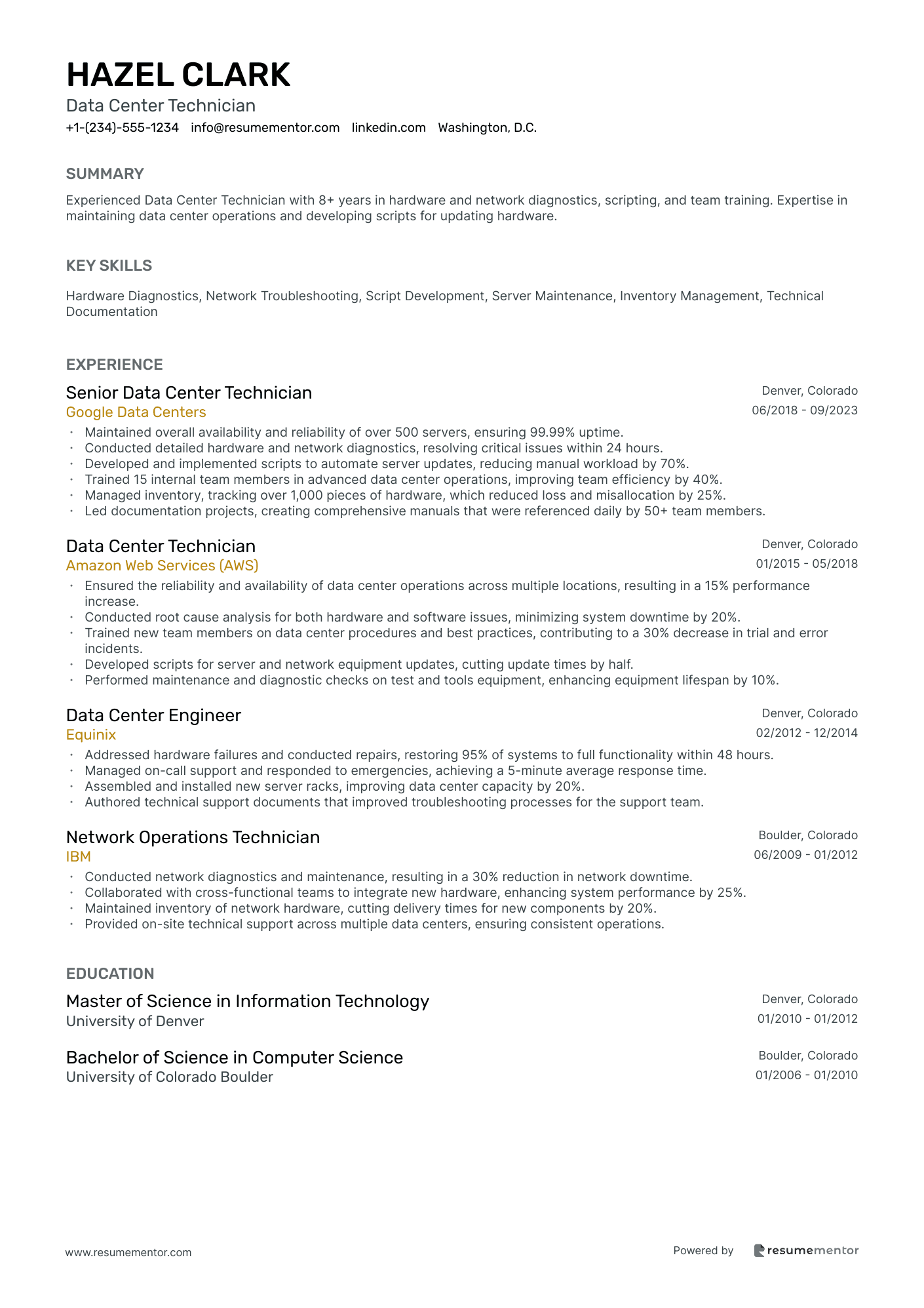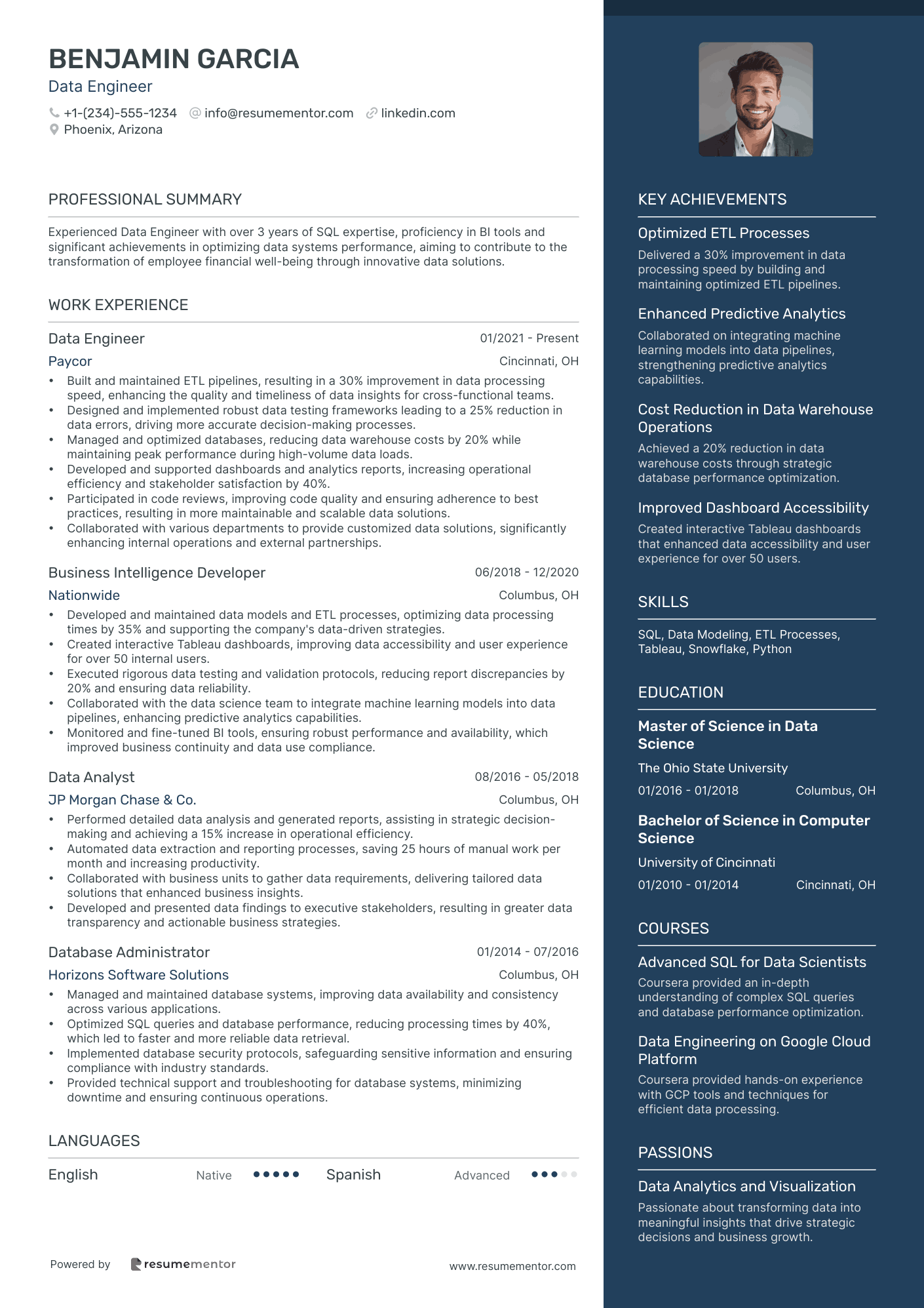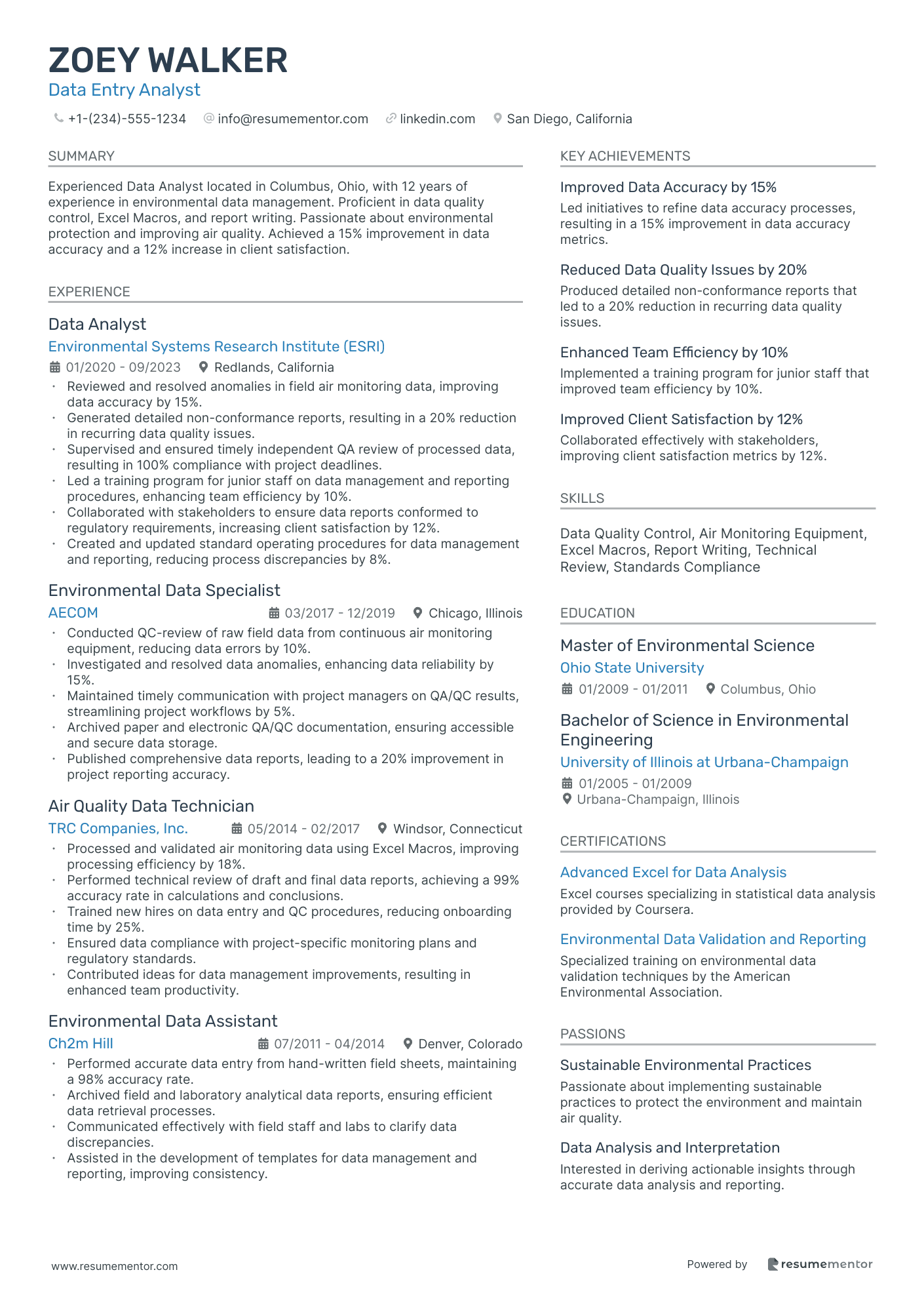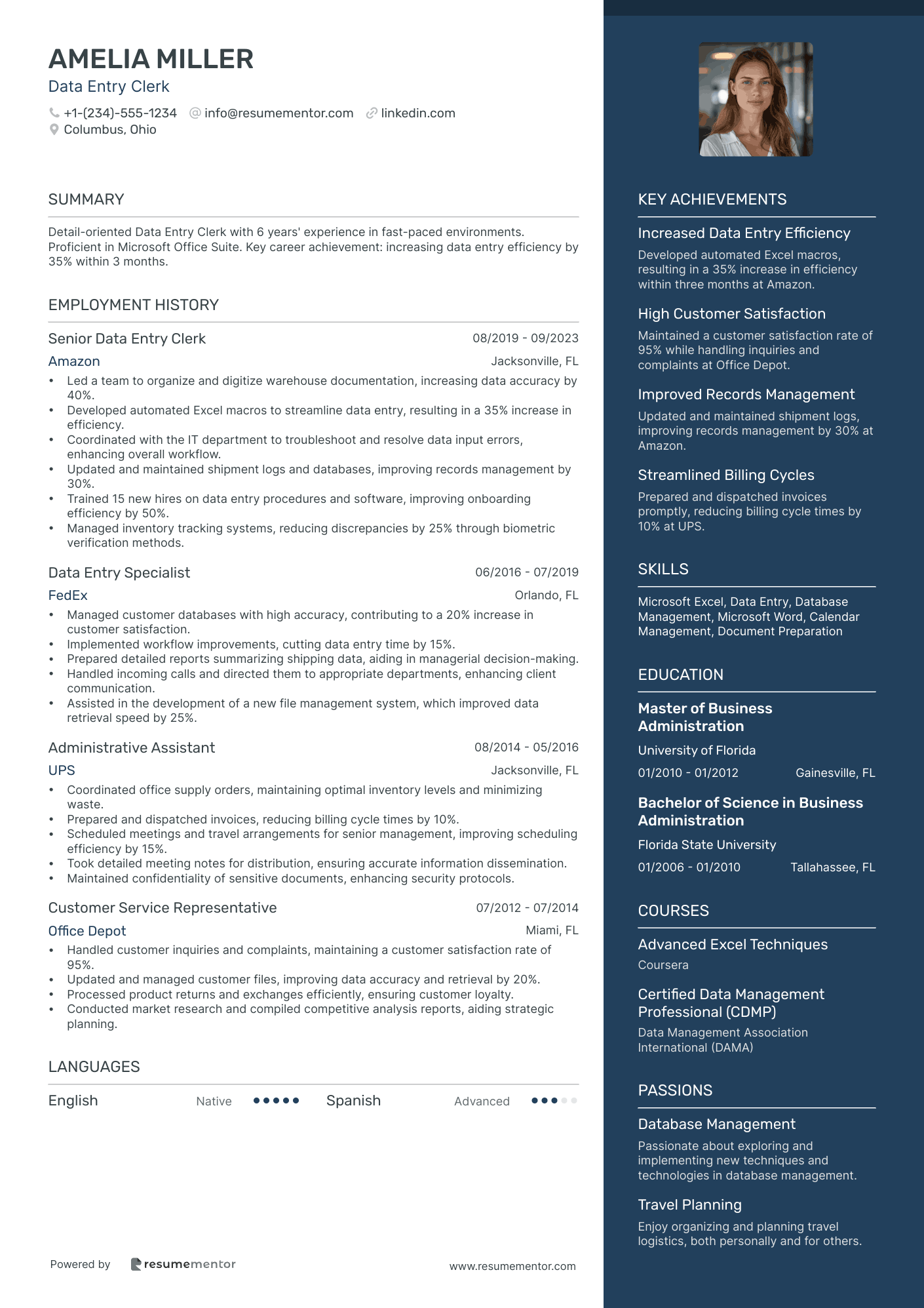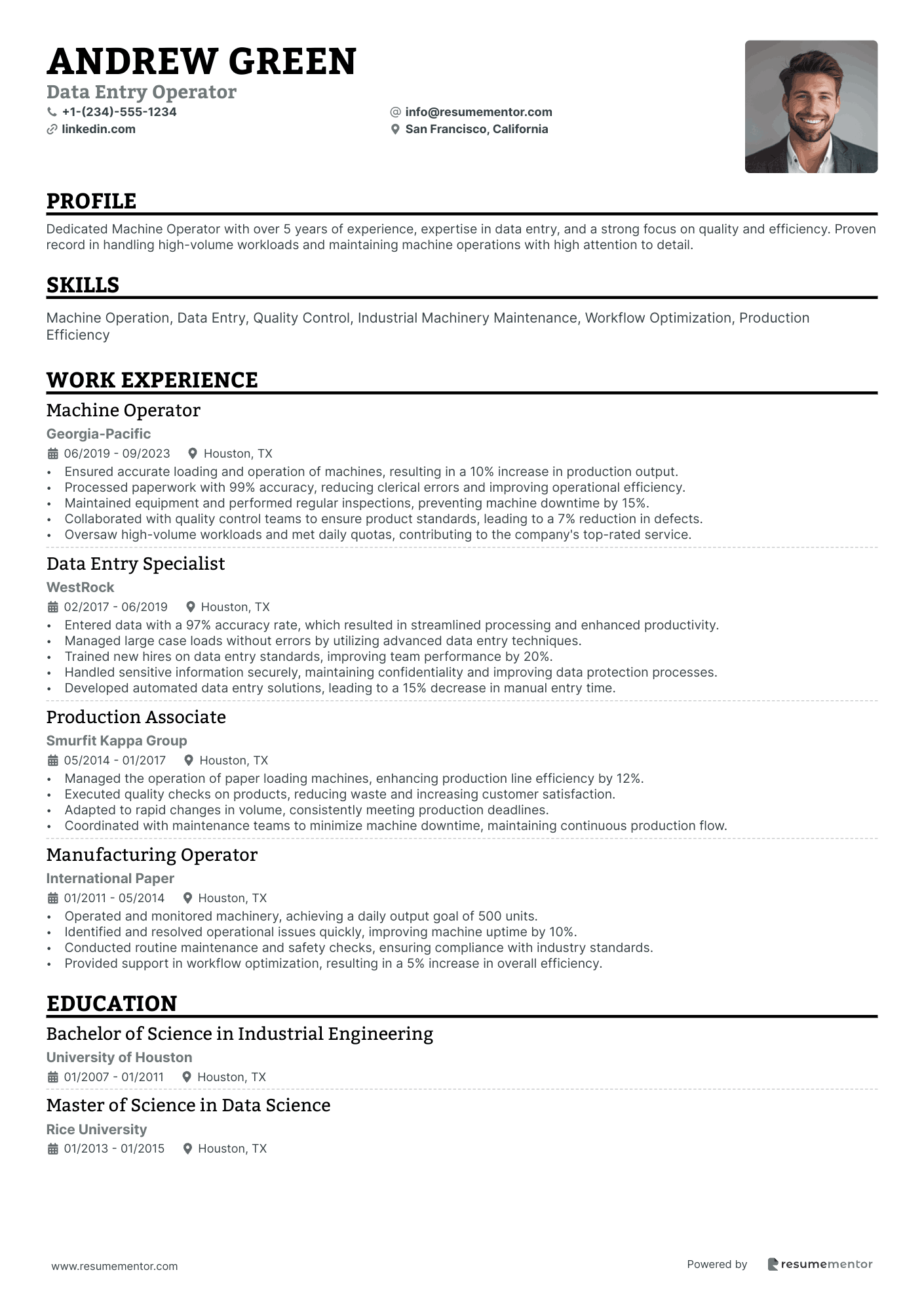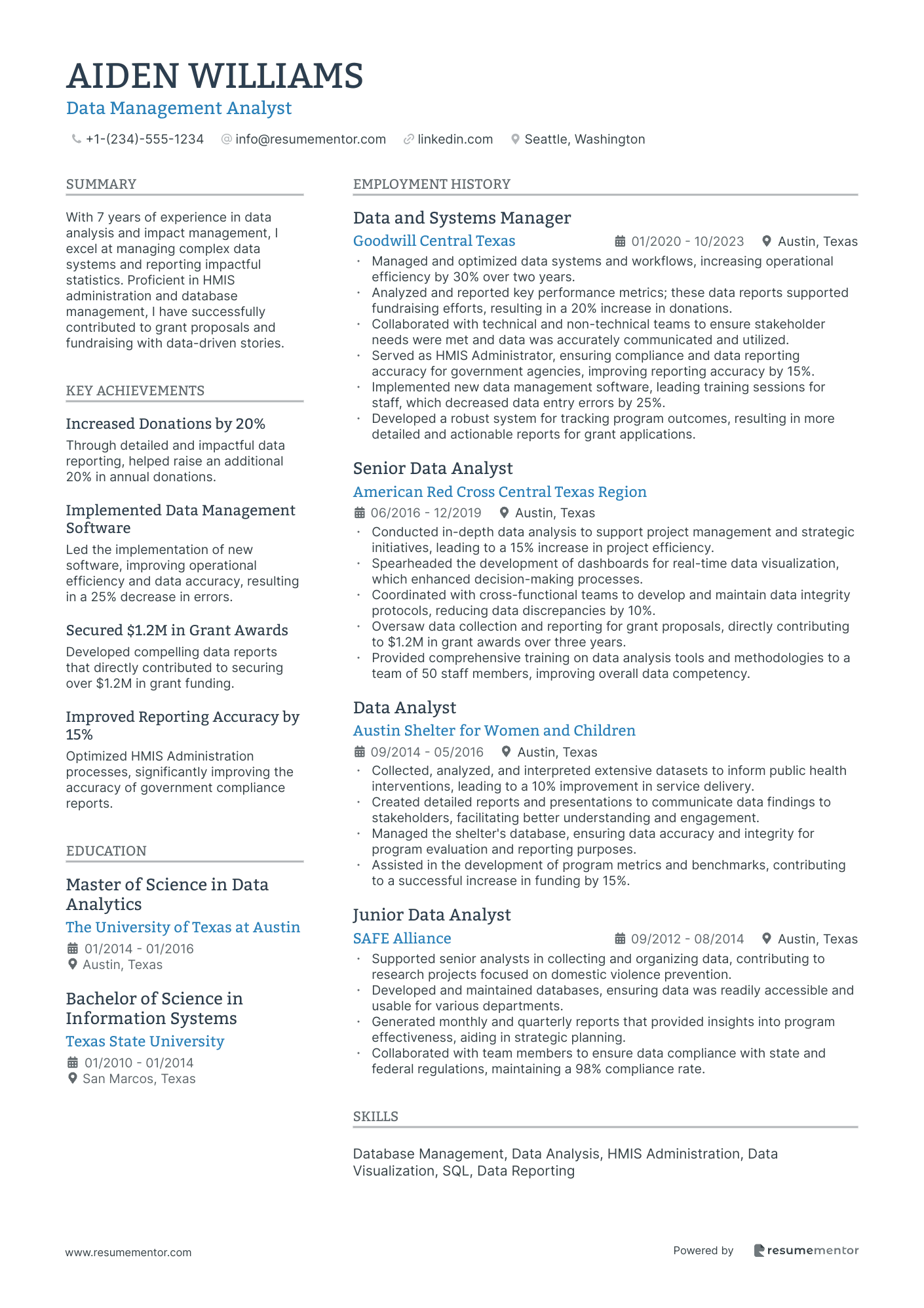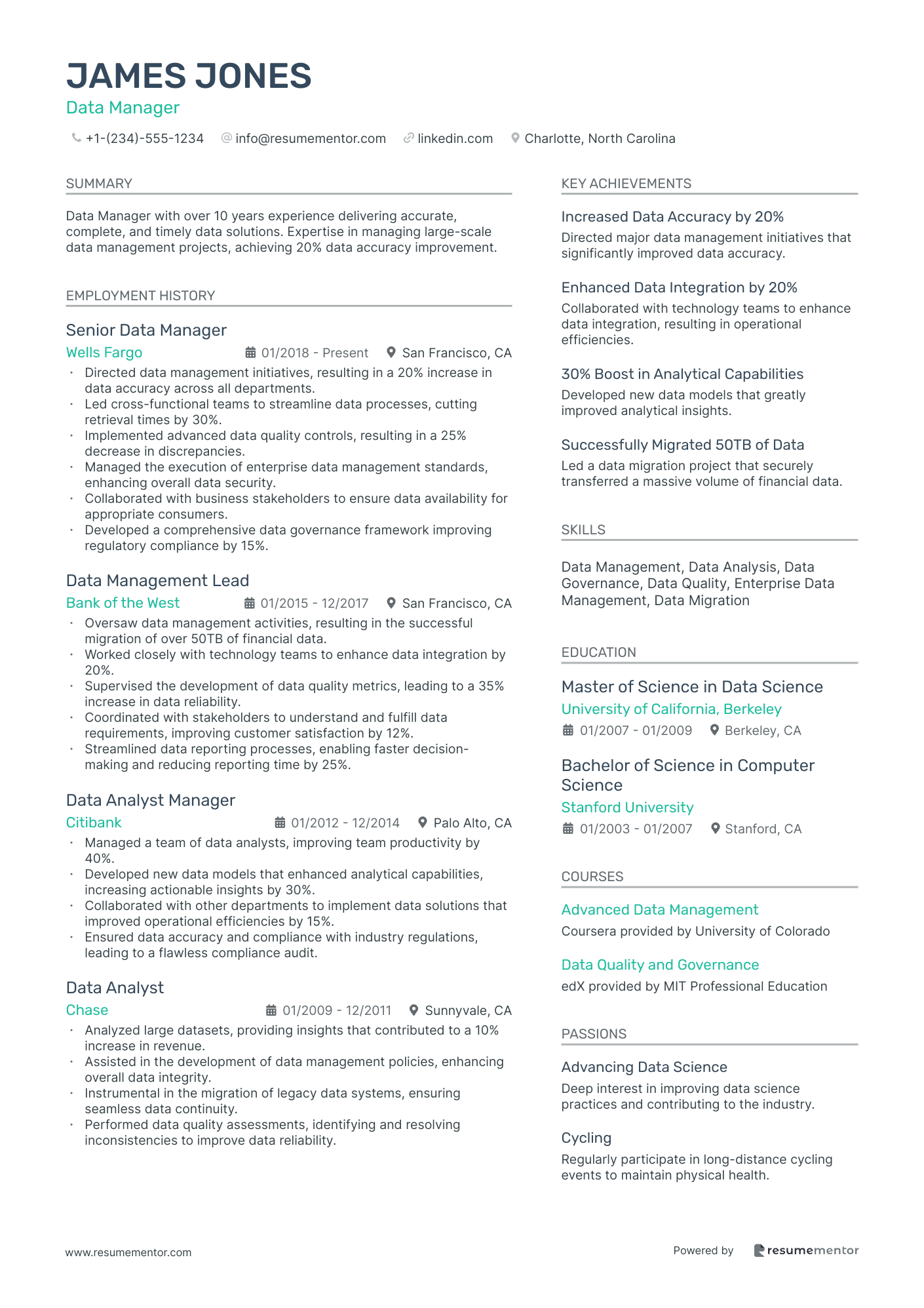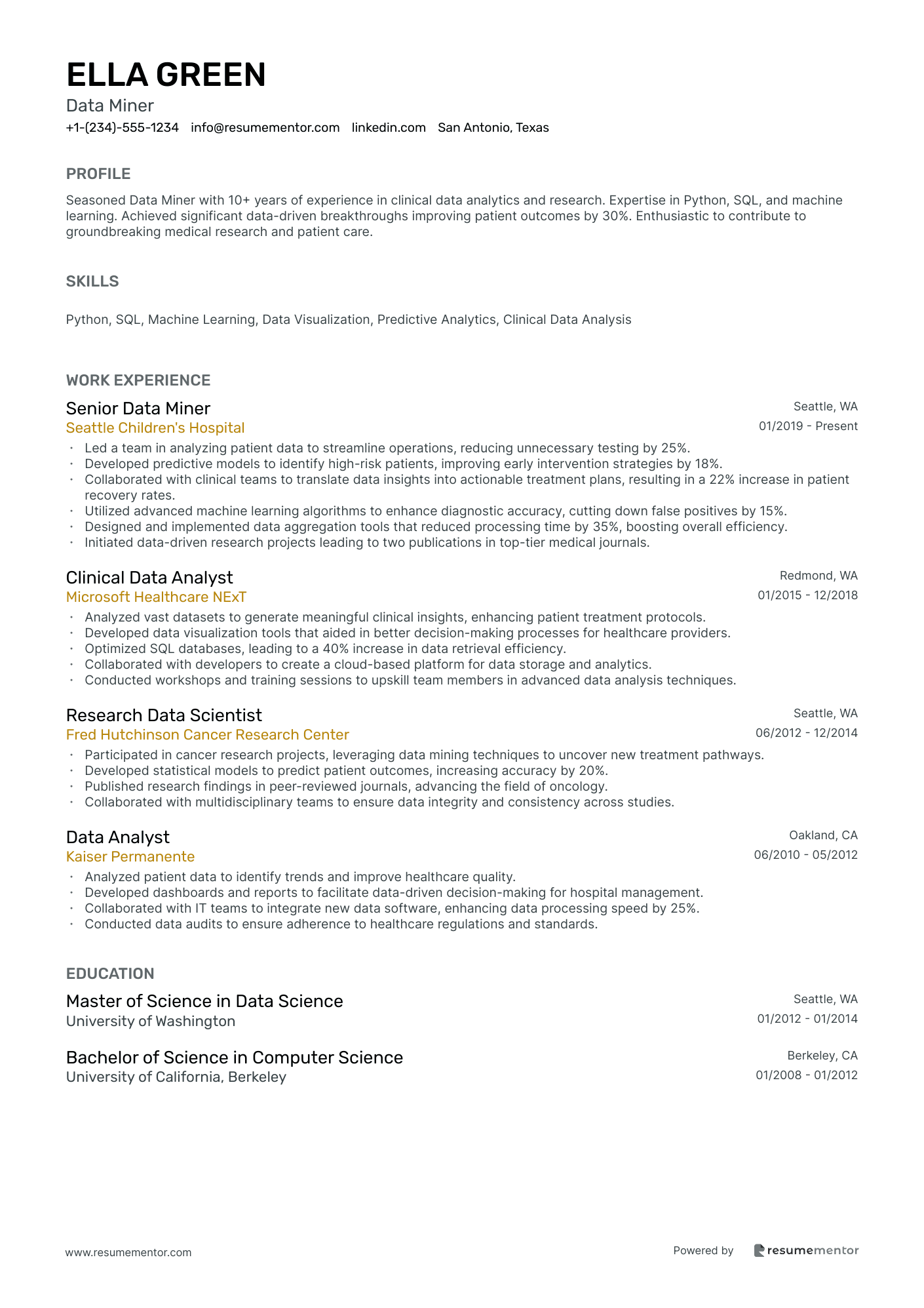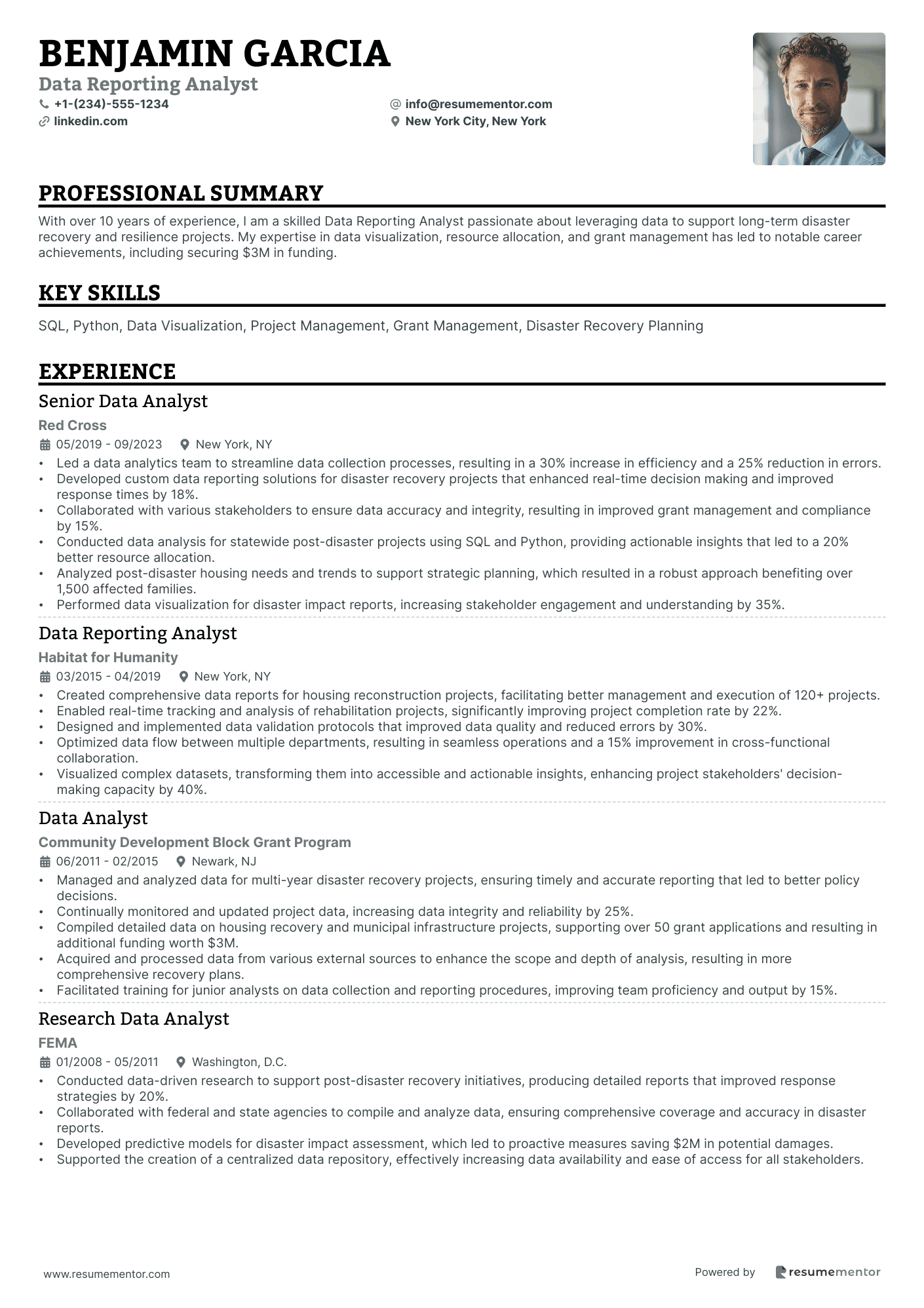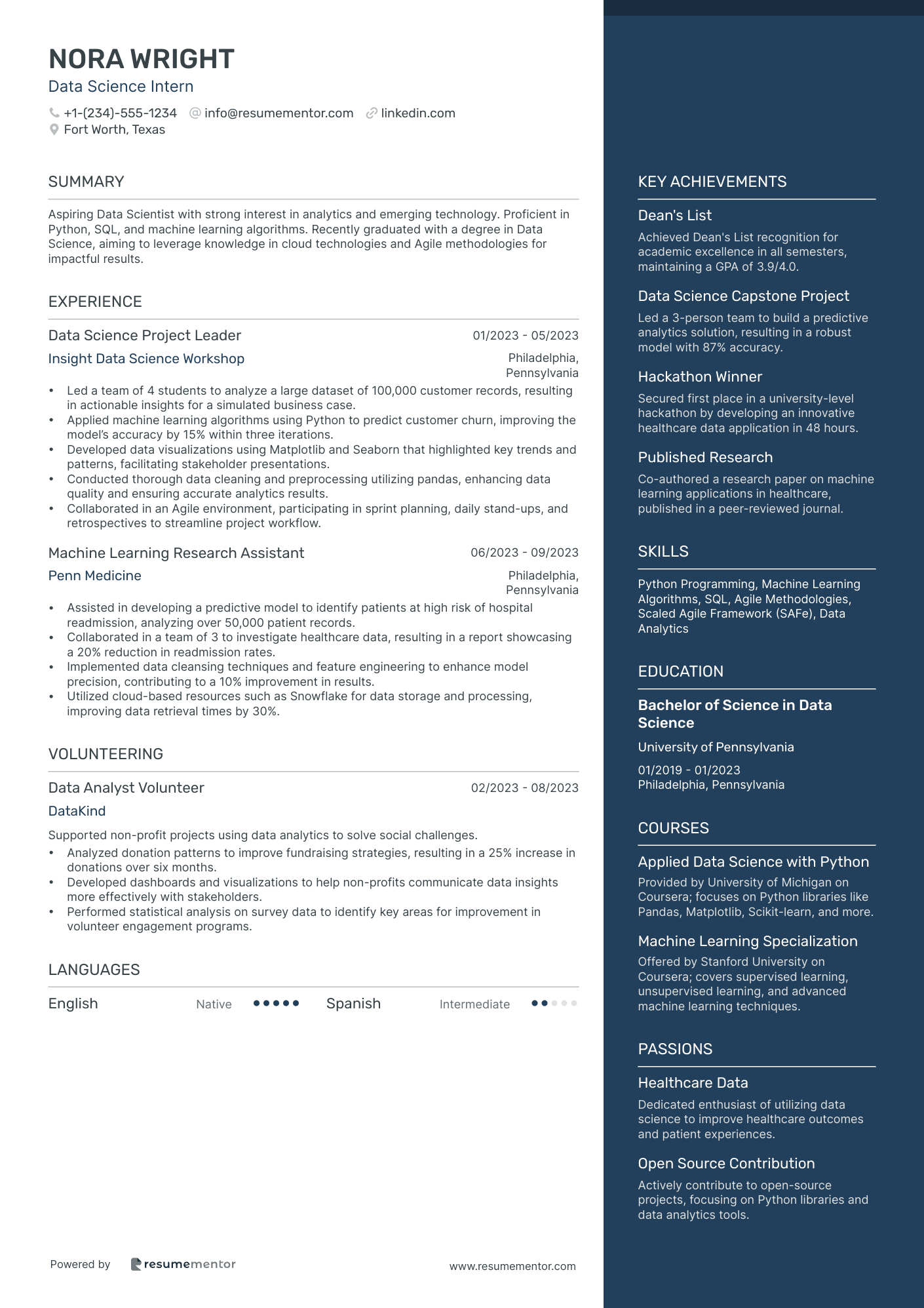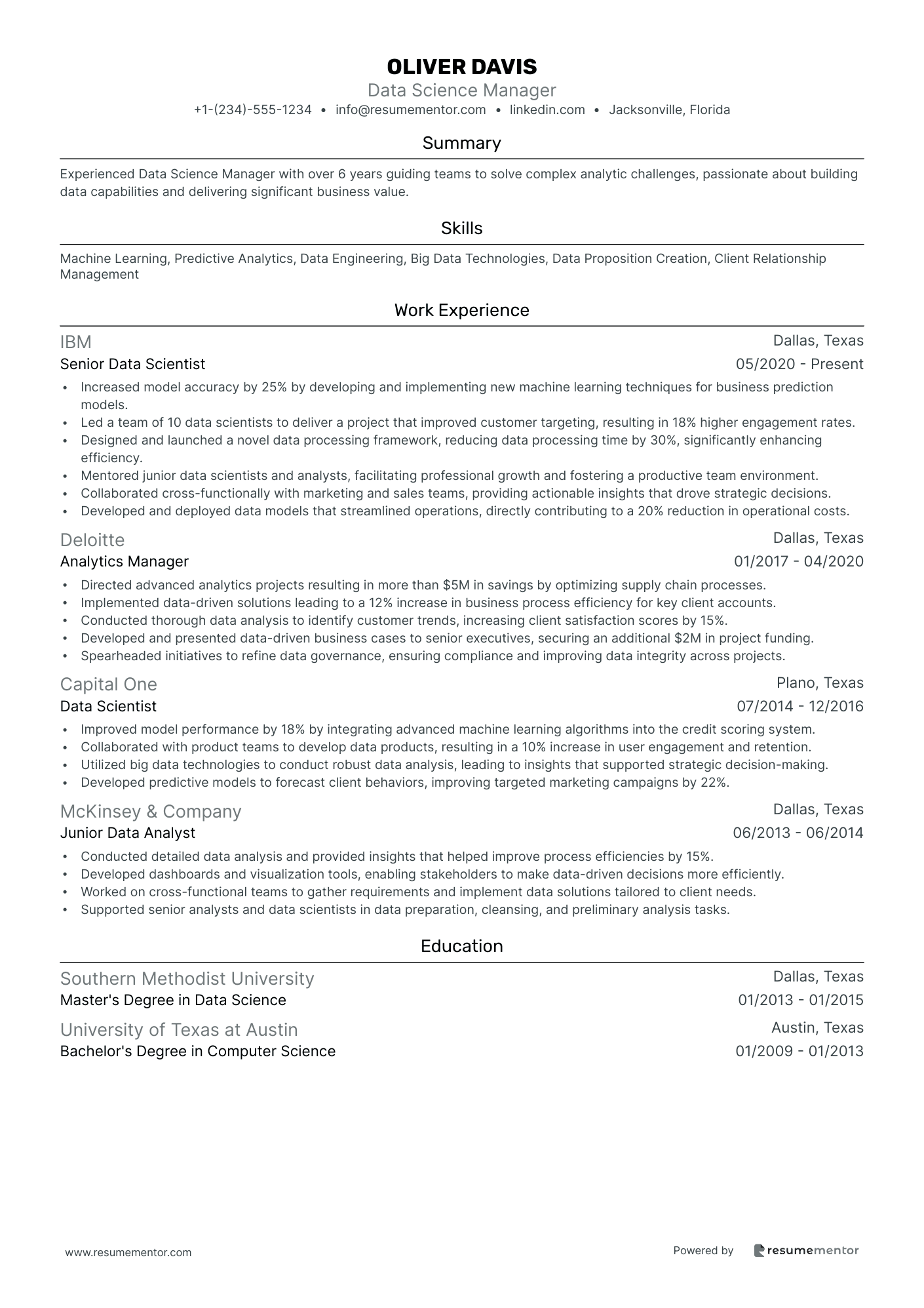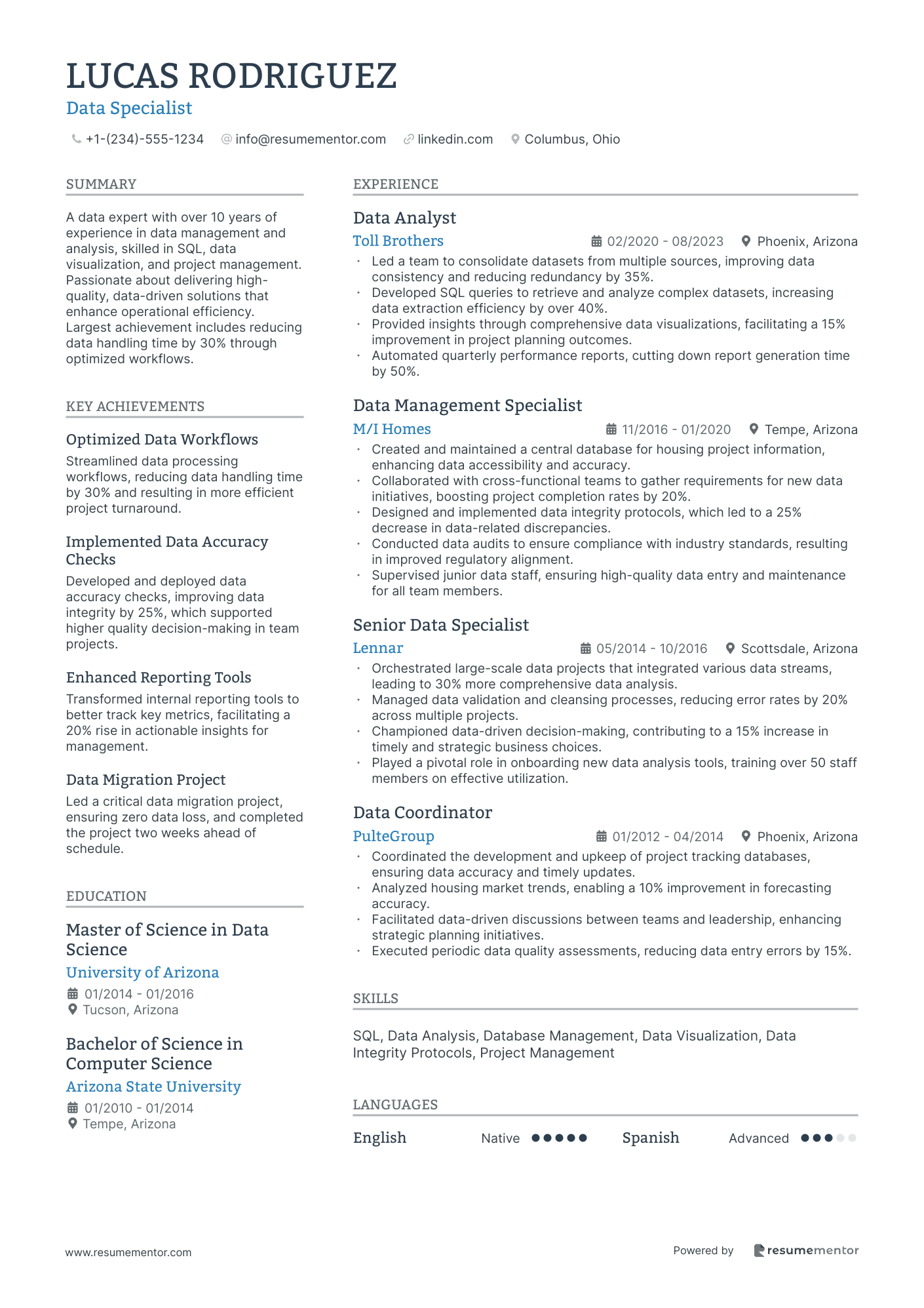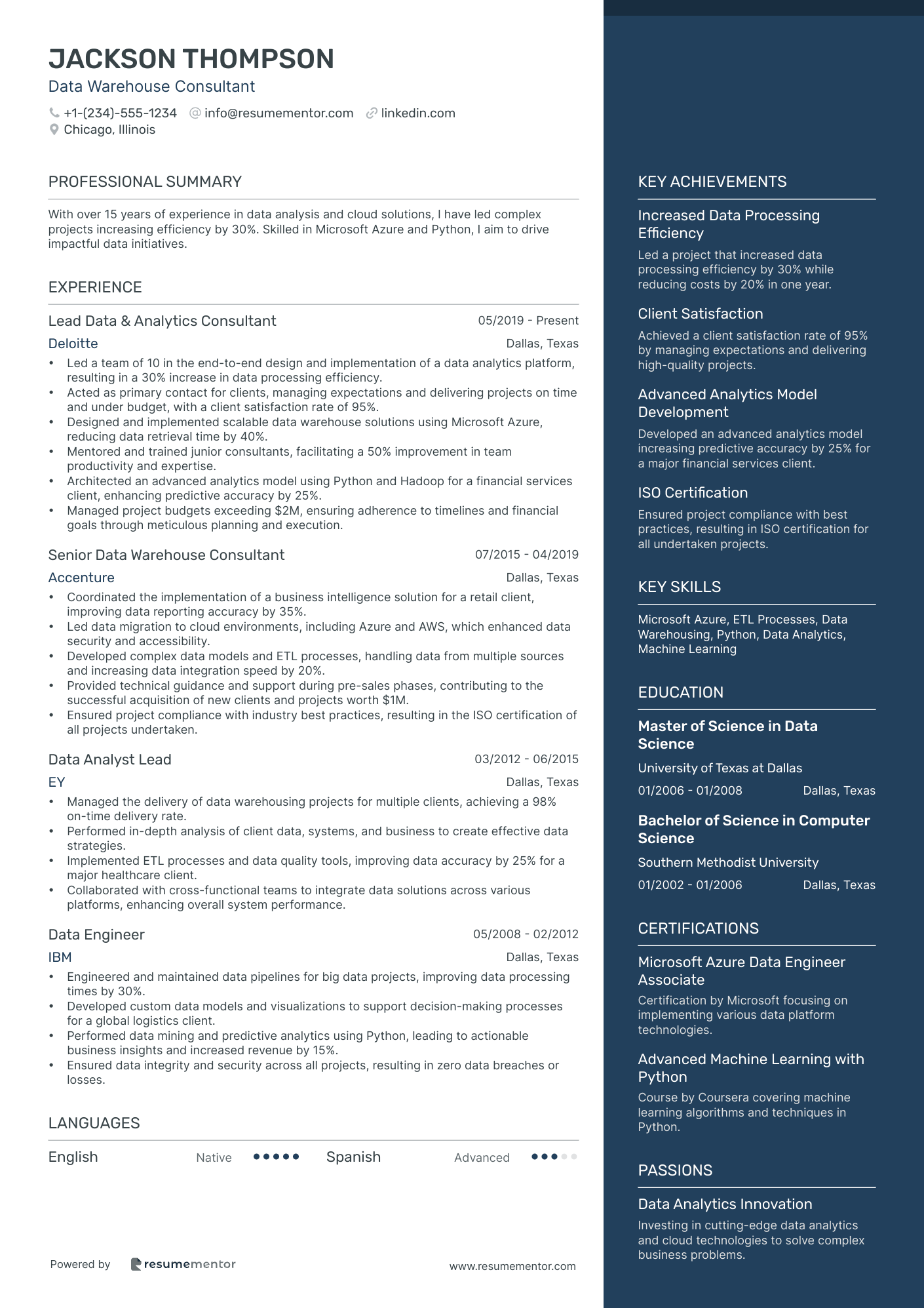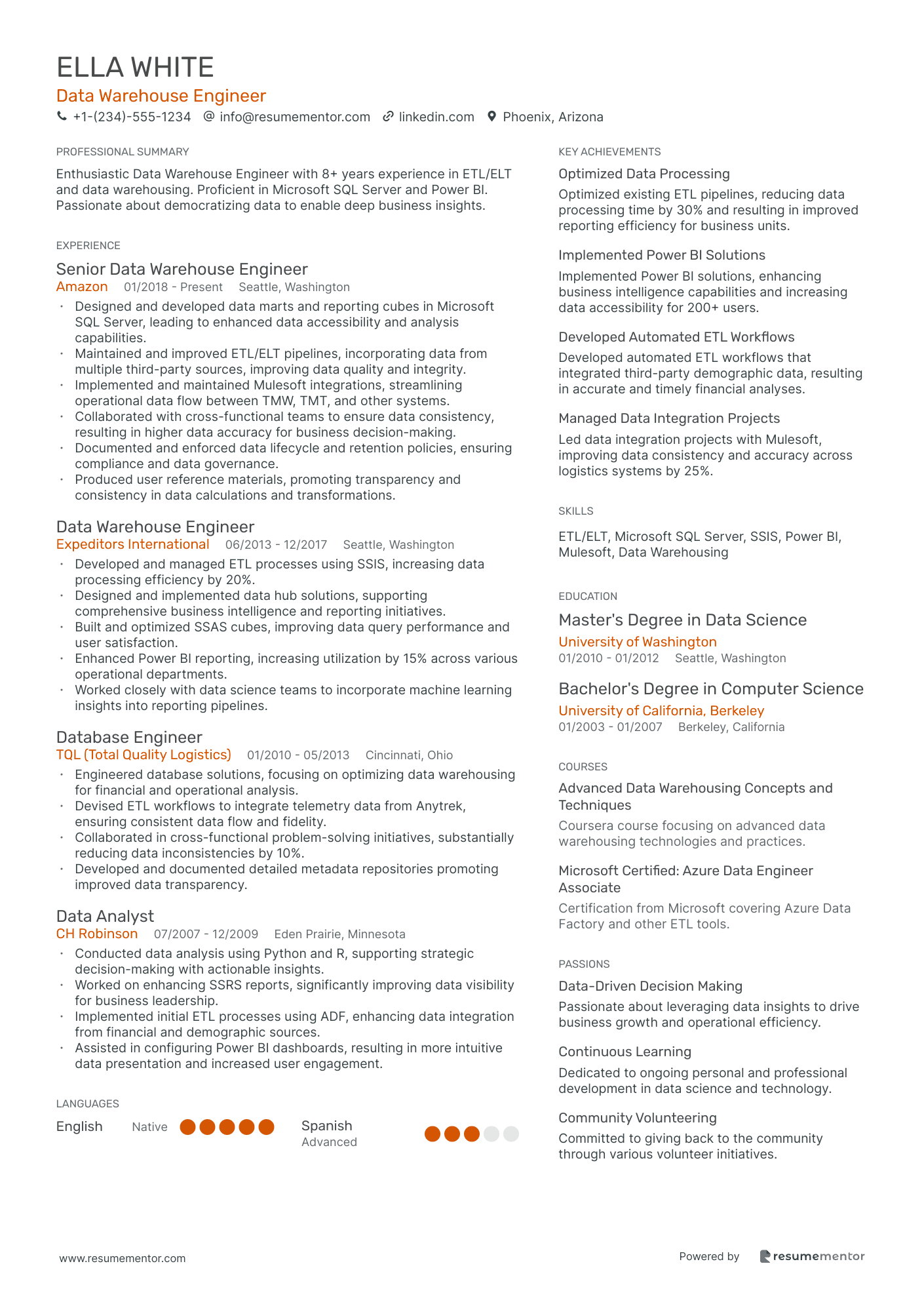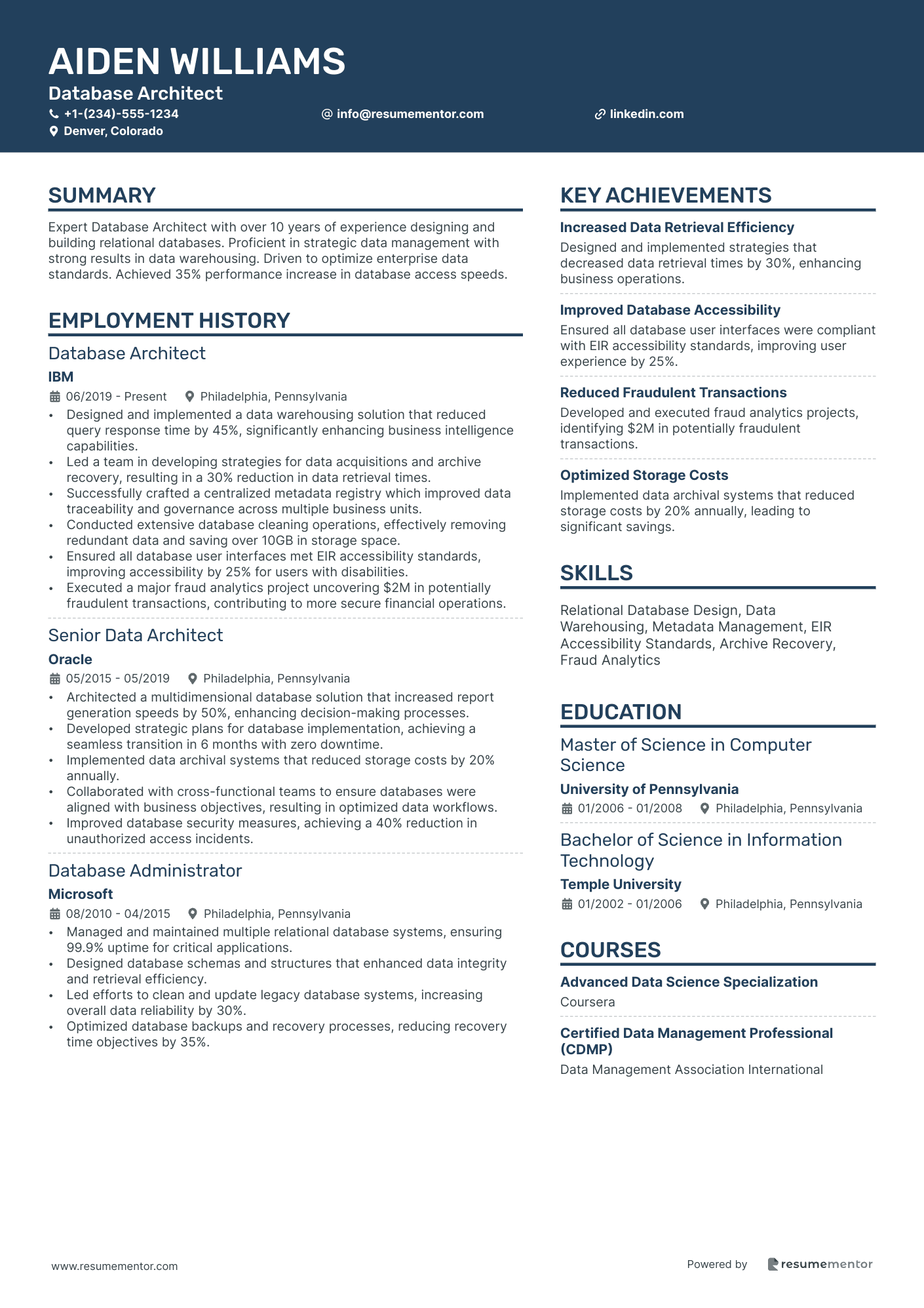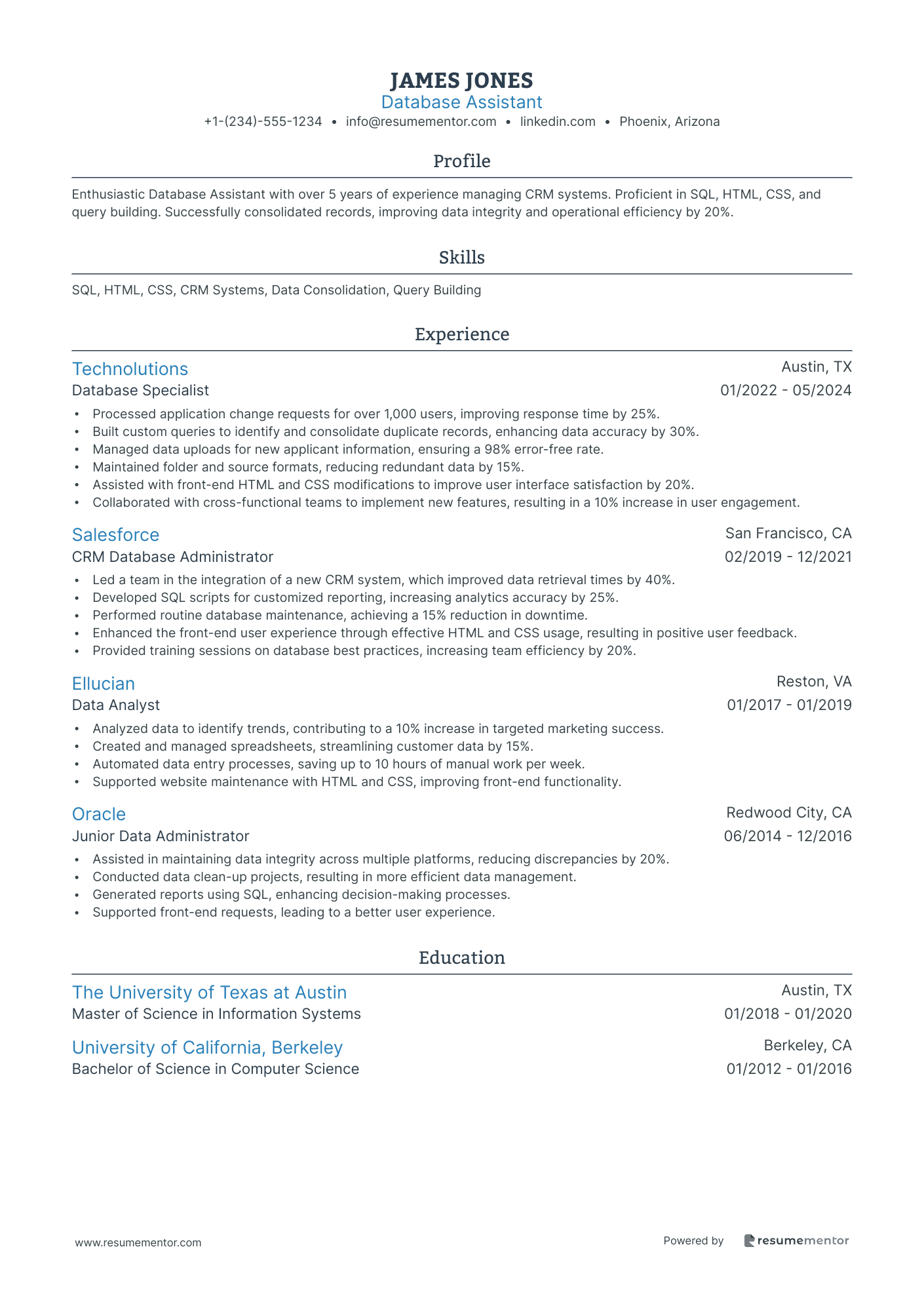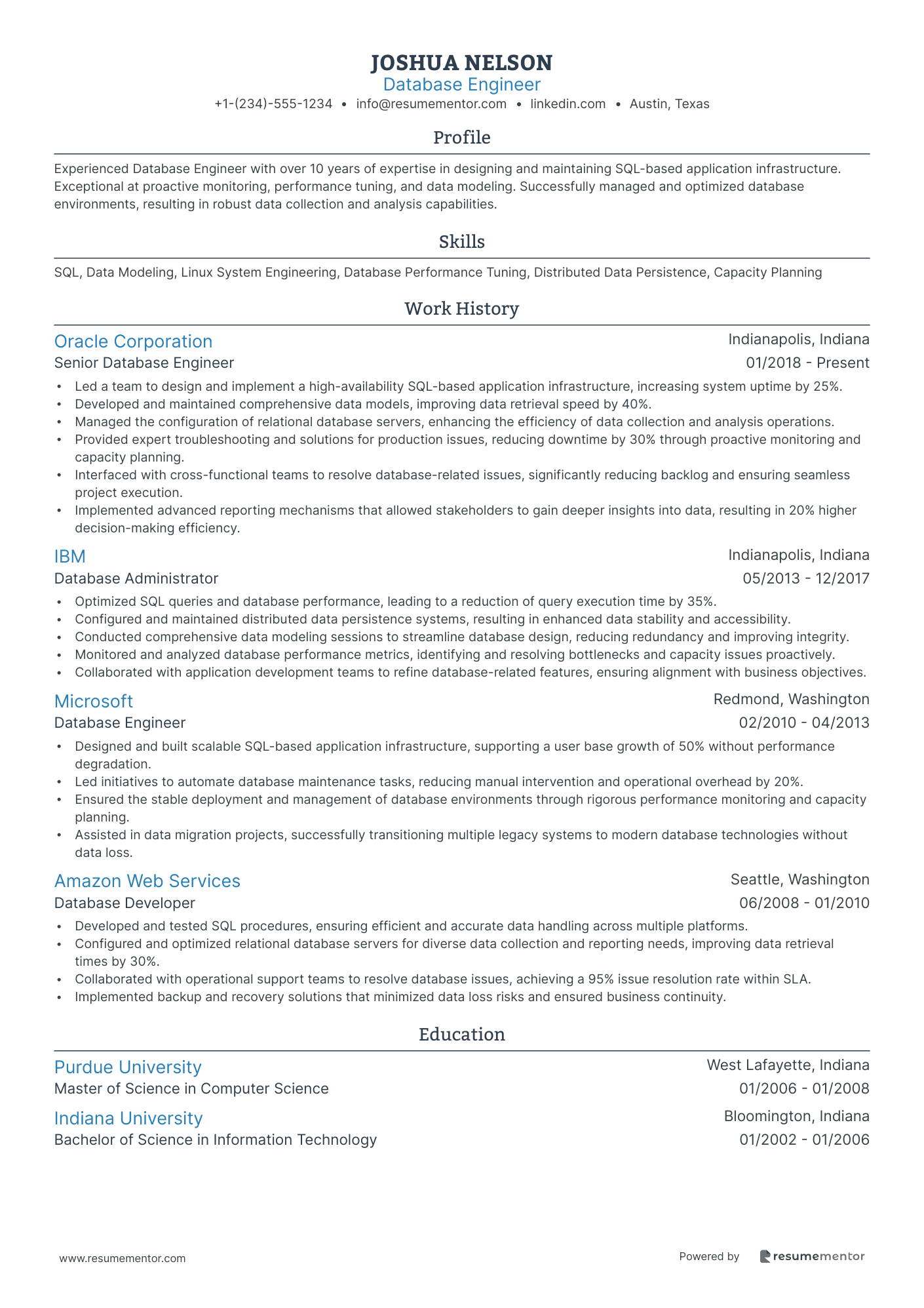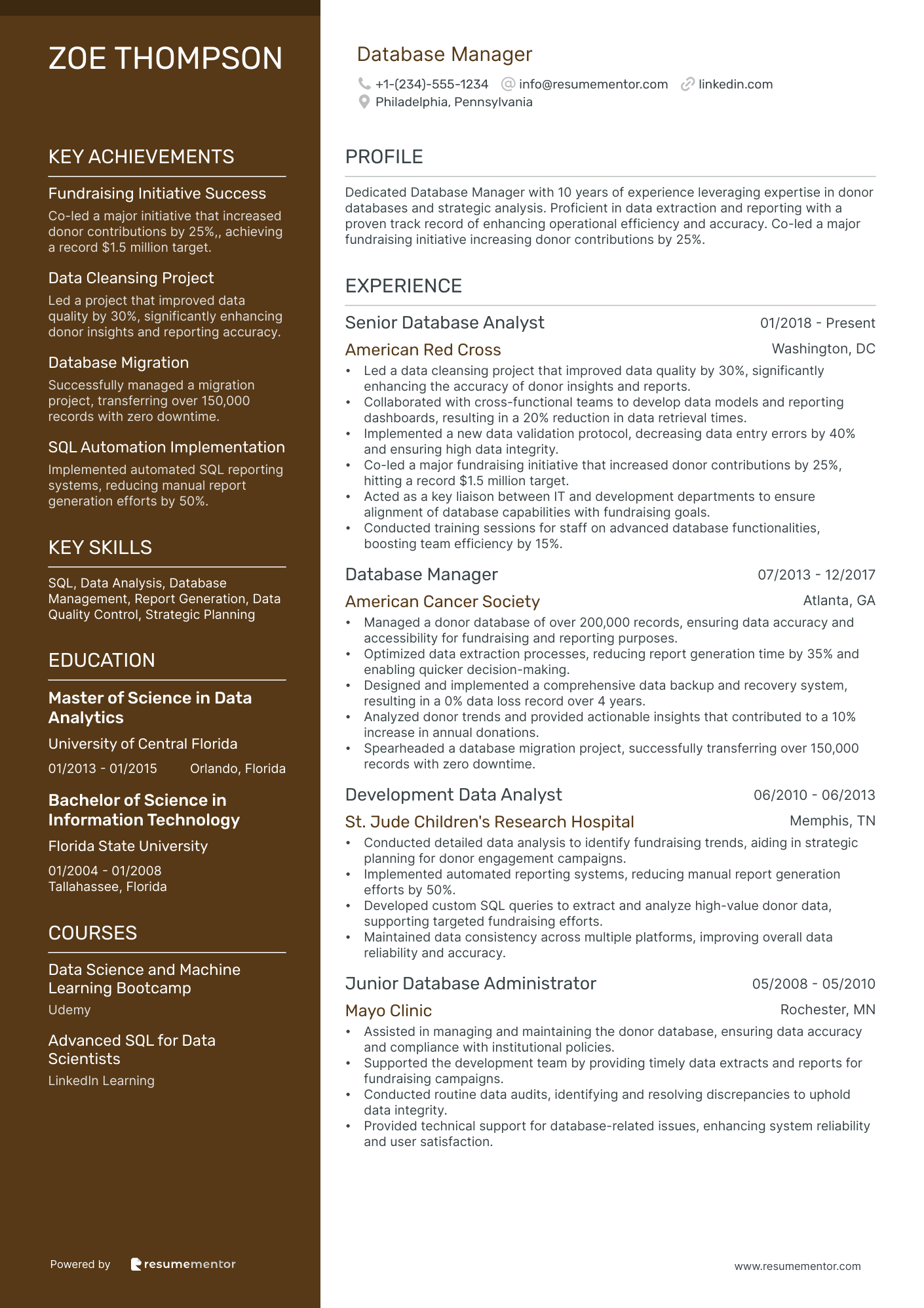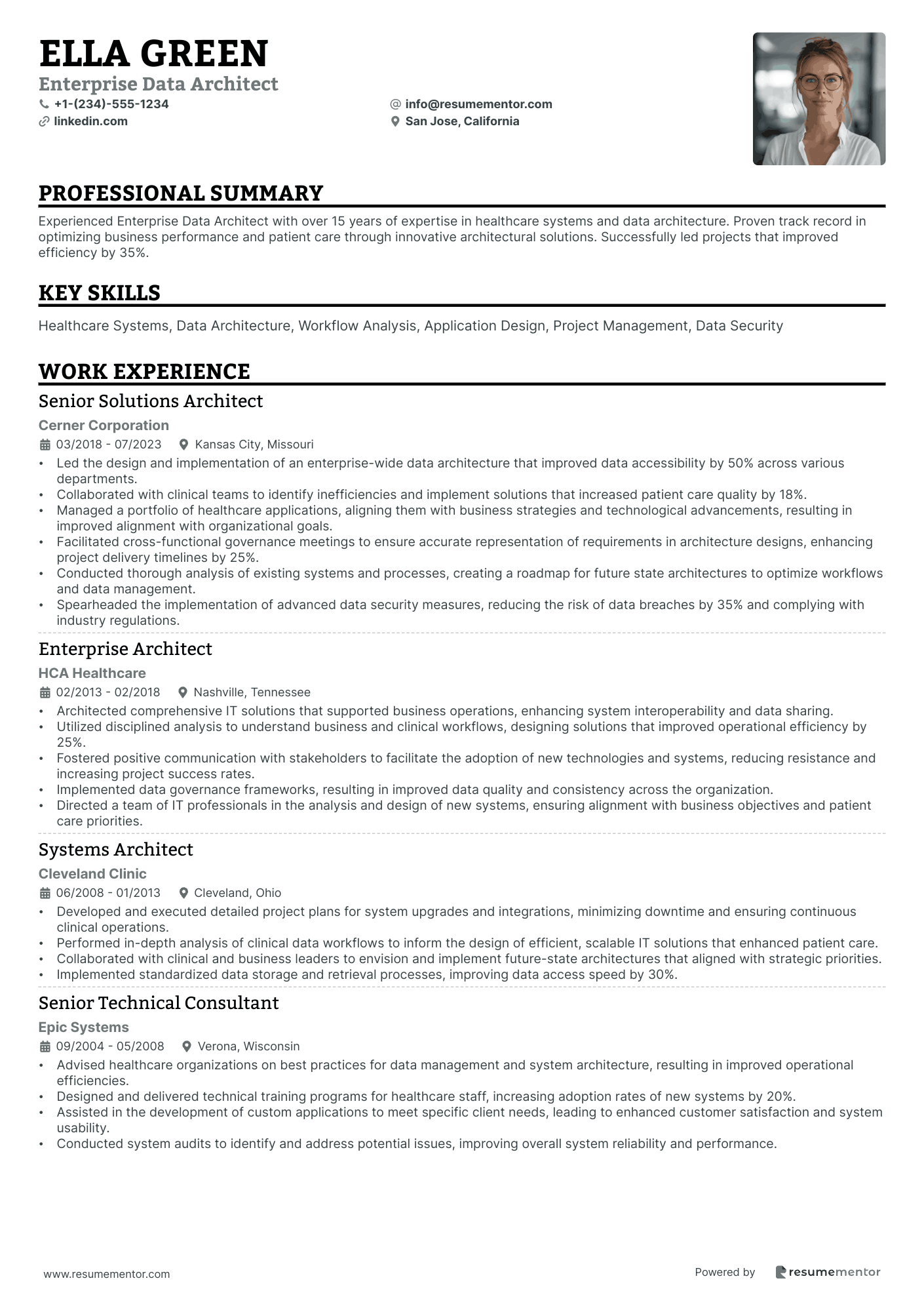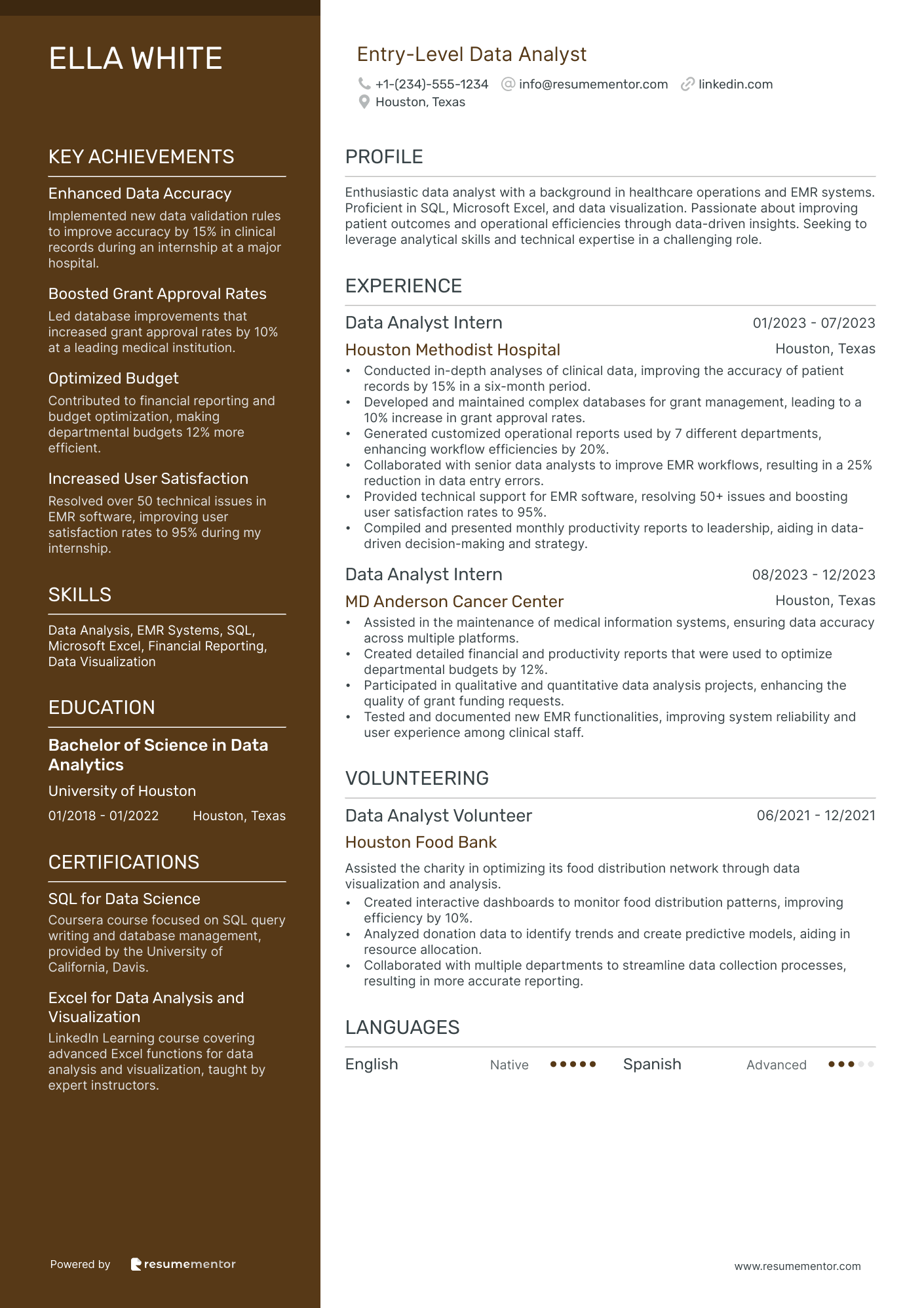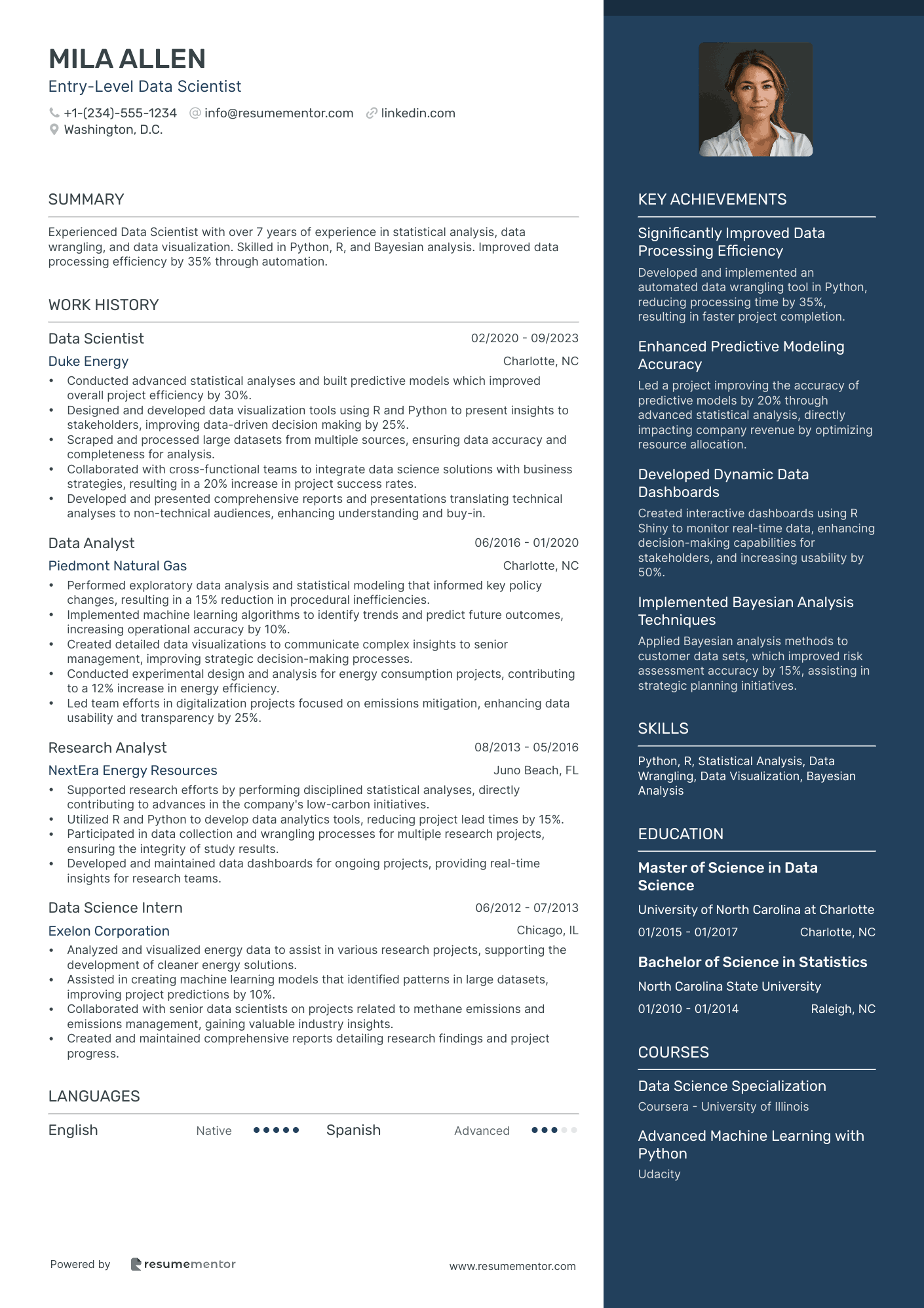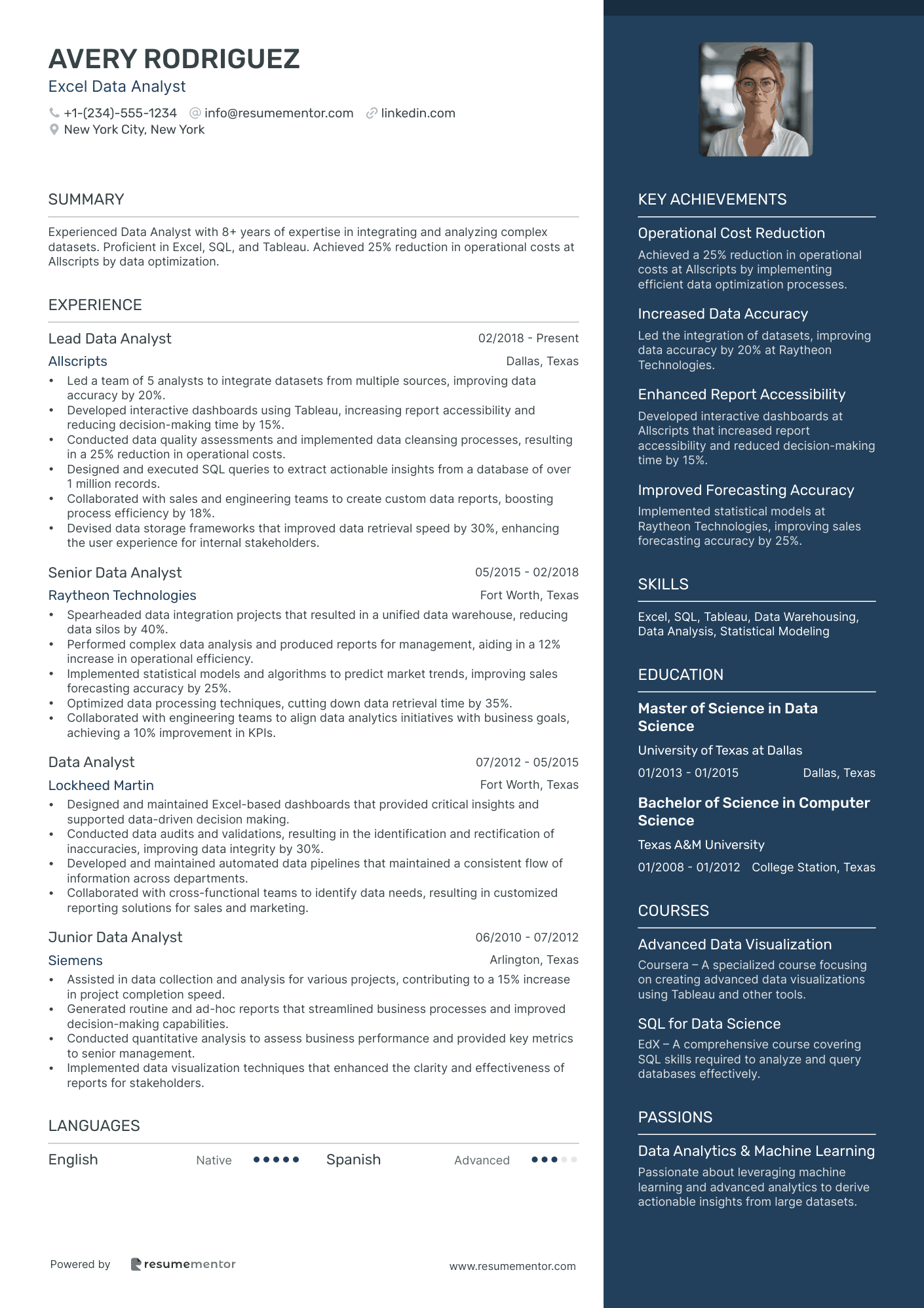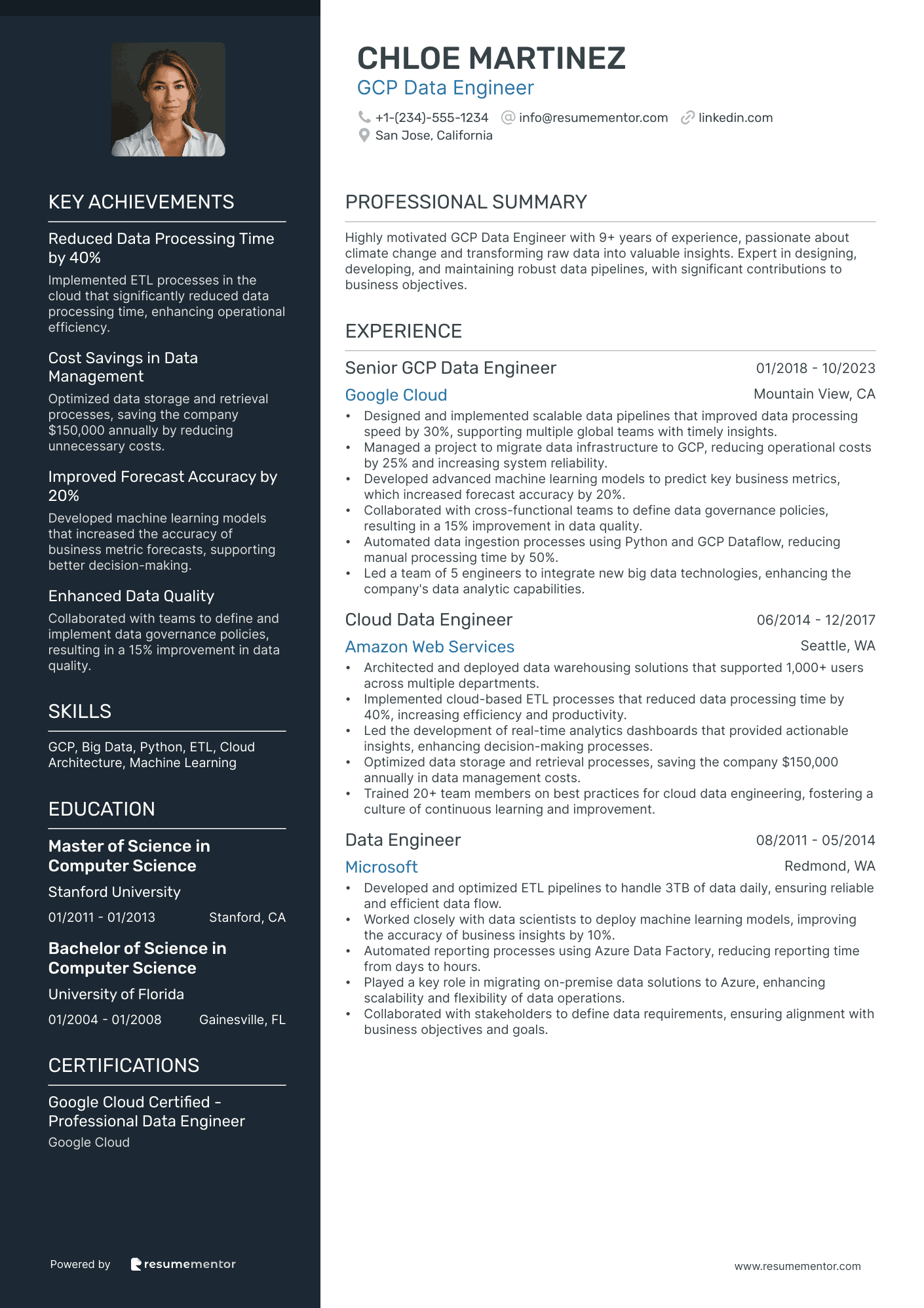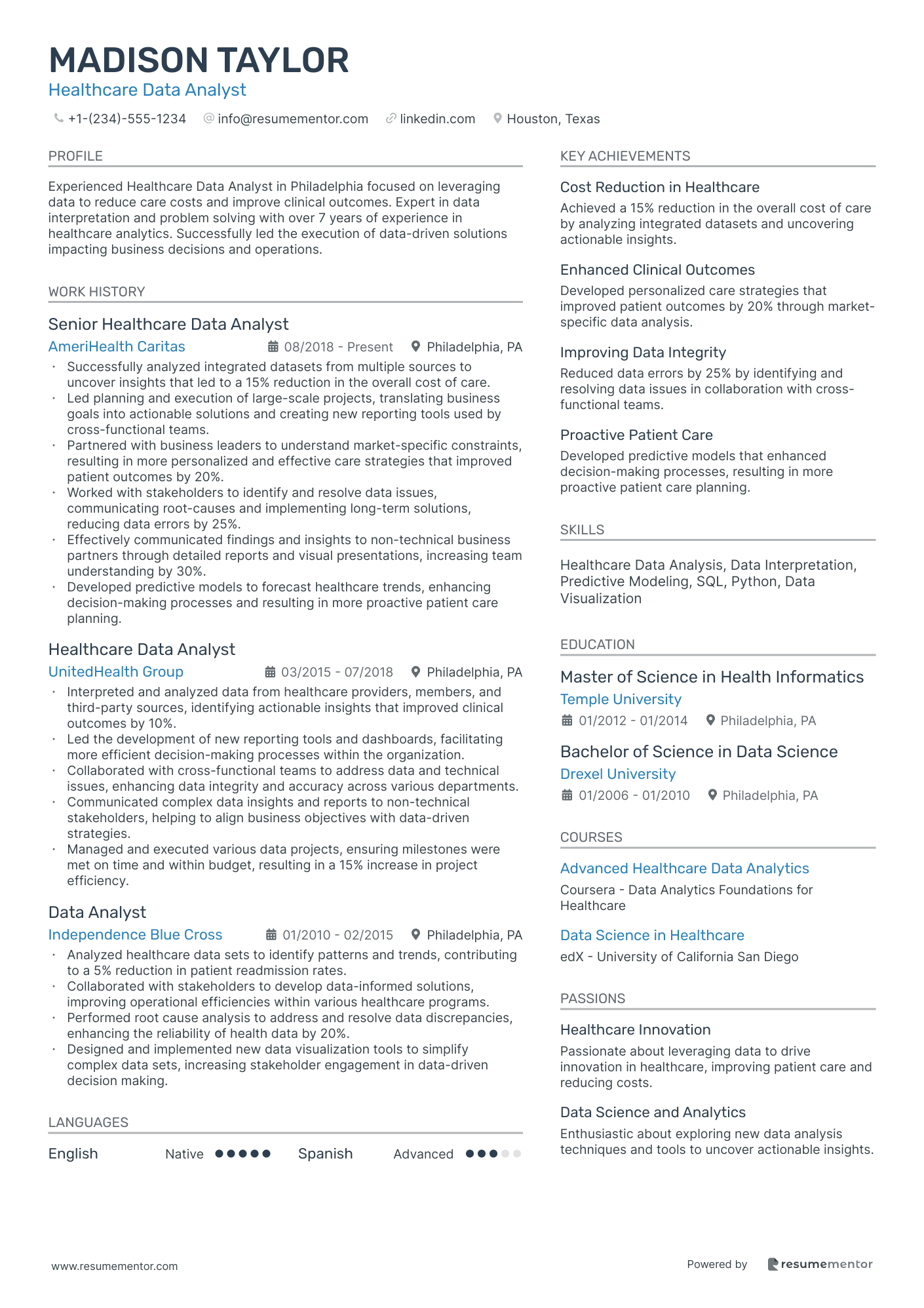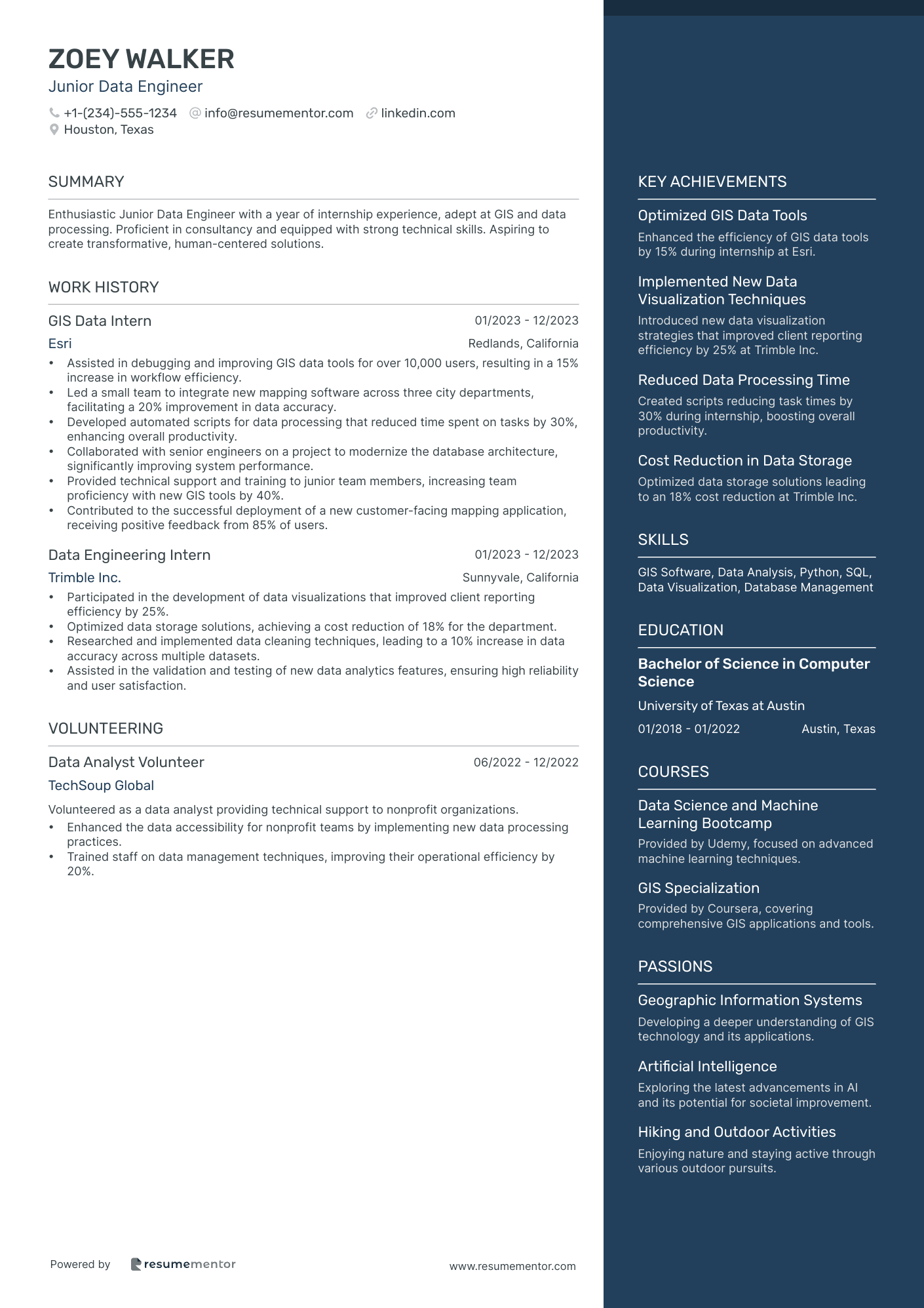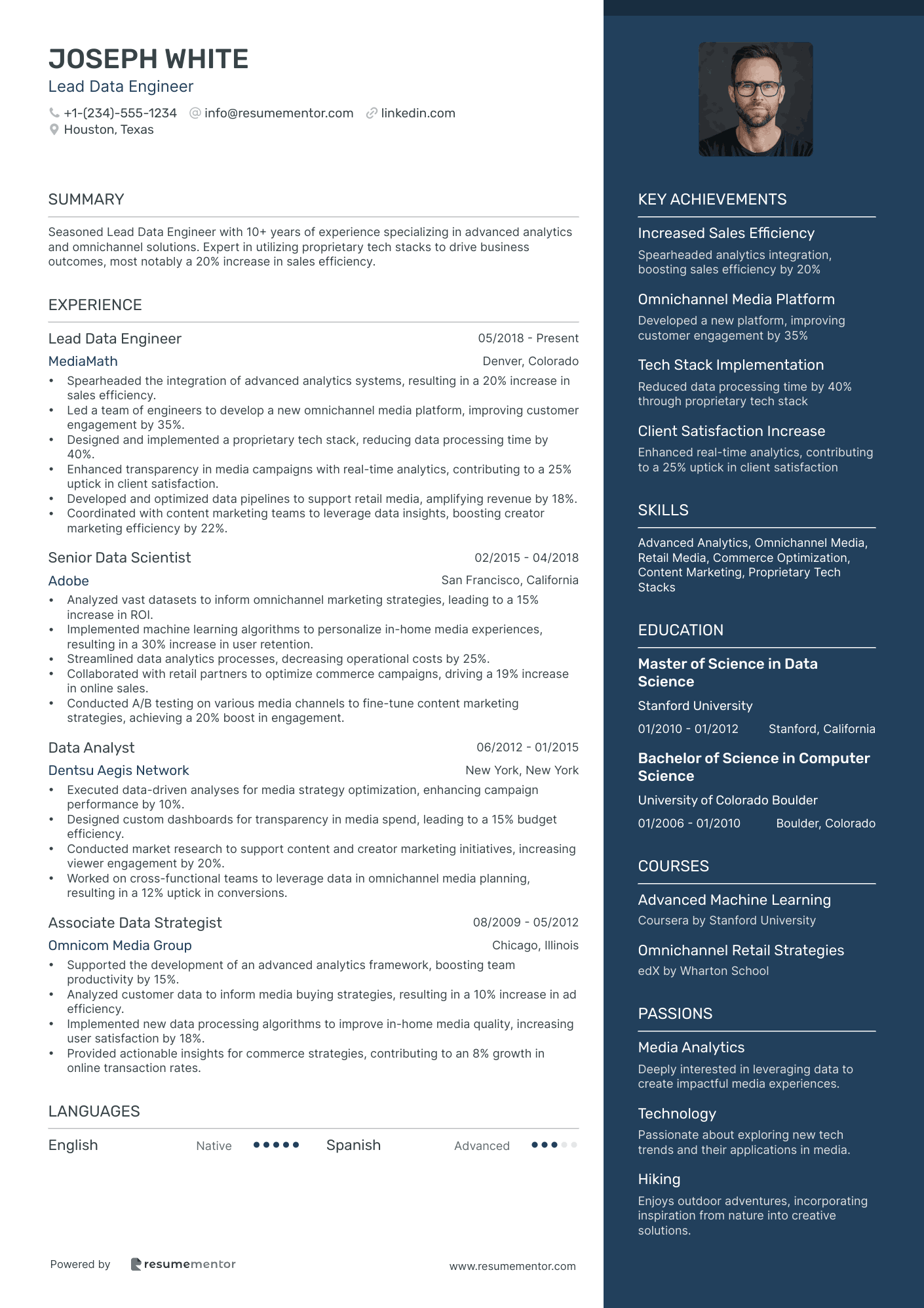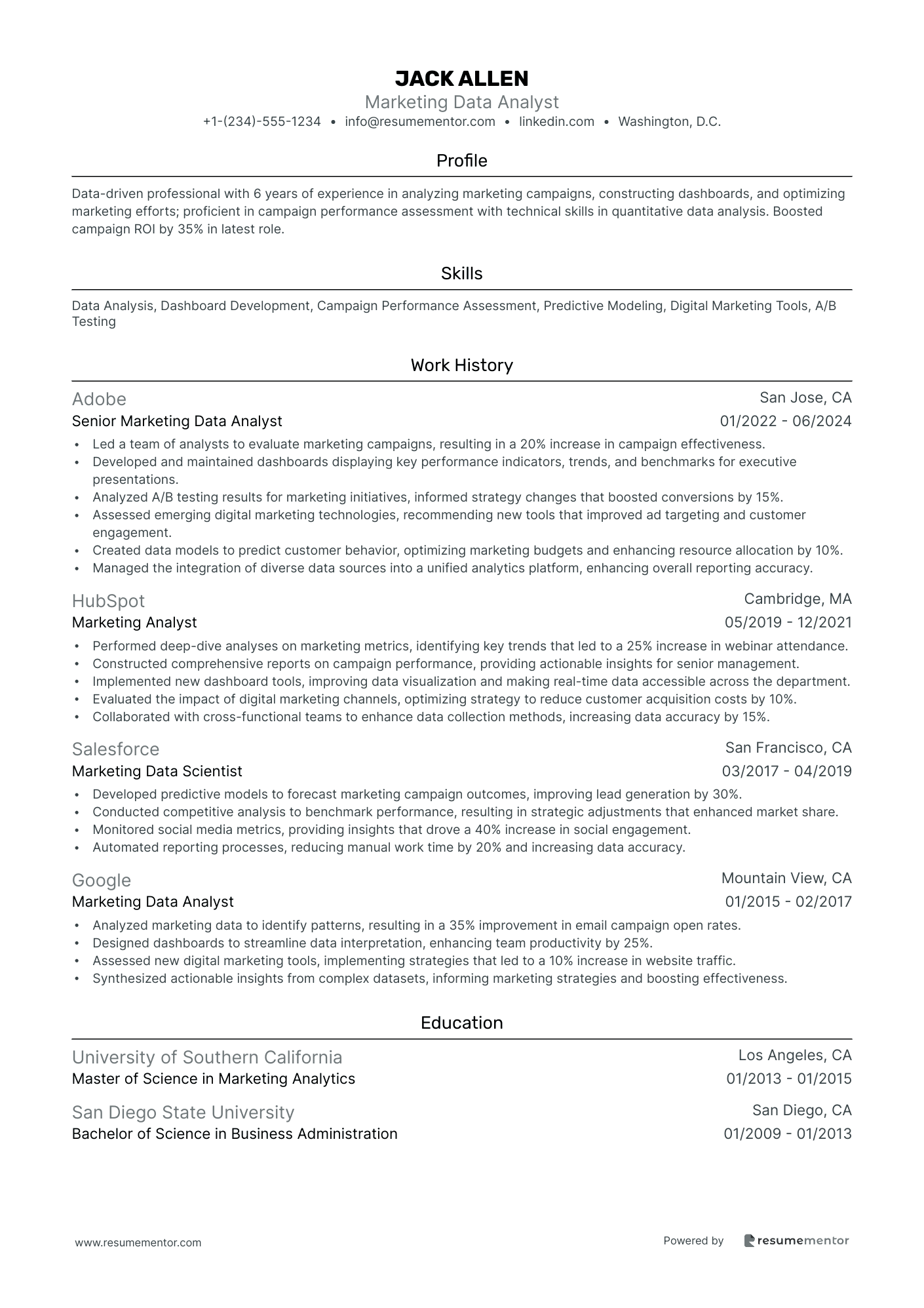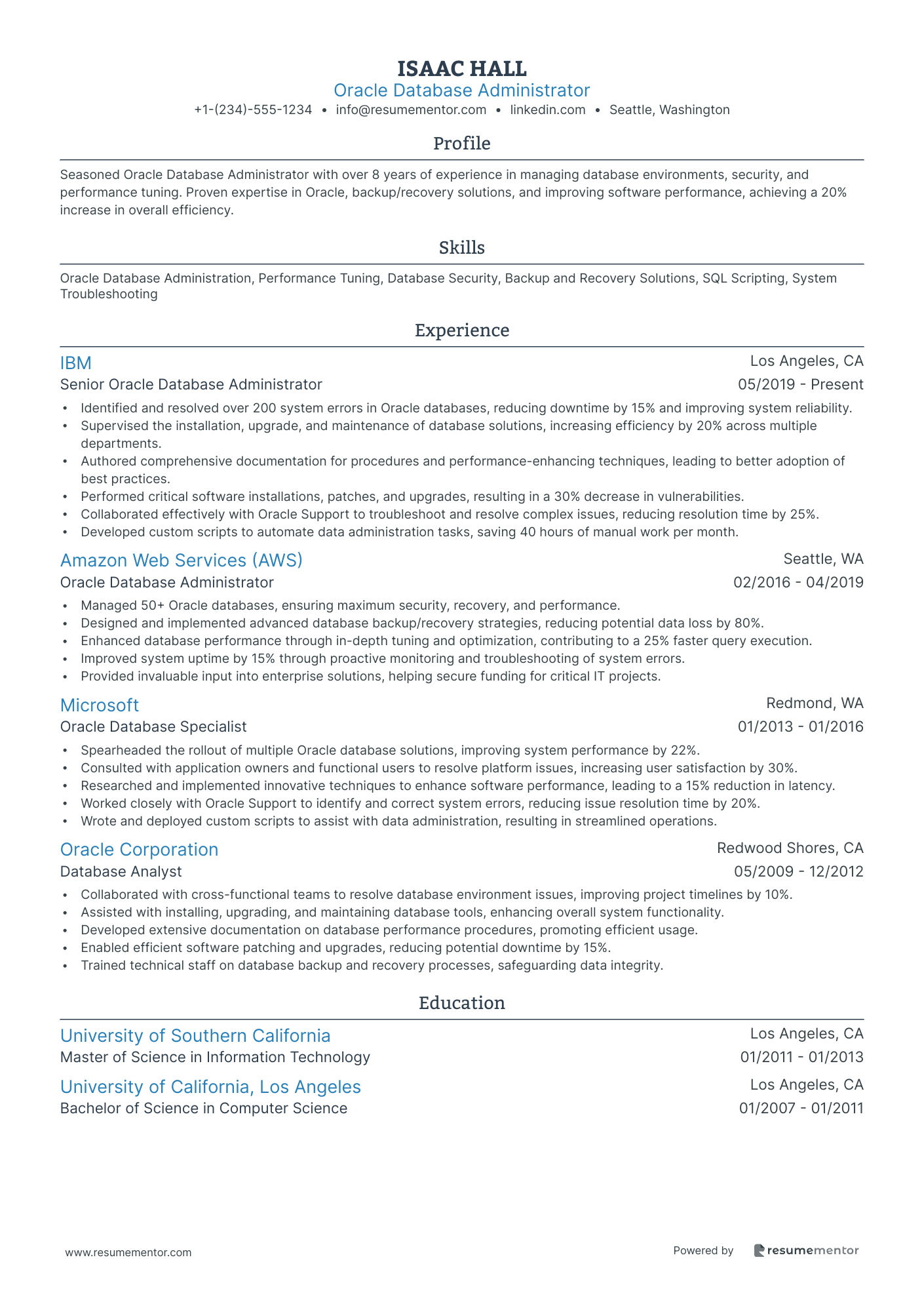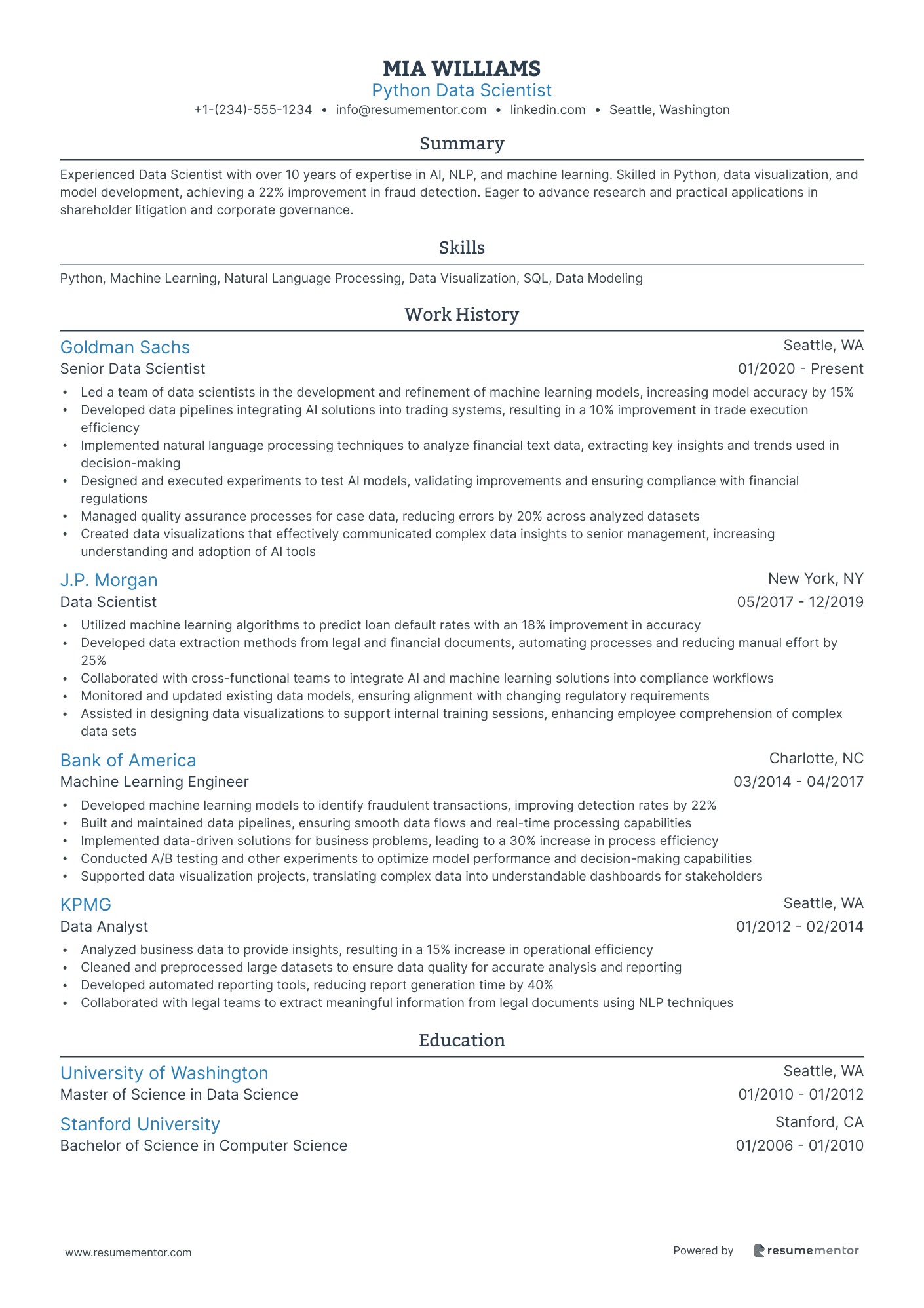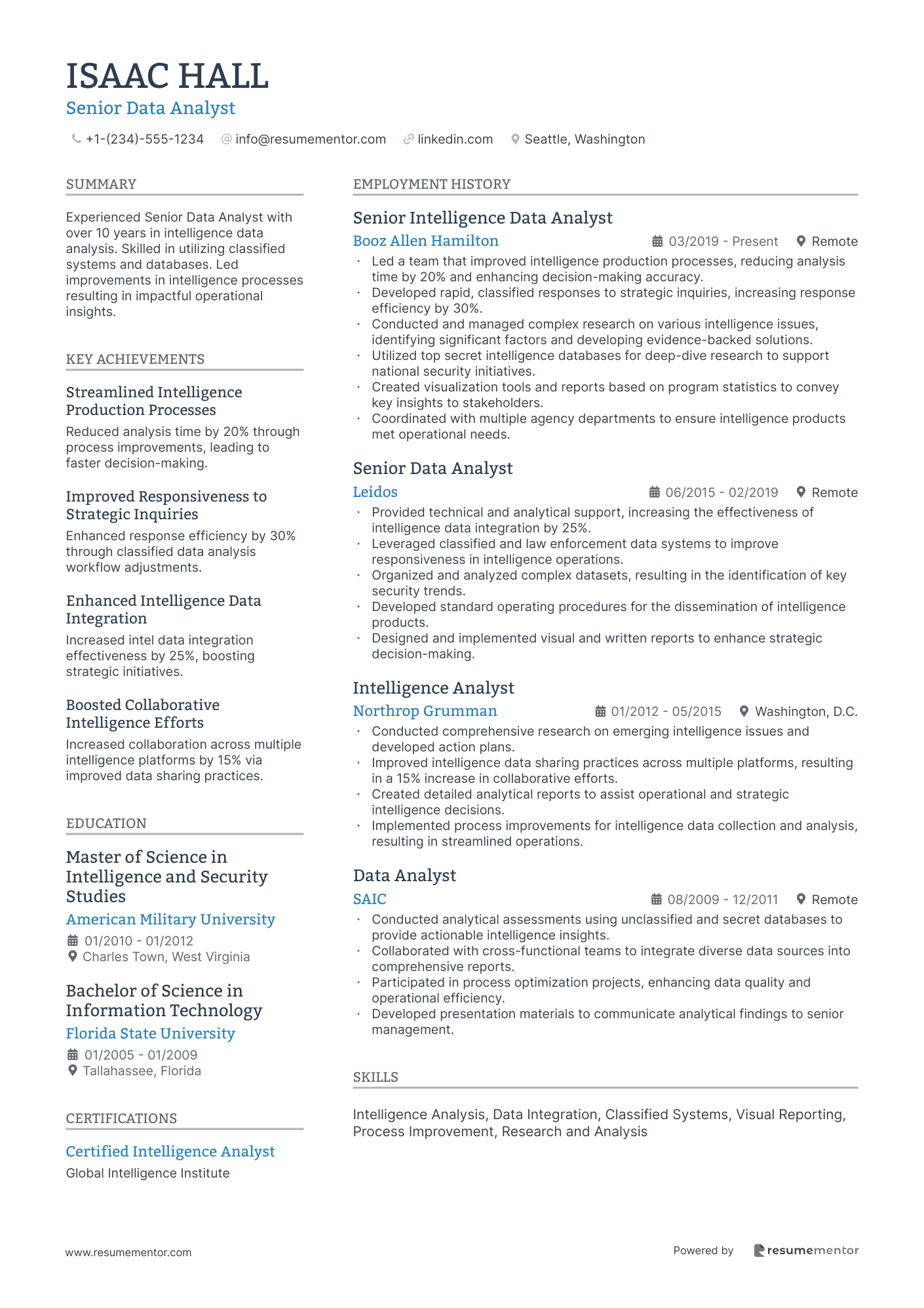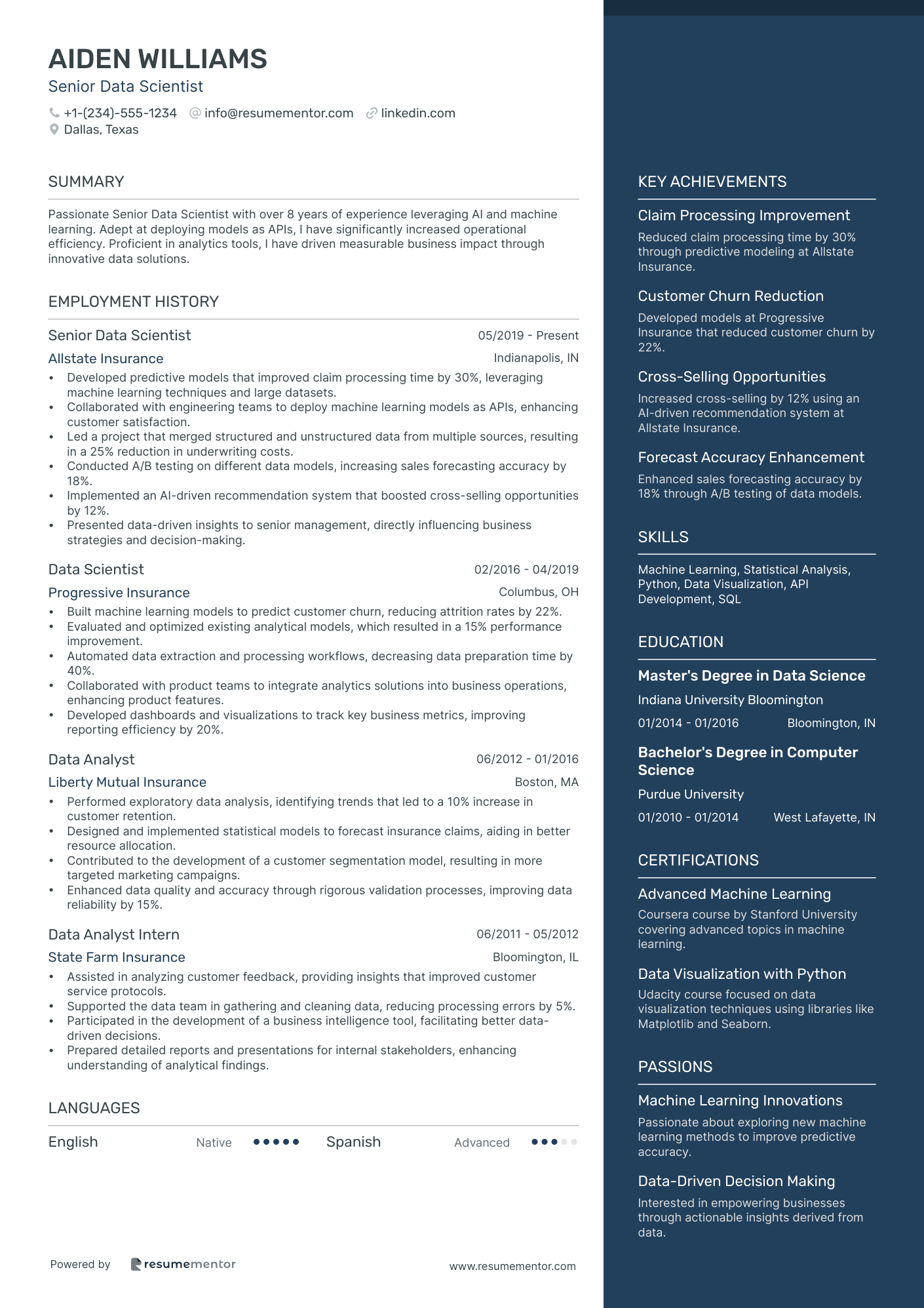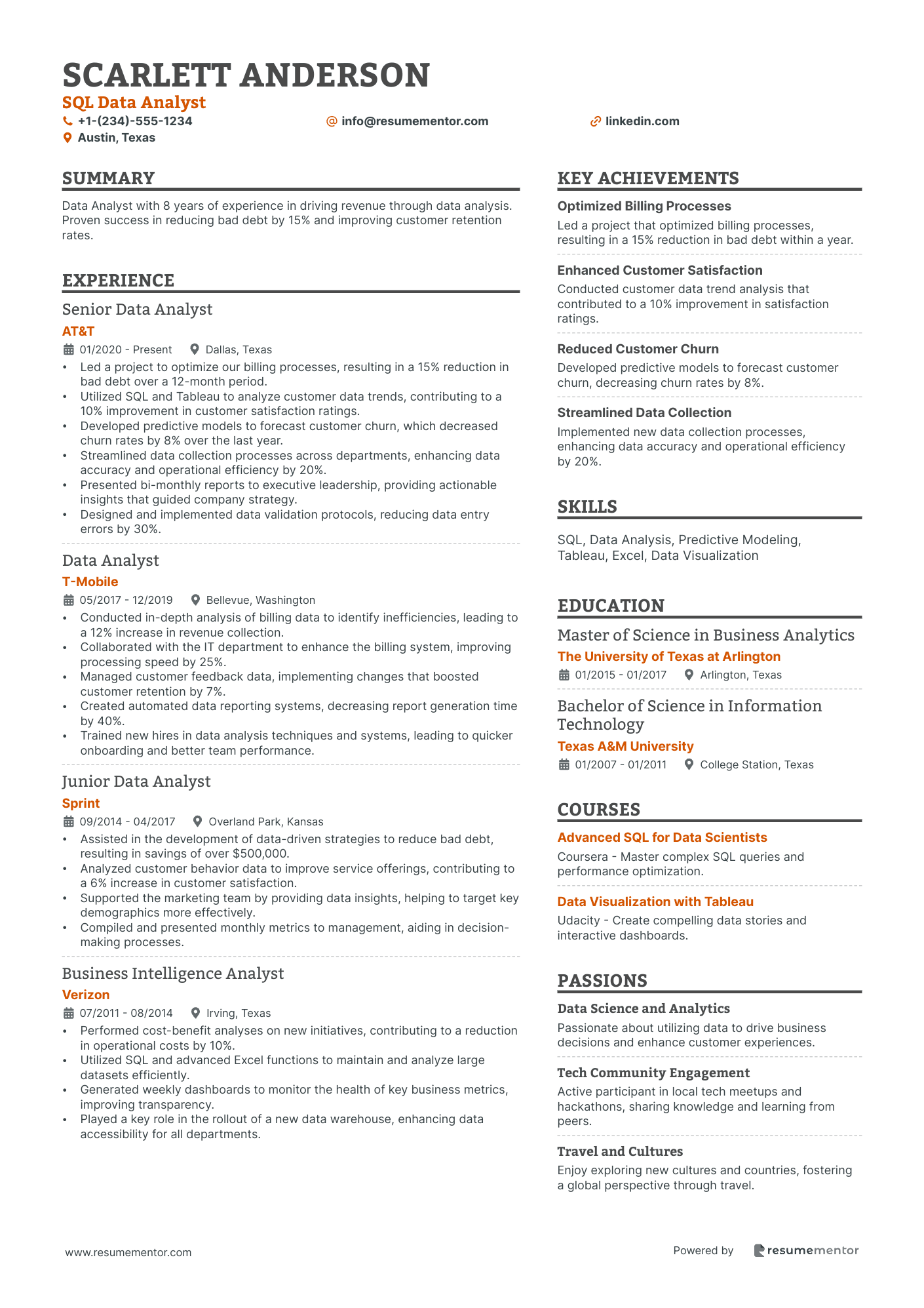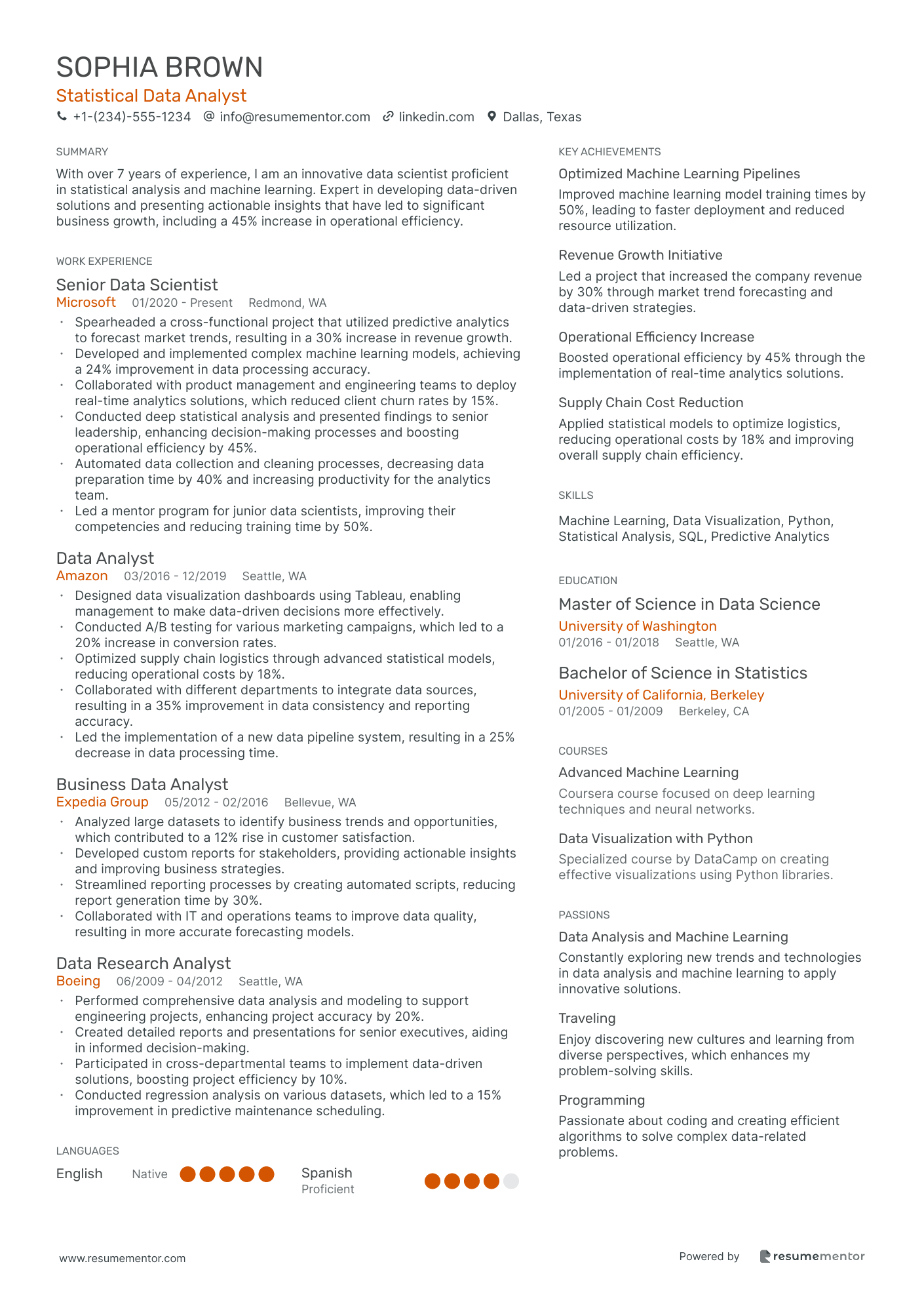43+ Data Science Resume Examples

Jul 18, 2024
|
12 min read
Crafting your data science resume: sharpen your skills to stand out in the job market and turn data into your dream career.
Rated by 348 people

Data Science Intern resume sample
- •Led a team of 4 students to analyze a large dataset of 100,000 customer records, resulting in actionable insights for a simulated business case.
- •Applied machine learning algorithms using Python to predict customer churn, improving the model’s accuracy by 15% within three iterations.
- •Developed data visualizations using Matplotlib and Seaborn that highlighted key trends and patterns, facilitating stakeholder presentations.
- •Conducted thorough data cleaning and preprocessing utilizing pandas, enhancing data quality and ensuring accurate analytics results.
- •Collaborated in an Agile environment, participating in sprint planning, daily stand-ups, and retrospectives to streamline project workflow.
- •Assisted in developing a predictive model to identify patients at high risk of hospital readmission, analyzing over 50,000 patient records.
- •Collaborated in a team of 3 to investigate healthcare data, resulting in a report showcasing a 20% reduction in readmission rates.
- •Implemented data cleansing techniques and feature engineering to enhance model precision, contributing to a 10% improvement in results.
- •Utilized cloud-based resources such as Snowflake for data storage and processing, improving data retrieval times by 30%.
- •Analyzed donation patterns to improve fundraising strategies, resulting in a 25% increase in donations over six months.
- •Developed dashboards and visualizations to help non-profits communicate data insights more effectively with stakeholders.
- •Performed statistical analysis on survey data to identify key areas for improvement in volunteer engagement programs.
Entry-Level Data Analyst resume sample
- •Conducted in-depth analyses of clinical data, improving the accuracy of patient records by 15% in a six-month period.
- •Developed and maintained complex databases for grant management, leading to a 10% increase in grant approval rates.
- •Generated customized operational reports used by 7 different departments, enhancing workflow efficiencies by 20%.
- •Collaborated with senior data analysts to improve EMR workflows, resulting in a 25% reduction in data entry errors.
- •Provided technical support for EMR software, resolving 50+ issues and boosting user satisfaction rates to 95%.
- •Compiled and presented monthly productivity reports to leadership, aiding in data-driven decision-making and strategy.
- •Assisted in the maintenance of medical information systems, ensuring data accuracy across multiple platforms.
- •Created detailed financial and productivity reports that were used to optimize departmental budgets by 12%.
- •Participated in qualitative and quantitative data analysis projects, enhancing the quality of grant funding requests.
- •Tested and documented new EMR functionalities, improving system reliability and user experience among clinical staff.
- •Created interactive dashboards to monitor food distribution patterns, improving efficiency by 10%.
- •Analyzed donation data to identify trends and create predictive models, aiding in resource allocation.
- •Collaborated with multiple departments to streamline data collection processes, resulting in more accurate reporting.
Junior Data Engineer resume sample
- •Assisted in debugging and improving GIS data tools for over 10,000 users, resulting in a 15% increase in workflow efficiency.
- •Led a small team to integrate new mapping software across three city departments, facilitating a 20% improvement in data accuracy.
- •Developed automated scripts for data processing that reduced time spent on tasks by 30%, enhancing overall productivity.
- •Collaborated with senior engineers on a project to modernize the database architecture, significantly improving system performance.
- •Provided technical support and training to junior team members, increasing team proficiency with new GIS tools by 40%.
- •Contributed to the successful deployment of a new customer-facing mapping application, receiving positive feedback from 85% of users.
- •Participated in the development of data visualizations that improved client reporting efficiency by 25%.
- •Optimized data storage solutions, achieving a cost reduction of 18% for the department.
- •Researched and implemented data cleaning techniques, leading to a 10% increase in data accuracy across multiple datasets.
- •Assisted in the validation and testing of new data analytics features, ensuring high reliability and user satisfaction.
- •Enhanced the data accessibility for nonprofit teams by implementing new data processing practices.
- •Trained staff on data management techniques, improving their operational efficiency by 20%.
Clinical Data Analyst resume sample
- •Led a team to develop and validate data architecture for Meaningful Use Stage 3, increasing compliance by 20% within 6 months.
- •Streamlined workflow processes, reducing data entry errors by 15% and improving report accuracy for regulatory submissions.
- •Collaborated with IT and clinical teams to assess the impact of system configurations on Meaningful Use, ensuring seamless integration and transition.
- •Managed large-scale data reporting projects, including data extraction and validation, resulting in a 30% reduction in reporting time.
- •Conducted regular audits of clinical data systems to maintain compliance, resulting in a 10% improvement in data integrity.
- •Facilitated training sessions for healthcare providers on data requirements, aiding in a 25% increase in user adoption.
- •Reviewed and optimized data structures in clinical systems, leading to a 40% increase in data accuracy for Meaningful Use reporting.
- •Developed comprehensive data validation protocols, enhancing the reliability of data submissions from multiple facilities.
- •Led the assessment of workflow changes, resulting in a 15% improvement in the efficiency of clinical operations.
- •Managed technical requirements and configurations to support attestation for Meaningful Use, ensuring all stages were met.
- •Coordinated with stakeholders to align data reporting practices with organizational quality initiatives, resulting in a 20% boost in performance metrics.
- •Implemented and maintained data reporting systems for eligible hospitals, achieving 95% compliance with regulatory standards.
- •Conducted system reviews and impact analyses for new configurations, ensuring minimal disruption to Meaningful Use reporting.
- •Improved data architecture and reporting tools, decreasing time to generate compliance reports by 20%.
- •Supported the development of audit history retention processes, resulting in a 100% success rate during external audits.
- •Designed and implemented data reporting frameworks, significantly reducing manual data entry errors by 30%.
- •Led projects aimed at improving data integrity and reporting accuracy, resulting in a 20% increase in compliance with Meaningful Use.
- •Trained and supported healthcare providers in understanding data requirements, leading to a 15% increase in timely data submissions.
- •Coordinated with cross-functional teams to address technical system requirements for regulatory reporting.
Analytics Engineer resume sample
- •Led financial KPI reporting and designed data models for financial forecasting, increasing accuracy by 20%.
- •Implemented automated data pipelines, reducing manual workloads by 35% through enhanced system integration.
- •Collaborated with finance and operations teams to streamline data processes, resulting in a 25% reduction in processing time.
- •Developed a single source of truth for key growth metrics, ensuring data integrity for cross-functional stakeholders.
- •Designed dashboards for executive teams, offering real-time insights into pricing, demand, billings, and collections.
- •Conducted in-depth churn analysis, identifying key drivers and reducing churn rates by 15%.
- •Analyzed data to optimize product lines, resulting in a 10% increase in customer retention.
- •Constructed data pipelines to handle complex datasets, improving data retrieval speed by 30%.
- •Collaborated with GTM teams to develop pricing strategies based on demand analytics, boosting revenue by 12%.
- •Created predictive models for billing and collections, improving accuracy of forecasts by 15%.
- •Presented insights to executive teams, driving strategic decisions that enhanced operational efficiency.
- •Designed and maintained dashboards for real-time monitoring of key performance indicators across multiple business functions.
- •Conducted detailed data analysis on fleet-related spend, uncovering cost-saving opportunities that amounted to $500,000 annually.
- •Automated reporting processes, reducing report generation time by 50% and improving data accessibility.
- •Built and validated predictive models for operational metrics, enhancing decision-making capabilities.
- •Compiled and analyzed logistics data to improve operational efficiency, resulting in a 15% increase in delivery performance.
- •Integrated various data sources, creating a unified data repository that enhanced data reliability and user access.
- •Supported finance team with ad-hoc analyses, improving the accuracy of financial forecasts by 10%.
- •Developed comprehensive financial and operational reports for senior management, facilitating data-driven decision-making.
AWS data engineer resume sample
- •Led a data migration project to AWS, reducing system downtime by 30%, and enhancing data retrieval speeds by 20%.
- •Coordinated a team of 8 data engineers to implement real-time data processing pipelines, resulting in a 50% increase in data processing efficiency.
- •Designed and developed ETL processes, improving data accuracy by 35% and ensuring seamless data integration across multiple platforms.
- •Implemented automated data quality checks, reducing data errors by 25%, and improving overall data reliability.
- •Created data visualization dashboards, enabling management to make data-driven decisions, which contributed to a 15% growth in quarterly revenue.
- •Managed cloud infrastructure and data security protocols, ensuring compliance with industry standards and reducing operating costs by 20%.
- •Developed a data analytics platform that supported predictive maintenance, reducing vehicle downtime by 40%.
- •Initiated the transition to a cloud-based data warehouse, resulting in a 30% decrease in data storage costs.
- •Optimized data flow processes which increased data reporting speed by 25%, greatly enhancing operational efficiency.
- •Collaborated with data scientists to implement machine learning models, improving customer segmentation accuracy by 45%.
- •Mentored junior data engineers, providing training sessions that improved team productivity by 35%.
- •Spearheaded the creation of KPI dashboards, resulting in a 20% improvement in decision-making efficiency at the executive level.
- •Developed SQL queries and scripts to automate reporting processes, saving 15 hours per week in manual labor.
- •Conducted data mining and analysis projects, leading to a 10% increase in customer retention through targeted marketing campaigns.
- •Collaborated with IT to integrate new data sources, enriching the company’s data assets by 25%.
- •Assisted in the creation of data reports, leading to a 15% improvement in operational efficiency.
- •Performed data cleaning and preprocessing, improving data quality by 20%.
- •Supported the BI team in developing dashboards that visualized key performance metrics, aiding in strategic decision-making.
- •Analyzed sales and financial data, resulting in insights that enhanced revenue forecasting accuracy by 10%.
Azure Data Engineer resume sample
- •Optimized ETL processes using Python, leading to a 25% increase in data processing efficiency and reduced operational costs.
- •Led a team of 5 data engineers in the design and deployment of a cloud-based data lake, supporting over 100TB of data.
- •Implemented a machine learning model that increased the accuracy of risk predictions by 15%, resulting in better decision-making for underwriting.
- •Conducted data quality assessments and improved data governance practices, reducing data inconsistencies by 20%.
- •Developed data pipelines using Azure Data Factory and Databricks, accelerating data ingestion by 30%.
- •Designed and implemented a real-time analytics platform that supported dynamic risk assessment for clients.
- •Collaborated with data scientists to integrate AI models into business processes, enhancing predictive analytics capabilities.
- •Streamlined database operations through advanced indexing and query optimization techniques, cutting query time by 40%.
- •Mentored junior engineers and conducted training sessions, boosting team productivity by 15%
- •Built robust big data solutions on Hadoop and Spark platforms, facilitating improved data processing for actuarial analysis.
- •Created custom data storage solutions, resulting in a 50% reduction in storage costs.
- •Developed a data security protocol in collaboration with IT, minimizing data breaches and improving compliance.
- •Integrated disparate data sources into a unified data warehouse, improving data accessibility across departments.
- •Analyzed large datasets to extract actionable insights, supporting strategic business decisions.
- •Developed automated reporting tools using Python, which reduced report generation time by 60%.
- •Collaborated with cross-functional teams to identify data needs and deliver comprehensive dashboards.
- •Improved data accuracy by 20% by developing rigorous data validation processes.
Big Data Engineer resume sample
- •Led the development and implementation of real-time data analytics solutions, reducing data processing time by 50%.
- •Managed a team of 5 data engineers, fostering collaboration that resulted in the successful launch of 4 major projects.
- •Designed and executed an ETL process that improved data accuracy and consistency, enhancing decision-making capabilities.
- •Conducted in-depth data analysis to identify trends and patterns, providing actionable insights that drove a 15% increase in revenue.
- •Implemented machine learning algorithms to automate data categorization, saving 200 hours of manual work annually.
- •Collaborated with cross-functional teams to integrate data solutions, ensuring a streamlined workflow and improved data governance.
- •Architected and maintained big data infrastructure to support large-scale data analysis, increasing query performance by 60%.
- •Developed and optimized data pipelines using Hadoop and Spark, reducing processing times by 25%.
- •Partnered with analytics teams to design data models that supported predictive analytics, driving a 12% increase in sales.
- •Implemented data security protocols, ensuring compliance with industry standards and reducing data breaches by 40%.
- •Provided technical guidance and training to junior engineers, enhancing team skill sets and productivity.
- •Developed data integration processes, consolidating data from multiple sources and improving data reliability by 30%.
- •Designed and built data warehouses, enabling efficient storage and retrieval of large datasets for complex queries.
- •Conducted performance tuning of SQL queries, achieving a 20% reduction in database load times.
- •Collaborated with business stakeholders to understand requirements and deliver solutions that aligned with business goals.
- •Conducted regular data quality assessments, identifying and resolving issues that improved data integrity by 15%.
- •Managed database systems, ensuring high availability and reliability for critical business applications.
- •Performed regular database maintenance, including backups, indexing, and performance optimization.
- •Monitored database performance and resolved issues proactively, reducing downtime by 18%.
- •Developed and implemented data migration strategies, ensuring smooth transitions with minimal disruption.
Data Analyst resume sample
- •Led a team of 5 data analysts to develop robust reporting tools, enhancing operational efficiency by 20% across multiple departments.
- •Conducted in-depth statistical analysis on patient data, leading to a 10% improvement in patient care quality metrics.
- •Developed and implemented machine learning models that predicted patient readmission rates with 85% accuracy.
- •Collaborated with cross-functional teams to create comprehensive dashboards that provided actionable insights, resulting in a 15% increase in decision-making speed.
- •Designed data collection and preprocessing pipelines that reduced data handling time by 30%.
- •Spearheaded a project to automate monthly reporting, saving approximately 100 man-hours per month.
- •Managed data science projects focused on cancer research, contributing to numerous publications and grant proposals.
- •Developed predictive models for disease progression that improved early detection by 25%, resulting in better patient outcomes.
- •Collaborated with biostatisticians to design and interpret experiments, leading to the discovery of key biomarkers.
- •Implemented data visualization techniques to communicate complex analysis results to non-technical stakeholders.
- •Optimized data storage solutions, reducing storage costs by 15% while maintaining data integrity.
- •Analyzed clinical data to find trends and insights that led to a 12% improvement in treatment protocols.
- •Developed and maintained databases to support clinical research, ensuring data accuracy and consistency.
- •Collaborated with IT and clinical staff to streamline data collection processes, resulting in a 20% reduction in data entry errors.
- •Created detailed reports and presentations that facilitated data-driven decision-making among hospital administrators.
- •Conducted data analysis for various departments, identifying key performance indicators that needed improvement.
- •Developed automated scripts to collect and preprocess data from multiple sources, ensuring data quality and integrity.
- •Collaborated with healthcare professionals to design studies that measured the effectiveness of new treatments.
- •Created informative visualizations that helped stakeholders understand complex data trends and patterns.
Data Analytics Manager resume sample
- •Led a team in analyzing ride-share data to improve route efficiency, resulting in an 18% reduction in average wait times.
- •Developed and implemented dashboards that provided real-time insights to operational staff, enhancing decision-making processes by 35%.
- •Collaborated closely with safety teams to analyze incident data, reducing safety-related incidents by 12% through targeted interventions.
- •Built predictive models that identified potential safety violations, leading to a 22% decrease in customer complaints.
- •Streamlined data collection processes across multiple sources, improving data accuracy and reliability by 25%.
- •Presented findings to senior leadership, informing strategic decisions that improved overall service performance.
- •Advised on the integration of advanced analytics tools, which improved data processing speeds by 40%.
- •Conducted deep-dive analyses into driver performance, leading to a 15% increase in top-performing drivers through tailored coaching.
- •Identified key safety metrics and developed reporting frameworks that enhanced the company's ability to monitor and improve driver safety.
- •Worked on cross-functional teams to address service disruption issues, resulting in a 10% improvement in ride completion rates.
- •Implemented a series of data integrity checks that reduced data errors by 20% across reporting systems.
- •Analyzed operational data to optimize network performance, reducing outages by 8% through proactive maintenance.
- •Prepared comprehensive reports on service anomalies and coordinated with technical teams to address underlying issues.
- •Monitored customer service platforms, leading to a 16% improvement in customer satisfaction through data-driven service adjustments.
- •Developed documentation and training materials that improved data handling practices across the organization.
- •Gathered and analyzed data to support safety and operational decision-making, resulting in a 10% improvement in process efficiency.
- •Worked with software development teams to enhance analytical tools, improving functionality and user experience for end-users.
- •Conducted research and analysis on customer complaints, developing actionable insights that led to a 12% reduction in repeat issues.
- •Partnered with team leads to identify and implement performance improvements based on data findings.
Data Architect resume sample
- •Led a team of 10 in the migration of on-premise data to cloud platforms, reducing total costs by 40% over a period of 6 months.
- •Developed data integration protocols, which improved system performance by 30% and streamlined access to critical data.
- •Collaborated with cross-functional teams to design and implement data solutions, leading to a 25% increase in reporting efficiency.
- •Created and maintained database architecture documentation ensuring compliance with industry standards, resulting in a flawless compliance audit.
- •Guided the deployment and optimization of data warehouses, reducing data retrieval times by 50%.
- •Conducted workshops for in-house teams and clients on new data technologies, enhancing team capabilities and fostering a culture of continuous learning.
- •Designed and implemented data architectures that improved system scalability and reduced data storage costs by 20%.
- •Led initiatives to enhance data security measures, resulting in a 15% reduction in security breach incidents.
- •Developed modular data models that supported various business units, increasing data accessibility by 30%.
- •Automated routine data processing tasks, freeing up 500+ man-hours annually for more strategic activities.
- •Guided cross-department workshops and training programs to improve data handling and processing capabilities across the organization.
- •Managed and optimized multiple databases, achieving an overall performance improvement of 25% in data retrieval times.
- •Developed disaster recovery plans and implemented backup systems, resulting in zero data loss incidents over three years.
- •Conducted routine maintenance and updates, ensuring compliance with security protocols and reducing vulnerabilities by 35%.
- •Collaborated with application developers to optimize database interactions, improving application efficiency by 20%.
- •Conducted system analyses and provided recommendations, leading to a 15% increase in system efficiency.
- •Identified and resolved system bugs, reducing system downtime by 25% and enhancing user experience.
- •Developed and presented technical reports to stakeholders, resulting in informed decision-making and strategic planning.
- •Collaborated with software developers to design and implement new features, improving overall system functionality by 20%.
Data Center Engineer resume sample
- •Successfully executed 30+ hardware installations and configurations, enhancing operational efficiency by 20%.
- •Led a team to improve space planning and cabinet layouts, resulting in a 30% increase in space utilization.
- •Implemented new media management practices, reducing data handling errors by 15%.
- •Proactively maintained and monitored data center infrastructure, decreasing downtime by 25%.
- •Managed lifecycle maintenance of server hardware, ensuring compliance with all corporate protocols and policies.
- •Collaborated with internal teams to prioritize and complete small to mid-size project tasks, achieving a 95% on-time delivery rate.
- •Performed hardware repairs and optimizations, enhancing system performance by 15%.
- •Managed cabling and power solutions, improving reliability and reducing outages by 20%.
- •Ensured precise space planning and cabinet layouts, accommodating 10% more equipment within the same footprint.
- •Handled the installation and decommissioning of servers, reducing installation time by 25%.
- •Maintained detailed documentation of hardware configurations and changes, facilitating enhanced communication with cross-functional teams.
- •Oversaw day-to-day operation of the data center, reducing incident response time by 30%.
- •Collaborated on the implementation of monitoring tools, increasing system visibility by 25%.
- •Conducted hardware and software troubleshooting, achieving a 95% resolution rate on first attempt.
- •Trained new staff on data center protocols and procedures, enhancing team efficiency and cohesion.
- •Assisted in the setup and maintenance of data center infrastructure, contributing to a 10% reduction in operational costs.
- •Monitored environmental conditions, ensuring optimal performance and longevity of server equipment.
- •Supported network infrastructure projects, enhancing overall system integrity and performance.
- •Resolved issues related to power and cooling systems, maintaining a 99% uptime for critical services.
Data Center Technician resume sample
- •Maintained overall availability and reliability of over 500 servers, ensuring 99.99% uptime.
- •Conducted detailed hardware and network diagnostics, resolving critical issues within 24 hours.
- •Developed and implemented scripts to automate server updates, reducing manual workload by 70%.
- •Trained 15 internal team members in advanced data center operations, improving team efficiency by 40%.
- •Managed inventory, tracking over 1,000 pieces of hardware, which reduced loss and misallocation by 25%.
- •Led documentation projects, creating comprehensive manuals that were referenced daily by 50+ team members.
- •Ensured the reliability and availability of data center operations across multiple locations, resulting in a 15% performance increase.
- •Conducted root cause analysis for both hardware and software issues, minimizing system downtime by 20%.
- •Trained new team members on data center procedures and best practices, contributing to a 30% decrease in trial and error incidents.
- •Developed scripts for server and network equipment updates, cutting update times by half.
- •Performed maintenance and diagnostic checks on test and tools equipment, enhancing equipment lifespan by 10%.
- •Addressed hardware failures and conducted repairs, restoring 95% of systems to full functionality within 48 hours.
- •Managed on-call support and responded to emergencies, achieving a 5-minute average response time.
- •Assembled and installed new server racks, improving data center capacity by 20%.
- •Authored technical support documents that improved troubleshooting processes for the support team.
- •Conducted network diagnostics and maintenance, resulting in a 30% reduction in network downtime.
- •Collaborated with cross-functional teams to integrate new hardware, enhancing system performance by 25%.
- •Maintained inventory of network hardware, cutting delivery times for new components by 20%.
- •Provided on-site technical support across multiple data centers, ensuring consistent operations.
Data Engineer resume sample
- •Built and maintained ETL pipelines, resulting in a 30% improvement in data processing speed, enhancing the quality and timeliness of data insights for cross-functional teams.
- •Designed and implemented robust data testing frameworks leading to a 25% reduction in data errors, driving more accurate decision-making processes.
- •Managed and optimized databases, reducing data warehouse costs by 20% while maintaining peak performance during high-volume data loads.
- •Developed and supported dashboards and analytics reports, increasing operational efficiency and stakeholder satisfaction by 40%.
- •Participated in code reviews, improving code quality and ensuring adherence to best practices, resulting in more maintainable and scalable data solutions.
- •Collaborated with various departments to provide customized data solutions, significantly enhancing internal operations and external partnerships.
- •Developed and maintained data models and ETL processes, optimizing data processing times by 35% and supporting the company's data-driven strategies.
- •Created interactive Tableau dashboards, improving data accessibility and user experience for over 50 internal users.
- •Executed rigorous data testing and validation protocols, reducing report discrepancies by 20% and ensuring data reliability.
- •Collaborated with the data science team to integrate machine learning models into data pipelines, enhancing predictive analytics capabilities.
- •Monitored and fine-tuned BI tools, ensuring robust performance and availability, which improved business continuity and data use compliance.
- •Performed detailed data analysis and generated reports, assisting in strategic decision-making and achieving a 15% increase in operational efficiency.
- •Automated data extraction and reporting processes, saving 25 hours of manual work per month and increasing productivity.
- •Collaborated with business units to gather data requirements, delivering tailored data solutions that enhanced business insights.
- •Developed and presented data findings to executive stakeholders, resulting in greater data transparency and actionable business strategies.
- •Managed and maintained database systems, improving data availability and consistency across various applications.
- •Optimized SQL queries and database performance, reducing processing times by 40%, which led to faster and more reliable data retrieval.
- •Implemented database security protocols, safeguarding sensitive information and ensuring compliance with industry standards.
- •Provided technical support and troubleshooting for database systems, minimizing downtime and ensuring continuous operations.
Data Entry Analyst resume sample
- •Reviewed and resolved anomalies in field air monitoring data, improving data accuracy by 15%.
- •Generated detailed non-conformance reports, resulting in a 20% reduction in recurring data quality issues.
- •Supervised and ensured timely independent QA review of processed data, resulting in 100% compliance with project deadlines.
- •Led a training program for junior staff on data management and reporting procedures, enhancing team efficiency by 10%.
- •Collaborated with stakeholders to ensure data reports conformed to regulatory requirements, increasing client satisfaction by 12%.
- •Created and updated standard operating procedures for data management and reporting, reducing process discrepancies by 8%.
- •Conducted QC-review of raw field data from continuous air monitoring equipment, reducing data errors by 10%.
- •Investigated and resolved data anomalies, enhancing data reliability by 15%.
- •Maintained timely communication with project managers on QA/QC results, streamlining project workflows by 5%.
- •Archived paper and electronic QA/QC documentation, ensuring accessible and secure data storage.
- •Published comprehensive data reports, leading to a 20% improvement in project reporting accuracy.
- •Processed and validated air monitoring data using Excel Macros, improving processing efficiency by 18%.
- •Performed technical review of draft and final data reports, achieving a 99% accuracy rate in calculations and conclusions.
- •Trained new hires on data entry and QC procedures, reducing onboarding time by 25%.
- •Ensured data compliance with project-specific monitoring plans and regulatory standards.
- •Contributed ideas for data management improvements, resulting in enhanced team productivity.
- •Performed accurate data entry from hand-written field sheets, maintaining a 98% accuracy rate.
- •Archived field and laboratory analytical data reports, ensuring efficient data retrieval processes.
- •Communicated effectively with field staff and labs to clarify data discrepancies.
- •Assisted in the development of templates for data management and reporting, improving consistency.
Data Entry Clerk resume sample
- •Led a team to organize and digitize warehouse documentation, increasing data accuracy by 40%.
- •Developed automated Excel macros to streamline data entry, resulting in a 35% increase in efficiency.
- •Coordinated with the IT department to troubleshoot and resolve data input errors, enhancing overall workflow.
- •Updated and maintained shipment logs and databases, improving records management by 30%.
- •Trained 15 new hires on data entry procedures and software, improving onboarding efficiency by 50%.
- •Managed inventory tracking systems, reducing discrepancies by 25% through biometric verification methods.
- •Managed customer databases with high accuracy, contributing to a 20% increase in customer satisfaction.
- •Implemented workflow improvements, cutting data entry time by 15%.
- •Prepared detailed reports summarizing shipping data, aiding in managerial decision-making.
- •Handled incoming calls and directed them to appropriate departments, enhancing client communication.
- •Assisted in the development of a new file management system, which improved data retrieval speed by 25%.
- •Coordinated office supply orders, maintaining optimal inventory levels and minimizing waste.
- •Prepared and dispatched invoices, reducing billing cycle times by 10%.
- •Scheduled meetings and travel arrangements for senior management, improving scheduling efficiency by 15%.
- •Took detailed meeting notes for distribution, ensuring accurate information dissemination.
- •Maintained confidentiality of sensitive documents, enhancing security protocols.
- •Handled customer inquiries and complaints, maintaining a customer satisfaction rate of 95%.
- •Updated and managed customer files, improving data accuracy and retrieval by 20%.
- •Processed product returns and exchanges efficiently, ensuring customer loyalty.
- •Conducted market research and compiled competitive analysis reports, aiding strategic planning.
Data Entry Operator resume sample
- •Ensured accurate loading and operation of machines, resulting in a 10% increase in production output.
- •Processed paperwork with 99% accuracy, reducing clerical errors and improving operational efficiency.
- •Maintained equipment and performed regular inspections, preventing machine downtime by 15%.
- •Collaborated with quality control teams to ensure product standards, leading to a 7% reduction in defects.
- •Oversaw high-volume workloads and met daily quotas, contributing to the company's top-rated service.
- •Entered data with a 97% accuracy rate, which resulted in streamlined processing and enhanced productivity.
- •Managed large case loads without errors by utilizing advanced data entry techniques.
- •Trained new hires on data entry standards, improving team performance by 20%.
- •Handled sensitive information securely, maintaining confidentiality and improving data protection processes.
- •Developed automated data entry solutions, leading to a 15% decrease in manual entry time.
- •Managed the operation of paper loading machines, enhancing production line efficiency by 12%.
- •Executed quality checks on products, reducing waste and increasing customer satisfaction.
- •Adapted to rapid changes in volume, consistently meeting production deadlines.
- •Coordinated with maintenance teams to minimize machine downtime, maintaining continuous production flow.
- •Operated and monitored machinery, achieving a daily output goal of 500 units.
- •Identified and resolved operational issues quickly, improving machine uptime by 10%.
- •Conducted routine maintenance and safety checks, ensuring compliance with industry standards.
- •Provided support in workflow optimization, resulting in a 5% increase in overall efficiency.
Data Managerment Analyst resume sample
- •Managed and optimized data systems and workflows, increasing operational efficiency by 30% over two years.
- •Analyzed and reported key performance metrics; these data reports supported fundraising efforts, resulting in a 20% increase in donations.
- •Collaborated with technical and non-technical teams to ensure stakeholder needs were met and data was accurately communicated and utilized.
- •Served as HMIS Administrator, ensuring compliance and data reporting accuracy for government agencies, improving reporting accuracy by 15%.
- •Implemented new data management software, leading training sessions for staff, which decreased data entry errors by 25%.
- •Developed a robust system for tracking program outcomes, resulting in more detailed and actionable reports for grant applications.
- •Conducted in-depth data analysis to support project management and strategic initiatives, leading to a 15% increase in project efficiency.
- •Spearheaded the development of dashboards for real-time data visualization, which enhanced decision-making processes.
- •Coordinated with cross-functional teams to develop and maintain data integrity protocols, reducing data discrepancies by 10%.
- •Oversaw data collection and reporting for grant proposals, directly contributing to $1.2M in grant awards over three years.
- •Provided comprehensive training on data analysis tools and methodologies to a team of 50 staff members, improving overall data competency.
- •Collected, analyzed, and interpreted extensive datasets to inform public health interventions, leading to a 10% improvement in service delivery.
- •Created detailed reports and presentations to communicate data findings to stakeholders, facilitating better understanding and engagement.
- •Managed the shelter's database, ensuring data accuracy and integrity for program evaluation and reporting purposes.
- •Assisted in the development of program metrics and benchmarks, contributing to a successful increase in funding by 15%.
- •Supported senior analysts in collecting and organizing data, contributing to research projects focused on domestic violence prevention.
- •Developed and maintained databases, ensuring data was readily accessible and usable for various departments.
- •Generated monthly and quarterly reports that provided insights into program effectiveness, aiding in strategic planning.
- •Collaborated with team members to ensure data compliance with state and federal regulations, maintaining a 98% compliance rate.
Data Manager resume sample
- •Directed data management initiatives, resulting in a 20% increase in data accuracy across all departments.
- •Led cross-functional teams to streamline data processes, cutting retrieval times by 30%.
- •Implemented advanced data quality controls, resulting in a 25% decrease in discrepancies.
- •Managed the execution of enterprise data management standards, enhancing overall data security.
- •Collaborated with business stakeholders to ensure data availability for appropriate consumers.
- •Developed a comprehensive data governance framework improving regulatory compliance by 15%.
- •Oversaw data management activities, resulting in the successful migration of over 50TB of financial data.
- •Worked closely with technology teams to enhance data integration by 20%.
- •Supervised the development of data quality metrics, leading to a 35% increase in data reliability.
- •Coordinated with stakeholders to understand and fulfill data requirements, improving customer satisfaction by 12%.
- •Streamlined data reporting processes, enabling faster decision-making and reducing reporting time by 25%.
- •Managed a team of data analysts, improving team productivity by 40%.
- •Developed new data models that enhanced analytical capabilities, increasing actionable insights by 30%.
- •Collaborated with other departments to implement data solutions that improved operational efficiencies by 15%.
- •Ensured data accuracy and compliance with industry regulations, leading to a flawless compliance audit.
- •Analyzed large datasets, providing insights that contributed to a 10% increase in revenue.
- •Assisted in the development of data management policies, enhancing overall data integrity.
- •Instrumental in the migration of legacy data systems, ensuring seamless data continuity.
- •Performed data quality assessments, identifying and resolving inconsistencies to improve data reliability.
Data Miner resume sample
- •Led a team in analyzing patient data to streamline operations, reducing unnecessary testing by 25%.
- •Developed predictive models to identify high-risk patients, improving early intervention strategies by 18%.
- •Collaborated with clinical teams to translate data insights into actionable treatment plans, resulting in a 22% increase in patient recovery rates.
- •Utilized advanced machine learning algorithms to enhance diagnostic accuracy, cutting down false positives by 15%.
- •Designed and implemented data aggregation tools that reduced processing time by 35%, boosting overall efficiency.
- •Initiated data-driven research projects leading to two publications in top-tier medical journals.
- •Analyzed vast datasets to generate meaningful clinical insights, enhancing patient treatment protocols.
- •Developed data visualization tools that aided in better decision-making processes for healthcare providers.
- •Optimized SQL databases, leading to a 40% increase in data retrieval efficiency.
- •Collaborated with developers to create a cloud-based platform for data storage and analytics.
- •Conducted workshops and training sessions to upskill team members in advanced data analysis techniques.
- •Participated in cancer research projects, leveraging data mining techniques to uncover new treatment pathways.
- •Developed statistical models to predict patient outcomes, increasing accuracy by 20%.
- •Published research findings in peer-reviewed journals, advancing the field of oncology.
- •Collaborated with multidisciplinary teams to ensure data integrity and consistency across studies.
- •Analyzed patient data to identify trends and improve healthcare quality.
- •Developed dashboards and reports to facilitate data-driven decision-making for hospital management.
- •Collaborated with IT teams to integrate new data software, enhancing data processing speed by 25%.
- •Conducted data audits to ensure adherence to healthcare regulations and standards.
Data Reporting Analyst resume sample
- •Led a data analytics team to streamline data collection processes, resulting in a 30% increase in efficiency and a 25% reduction in errors.
- •Developed custom data reporting solutions for disaster recovery projects that enhanced real-time decision making and improved response times by 18%.
- •Collaborated with various stakeholders to ensure data accuracy and integrity, resulting in improved grant management and compliance by 15%.
- •Conducted data analysis for statewide post-disaster projects using SQL and Python, providing actionable insights that led to a 20% better resource allocation.
- •Analyzed post-disaster housing needs and trends to support strategic planning, which resulted in a robust approach benefiting over 1,500 affected families.
- •Performed data visualization for disaster impact reports, increasing stakeholder engagement and understanding by 35%.
- •Created comprehensive data reports for housing reconstruction projects, facilitating better management and execution of 120+ projects.
- •Enabled real-time tracking and analysis of rehabilitation projects, significantly improving project completion rate by 22%.
- •Designed and implemented data validation protocols that improved data quality and reduced errors by 30%.
- •Optimized data flow between multiple departments, resulting in seamless operations and a 15% improvement in cross-functional collaboration.
- •Visualized complex datasets, transforming them into accessible and actionable insights, enhancing project stakeholders' decision-making capacity by 40%.
- •Managed and analyzed data for multi-year disaster recovery projects, ensuring timely and accurate reporting that led to better policy decisions.
- •Continually monitored and updated project data, increasing data integrity and reliability by 25%.
- •Compiled detailed data on housing recovery and municipal infrastructure projects, supporting over 50 grant applications and resulting in additional funding worth $3M.
- •Acquired and processed data from various external sources to enhance the scope and depth of analysis, resulting in more comprehensive recovery plans.
- •Facilitated training for junior analysts on data collection and reporting procedures, improving team proficiency and output by 15%.
- •Conducted data-driven research to support post-disaster recovery initiatives, producing detailed reports that improved response strategies by 20%.
- •Collaborated with federal and state agencies to compile and analyze data, ensuring comprehensive coverage and accuracy in disaster reports.
- •Developed predictive models for disaster impact assessment, which led to proactive measures saving $2M in potential damages.
- •Supported the creation of a centralized data repository, effectively increasing data availability and ease of access for all stakeholders.
Data Science Manager resume sample
- •Increased model accuracy by 25% by developing and implementing new machine learning techniques for business prediction models.
- •Led a team of 10 data scientists to deliver a project that improved customer targeting, resulting in 18% higher engagement rates.
- •Designed and launched a novel data processing framework, reducing data processing time by 30%, significantly enhancing efficiency.
- •Mentored junior data scientists and analysts, facilitating professional growth and fostering a productive team environment.
- •Collaborated cross-functionally with marketing and sales teams, providing actionable insights that drove strategic decisions.
- •Developed and deployed data models that streamlined operations, directly contributing to a 20% reduction in operational costs.
- •Directed advanced analytics projects resulting in more than $5M in savings by optimizing supply chain processes.
- •Implemented data-driven solutions leading to a 12% increase in business process efficiency for key client accounts.
- •Conducted thorough data analysis to identify customer trends, increasing client satisfaction scores by 15%.
- •Developed and presented data-driven business cases to senior executives, securing an additional $2M in project funding.
- •Spearheaded initiatives to refine data governance, ensuring compliance and improving data integrity across projects.
- •Improved model performance by 18% by integrating advanced machine learning algorithms into the credit scoring system.
- •Collaborated with product teams to develop data products, resulting in a 10% increase in user engagement and retention.
- •Utilized big data technologies to conduct robust data analysis, leading to insights that supported strategic decision-making.
- •Developed predictive models to forecast client behaviors, improving targeted marketing campaigns by 22%.
- •Conducted detailed data analysis and provided insights that helped improve process efficiencies by 15%.
- •Developed dashboards and visualization tools, enabling stakeholders to make data-driven decisions more efficiently.
- •Worked on cross-functional teams to gather requirements and implement data solutions tailored to client needs.
- •Supported senior analysts and data scientists in data preparation, cleansing, and preliminary analysis tasks.
Data Specialist resume sample
- •Led a team to consolidate datasets from multiple sources, improving data consistency and reducing redundancy by 35%.
- •Developed SQL queries to retrieve and analyze complex datasets, increasing data extraction efficiency by over 40%.
- •Provided insights through comprehensive data visualizations, facilitating a 15% improvement in project planning outcomes.
- •Automated quarterly performance reports, cutting down report generation time by 50%.
- •Created and maintained a central database for housing project information, enhancing data accessibility and accuracy.
- •Collaborated with cross-functional teams to gather requirements for new data initiatives, boosting project completion rates by 20%.
- •Designed and implemented data integrity protocols, which led to a 25% decrease in data-related discrepancies.
- •Conducted data audits to ensure compliance with industry standards, resulting in improved regulatory alignment.
- •Supervised junior data staff, ensuring high-quality data entry and maintenance for all team members.
- •Orchestrated large-scale data projects that integrated various data streams, leading to 30% more comprehensive data analysis.
- •Managed data validation and cleansing processes, reducing error rates by 20% across multiple projects.
- •Championed data-driven decision-making, contributing to a 15% increase in timely and strategic business choices.
- •Played a pivotal role in onboarding new data analysis tools, training over 50 staff members on effective utilization.
- •Coordinated the development and upkeep of project tracking databases, ensuring data accuracy and timely updates.
- •Analyzed housing market trends, enabling a 10% improvement in forecasting accuracy.
- •Facilitated data-driven discussions between teams and leadership, enhancing strategic planning initiatives.
- •Executed periodic data quality assessments, reducing data entry errors by 15%.
Data Warehouse Consultant resume sample
- •Led a team of 10 in the end-to-end design and implementation of a data analytics platform, resulting in a 30% increase in data processing efficiency.
- •Acted as primary contact for clients, managing expectations and delivering projects on time and under budget, with a client satisfaction rate of 95%.
- •Designed and implemented scalable data warehouse solutions using Microsoft Azure, reducing data retrieval time by 40%.
- •Mentored and trained junior consultants, facilitating a 50% improvement in team productivity and expertise.
- •Architected an advanced analytics model using Python and Hadoop for a financial services client, enhancing predictive accuracy by 25%.
- •Managed project budgets exceeding $2M, ensuring adherence to timelines and financial goals through meticulous planning and execution.
- •Coordinated the implementation of a business intelligence solution for a retail client, improving data reporting accuracy by 35%.
- •Led data migration to cloud environments, including Azure and AWS, which enhanced data security and accessibility.
- •Developed complex data models and ETL processes, handling data from multiple sources and increasing data integration speed by 20%.
- •Provided technical guidance and support during pre-sales phases, contributing to the successful acquisition of new clients and projects worth $1M.
- •Ensured project compliance with industry best practices, resulting in the ISO certification of all projects undertaken.
- •Managed the delivery of data warehousing projects for multiple clients, achieving a 98% on-time delivery rate.
- •Performed in-depth analysis of client data, systems, and business to create effective data strategies.
- •Implemented ETL processes and data quality tools, improving data accuracy by 25% for a major healthcare client.
- •Collaborated with cross-functional teams to integrate data solutions across various platforms, enhancing overall system performance.
- •Engineered and maintained data pipelines for big data projects, improving data processing times by 30%.
- •Developed custom data models and visualizations to support decision-making processes for a global logistics client.
- •Performed data mining and predictive analytics using Python, leading to actionable business insights and increased revenue by 15%.
- •Ensured data integrity and security across all projects, resulting in zero data breaches or losses.
Data Warehouse Engineer resume sample
- •Designed and developed data marts and reporting cubes in Microsoft SQL Server, leading to enhanced data accessibility and analysis capabilities.
- •Maintained and improved ETL/ELT pipelines, incorporating data from multiple third-party sources, improving data quality and integrity.
- •Implemented and maintained Mulesoft integrations, streamlining operational data flow between TMW, TMT, and other systems.
- •Collaborated with cross-functional teams to ensure data consistency, resulting in higher data accuracy for business decision-making.
- •Documented and enforced data lifecycle and retention policies, ensuring compliance and data governance.
- •Produced user reference materials, promoting transparency and consistency in data calculations and transformations.
- •Developed and managed ETL processes using SSIS, increasing data processing efficiency by 20%.
- •Designed and implemented data hub solutions, supporting comprehensive business intelligence and reporting initiatives.
- •Built and optimized SSAS cubes, improving data query performance and user satisfaction.
- •Enhanced Power BI reporting, increasing utilization by 15% across various operational departments.
- •Worked closely with data science teams to incorporate machine learning insights into reporting pipelines.
- •Engineered database solutions, focusing on optimizing data warehousing for financial and operational analysis.
- •Devised ETL workflows to integrate telemetry data from Anytrek, ensuring consistent data flow and fidelity.
- •Collaborated in cross-functional problem-solving initiatives, substantially reducing data inconsistencies by 10%.
- •Developed and documented detailed metadata repositories promoting improved data transparency.
- •Conducted data analysis using Python and R, supporting strategic decision-making with actionable insights.
- •Worked on enhancing SSRS reports, significantly improving data visibility for business leadership.
- •Implemented initial ETL processes using ADF, enhancing data integration from financial and demographic sources.
- •Assisted in configuring Power BI dashboards, resulting in more intuitive data presentation and increased user engagement.
Database Architect resume sample
- •Designed and implemented a data warehousing solution that reduced query response time by 45%, significantly enhancing business intelligence capabilities.
- •Led a team in developing strategies for data acquisitions and archive recovery, resulting in a 30% reduction in data retrieval times.
- •Successfully crafted a centralized metadata registry which improved data traceability and governance across multiple business units.
- •Conducted extensive database cleaning operations, effectively removing redundant data and saving over 10GB in storage space.
- •Ensured all database user interfaces met EIR accessibility standards, improving accessibility by 25% for users with disabilities.
- •Executed a major fraud analytics project uncovering $2M in potentially fraudulent transactions, contributing to more secure financial operations.
- •Architected a multidimensional database solution that increased report generation speeds by 50%, enhancing decision-making processes.
- •Developed strategic plans for database implementation, achieving a seamless transition in 6 months with zero downtime.
- •Implemented data archival systems that reduced storage costs by 20% annually.
- •Collaborated with cross-functional teams to ensure databases were aligned with business objectives, resulting in optimized data workflows.
- •Improved database security measures, achieving a 40% reduction in unauthorized access incidents.
- •Managed and maintained multiple relational database systems, ensuring 99.9% uptime for critical applications.
- •Designed database schemas and structures that enhanced data integrity and retrieval efficiency.
- •Led efforts to clean and update legacy database systems, increasing overall data reliability by 30%.
- •Optimized database backups and recovery processes, reducing recovery time objectives by 35%.
- •Engineered database solutions that supported the company's enterprise applications, improving operational efficiency by 25%.
- •Developed and enforced database standards and best practices, resulting in a more consistent and reliable data environment.
- •Conducted thorough assessments of existing systems, pinpointing inefficiencies and implementing effective improvements.
- •Played a key role in the planning and deployment of a new database management system that streamlined data processes.
Database Assistant resume sample
- •Processed application change requests for over 1,000 users, improving response time by 25%.
- •Built custom queries to identify and consolidate duplicate records, enhancing data accuracy by 30%.
- •Managed data uploads for new applicant information, ensuring a 98% error-free rate.
- •Maintained folder and source formats, reducing redundant data by 15%.
- •Assisted with front-end HTML and CSS modifications to improve user interface satisfaction by 20%.
- •Collaborated with cross-functional teams to implement new features, resulting in a 10% increase in user engagement.
- •Led a team in the integration of a new CRM system, which improved data retrieval times by 40%.
- •Developed SQL scripts for customized reporting, increasing analytics accuracy by 25%.
- •Performed routine database maintenance, achieving a 15% reduction in downtime.
- •Enhanced the front-end user experience through effective HTML and CSS usage, resulting in positive user feedback.
- •Provided training sessions on database best practices, increasing team efficiency by 20%.
- •Analyzed data to identify trends, contributing to a 10% increase in targeted marketing success.
- •Created and managed spreadsheets, streamlining customer data by 15%.
- •Automated data entry processes, saving up to 10 hours of manual work per week.
- •Supported website maintenance with HTML and CSS, improving front-end functionality.
- •Assisted in maintaining data integrity across multiple platforms, reducing discrepancies by 20%.
- •Conducted data clean-up projects, resulting in more efficient data management.
- •Generated reports using SQL, enhancing decision-making processes.
- •Supported front-end requests, leading to a better user experience.
Database Engineer resume sample
- •Led a team to design and implement a high-availability SQL-based application infrastructure, increasing system uptime by 25%.
- •Developed and maintained comprehensive data models, improving data retrieval speed by 40%.
- •Managed the configuration of relational database servers, enhancing the efficiency of data collection and analysis operations.
- •Provided expert troubleshooting and solutions for production issues, reducing downtime by 30% through proactive monitoring and capacity planning.
- •Interfaced with cross-functional teams to resolve database-related issues, significantly reducing backlog and ensuring seamless project execution.
- •Implemented advanced reporting mechanisms that allowed stakeholders to gain deeper insights into data, resulting in 20% higher decision-making efficiency.
- •Optimized SQL queries and database performance, leading to a reduction of query execution time by 35%.
- •Configured and maintained distributed data persistence systems, resulting in enhanced data stability and accessibility.
- •Conducted comprehensive data modeling sessions to streamline database design, reducing redundancy and improving integrity.
- •Monitored and analyzed database performance metrics, identifying and resolving bottlenecks and capacity issues proactively.
- •Collaborated with application development teams to refine database-related features, ensuring alignment with business objectives.
- •Designed and built scalable SQL-based application infrastructure, supporting a user base growth of 50% without performance degradation.
- •Led initiatives to automate database maintenance tasks, reducing manual intervention and operational overhead by 20%.
- •Ensured the stable deployment and management of database environments through rigorous performance monitoring and capacity planning.
- •Assisted in data migration projects, successfully transitioning multiple legacy systems to modern database technologies without data loss.
- •Developed and tested SQL procedures, ensuring efficient and accurate data handling across multiple platforms.
- •Configured and optimized relational database servers for diverse data collection and reporting needs, improving data retrieval times by 30%.
- •Collaborated with operational support teams to resolve database issues, achieving a 95% issue resolution rate within SLA.
- •Implemented backup and recovery solutions that minimized data loss risks and ensured business continuity.
Database Manager resume sample
- •Led a data cleansing project that improved data quality by 30%, significantly enhancing the accuracy of donor insights and reports.
- •Collaborated with cross-functional teams to develop data models and reporting dashboards, resulting in a 20% reduction in data retrieval times.
- •Implemented a new data validation protocol, decreasing data entry errors by 40% and ensuring high data integrity.
- •Co-led a major fundraising initiative that increased donor contributions by 25%, hitting a record $1.5 million target.
- •Acted as a key liaison between IT and development departments to ensure alignment of database capabilities with fundraising goals.
- •Conducted training sessions for staff on advanced database functionalities, boosting team efficiency by 15%.
- •Managed a donor database of over 200,000 records, ensuring data accuracy and accessibility for fundraising and reporting purposes.
- •Optimized data extraction processes, reducing report generation time by 35% and enabling quicker decision-making.
- •Designed and implemented a comprehensive data backup and recovery system, resulting in a 0% data loss record over 4 years.
- •Analyzed donor trends and provided actionable insights that contributed to a 10% increase in annual donations.
- •Spearheaded a database migration project, successfully transferring over 150,000 records with zero downtime.
- •Conducted detailed data analysis to identify fundraising trends, aiding in strategic planning for donor engagement campaigns.
- •Implemented automated reporting systems, reducing manual report generation efforts by 50%.
- •Developed custom SQL queries to extract and analyze high-value donor data, supporting targeted fundraising efforts.
- •Maintained data consistency across multiple platforms, improving overall data reliability and accuracy.
- •Assisted in managing and maintaining the donor database, ensuring data accuracy and compliance with institutional policies.
- •Supported the development team by providing timely data extracts and reports for fundraising campaigns.
- •Conducted routine data audits, identifying and resolving discrepancies to uphold data integrity.
- •Provided technical support for database-related issues, enhancing system reliability and user satisfaction.
Enterprise Data Architect resume sample
- •Led the design and implementation of an enterprise-wide data architecture that improved data accessibility by 50% across various departments.
- •Collaborated with clinical teams to identify inefficiencies and implement solutions that increased patient care quality by 18%.
- •Managed a portfolio of healthcare applications, aligning them with business strategies and technological advancements, resulting in improved alignment with organizational goals.
- •Facilitated cross-functional governance meetings to ensure accurate representation of requirements in architecture designs, enhancing project delivery timelines by 25%.
- •Conducted thorough analysis of existing systems and processes, creating a roadmap for future state architectures to optimize workflows and data management.
- •Spearheaded the implementation of advanced data security measures, reducing the risk of data breaches by 35% and complying with industry regulations.
- •Architected comprehensive IT solutions that supported business operations, enhancing system interoperability and data sharing.
- •Utilized disciplined analysis to understand business and clinical workflows, designing solutions that improved operational efficiency by 25%.
- •Fostered positive communication with stakeholders to facilitate the adoption of new technologies and systems, reducing resistance and increasing project success rates.
- •Implemented data governance frameworks, resulting in improved data quality and consistency across the organization.
- •Directed a team of IT professionals in the analysis and design of new systems, ensuring alignment with business objectives and patient care priorities.
- •Developed and executed detailed project plans for system upgrades and integrations, minimizing downtime and ensuring continuous clinical operations.
- •Performed in-depth analysis of clinical data workflows to inform the design of efficient, scalable IT solutions that enhanced patient care.
- •Collaborated with clinical and business leaders to envision and implement future-state architectures that aligned with strategic priorities.
- •Implemented standardized data storage and retrieval processes, improving data access speed by 30%.
- •Advised healthcare organizations on best practices for data management and system architecture, resulting in improved operational efficiencies.
- •Designed and delivered technical training programs for healthcare staff, increasing adoption rates of new systems by 20%.
- •Assisted in the development of custom applications to meet specific client needs, leading to enhanced customer satisfaction and system usability.
- •Conducted system audits to identify and address potential issues, improving overall system reliability and performance.
Entry-Level Data Scientist resume sample
- •Conducted advanced statistical analyses and built predictive models which improved overall project efficiency by 30%.
- •Designed and developed data visualization tools using R and Python to present insights to stakeholders, improving data-driven decision making by 25%.
- •Scraped and processed large datasets from multiple sources, ensuring data accuracy and completeness for analysis.
- •Collaborated with cross-functional teams to integrate data science solutions with business strategies, resulting in a 20% increase in project success rates.
- •Developed and presented comprehensive reports and presentations translating technical analyses to non-technical audiences, enhancing understanding and buy-in.
- •Performed exploratory data analysis and statistical modeling that informed key policy changes, resulting in a 15% reduction in procedural inefficiencies.
- •Implemented machine learning algorithms to identify trends and predict future outcomes, increasing operational accuracy by 10%.
- •Created detailed data visualizations to communicate complex insights to senior management, improving strategic decision-making processes.
- •Conducted experimental design and analysis for energy consumption projects, contributing to a 12% increase in energy efficiency.
- •Led team efforts in digitalization projects focused on emissions mitigation, enhancing data usability and transparency by 25%.
- •Supported research efforts by performing disciplined statistical analyses, directly contributing to advances in the company's low-carbon initiatives.
- •Utilized R and Python to develop data analytics tools, reducing project lead times by 15%.
- •Participated in data collection and wrangling processes for multiple research projects, ensuring the integrity of study results.
- •Developed and maintained data dashboards for ongoing projects, providing real-time insights for research teams.
- •Analyzed and visualized energy data to assist in various research projects, supporting the development of cleaner energy solutions.
- •Assisted in creating machine learning models that identified patterns in large datasets, improving project predictions by 10%.
- •Collaborated with senior data scientists on projects related to methane emissions and emissions management, gaining valuable industry insights.
- •Created and maintained comprehensive reports detailing research findings and project progress.
Excel Data Analyst resume sample
- •Led a team of 5 analysts to integrate datasets from multiple sources, improving data accuracy by 20%.
- •Developed interactive dashboards using Tableau, increasing report accessibility and reducing decision-making time by 15%.
- •Conducted data quality assessments and implemented data cleansing processes, resulting in a 25% reduction in operational costs.
- •Designed and executed SQL queries to extract actionable insights from a database of over 1 million records.
- •Collaborated with sales and engineering teams to create custom data reports, boosting process efficiency by 18%.
- •Devised data storage frameworks that improved data retrieval speed by 30%, enhancing the user experience for internal stakeholders.
- •Spearheaded data integration projects that resulted in a unified data warehouse, reducing data silos by 40%.
- •Performed complex data analysis and produced reports for management, aiding in a 12% increase in operational efficiency.
- •Implemented statistical models and algorithms to predict market trends, improving sales forecasting accuracy by 25%.
- •Optimized data processing techniques, cutting down data retrieval time by 35%.
- •Collaborated with engineering teams to align data analytics initiatives with business goals, achieving a 10% improvement in KPIs.
- •Designed and maintained Excel-based dashboards that provided critical insights and supported data-driven decision making.
- •Conducted data audits and validations, resulting in the identification and rectification of inaccuracies, improving data integrity by 30%.
- •Developed and maintained automated data pipelines that maintained a consistent flow of information across departments.
- •Collaborated with cross-functional teams to identify data needs, resulting in customized reporting solutions for sales and marketing.
- •Assisted in data collection and analysis for various projects, contributing to a 15% increase in project completion speed.
- •Generated routine and ad-hoc reports that streamlined business processes and improved decision-making capabilities.
- •Conducted quantitative analysis to assess business performance and provided key metrics to senior management.
- •Implemented data visualization techniques that enhanced the clarity and effectiveness of reports for stakeholders.
GCP data engineer resume sample
- •Designed and implemented scalable data pipelines that improved data processing speed by 30%, supporting multiple global teams with timely insights.
- •Managed a project to migrate data infrastructure to GCP, reducing operational costs by 25% and increasing system reliability.
- •Developed advanced machine learning models to predict key business metrics, which increased forecast accuracy by 20%.
- •Collaborated with cross-functional teams to define data governance policies, resulting in a 15% improvement in data quality.
- •Automated data ingestion processes using Python and GCP Dataflow, reducing manual processing time by 50%.
- •Led a team of 5 engineers to integrate new big data technologies, enhancing the company's data analytic capabilities.
- •Architected and deployed data warehousing solutions that supported 1,000+ users across multiple departments.
- •Implemented cloud-based ETL processes that reduced data processing time by 40%, increasing efficiency and productivity.
- •Led the development of real-time analytics dashboards that provided actionable insights, enhancing decision-making processes.
- •Optimized data storage and retrieval processes, saving the company $150,000 annually in data management costs.
- •Trained 20+ team members on best practices for cloud data engineering, fostering a culture of continuous learning and improvement.
- •Developed and optimized ETL pipelines to handle 3TB of data daily, ensuring reliable and efficient data flow.
- •Worked closely with data scientists to deploy machine learning models, improving the accuracy of business insights by 10%.
- •Automated reporting processes using Azure Data Factory, reducing reporting time from days to hours.
- •Played a key role in migrating on-premise data solutions to Azure, enhancing scalability and flexibility of data operations.
- •Collaborated with stakeholders to define data requirements, ensuring alignment with business objectives and goals.
- •Assisted in the development of ETL pipelines, improving data processing capabilities for various business units.
- •Supported the deployment of data analytics tools, enhancing the organization's ability to derive insights from large datasets.
- •Implemented data validation procedures, ensuring accuracy and consistency across data systems, reducing data errors by 20%.
- •Worked with senior engineers to optimize data storage solutions, contributing to a 15% reduction in data retrieval times.
Healthcare Data Analyst resume sample
- •Successfully analyzed integrated datasets from multiple sources to uncover insights that led to a 15% reduction in the overall cost of care.
- •Led planning and execution of large-scale projects, translating business goals into actionable solutions and creating new reporting tools used by cross-functional teams.
- •Partnered with business leaders to understand market-specific constraints, resulting in more personalized and effective care strategies that improved patient outcomes by 20%.
- •Worked with stakeholders to identify and resolve data issues, communicating root-causes and implementing long-term solutions, reducing data errors by 25%.
- •Effectively communicated findings and insights to non-technical business partners through detailed reports and visual presentations, increasing team understanding by 30%.
- •Developed predictive models to forecast healthcare trends, enhancing decision-making processes and resulting in more proactive patient care planning.
- •Interpreted and analyzed data from healthcare providers, members, and third-party sources, identifying actionable insights that improved clinical outcomes by 10%.
- •Led the development of new reporting tools and dashboards, facilitating more efficient decision-making processes within the organization.
- •Collaborated with cross-functional teams to address data and technical issues, enhancing data integrity and accuracy across various departments.
- •Communicated complex data insights and reports to non-technical stakeholders, helping to align business objectives with data-driven strategies.
- •Managed and executed various data projects, ensuring milestones were met on time and within budget, resulting in a 15% increase in project efficiency.
- •Analyzed healthcare data sets to identify patterns and trends, contributing to a 5% reduction in patient readmission rates.
- •Collaborated with stakeholders to develop data-informed solutions, improving operational efficiencies within various healthcare programs.
- •Performed root cause analysis to address and resolve data discrepancies, enhancing the reliability of health data by 20%.
- •Designed and implemented new data visualization tools to simplify complex data sets, increasing stakeholder engagement in data-driven decision making.
Lead Data Engineer resume sample
- •Spearheaded the integration of advanced analytics systems, resulting in a 20% increase in sales efficiency.
- •Led a team of engineers to develop a new omnichannel media platform, improving customer engagement by 35%.
- •Designed and implemented a proprietary tech stack, reducing data processing time by 40%.
- •Enhanced transparency in media campaigns with real-time analytics, contributing to a 25% uptick in client satisfaction.
- •Developed and optimized data pipelines to support retail media, amplifying revenue by 18%.
- •Coordinated with content marketing teams to leverage data insights, boosting creator marketing efficiency by 22%.
- •Analyzed vast datasets to inform omnichannel marketing strategies, leading to a 15% increase in ROI.
- •Implemented machine learning algorithms to personalize in-home media experiences, resulting in a 30% increase in user retention.
- •Streamlined data analytics processes, decreasing operational costs by 25%.
- •Collaborated with retail partners to optimize commerce campaigns, driving a 19% increase in online sales.
- •Conducted A/B testing on various media channels to fine-tune content marketing strategies, achieving a 20% boost in engagement.
- •Executed data-driven analyses for media strategy optimization, enhancing campaign performance by 10%.
- •Designed custom dashboards for transparency in media spend, leading to a 15% budget efficiency.
- •Conducted market research to support content and creator marketing initiatives, increasing viewer engagement by 20%.
- •Worked on cross-functional teams to leverage data in omnichannel media planning, resulting in a 12% uptick in conversions.
- •Supported the development of an advanced analytics framework, boosting team productivity by 15%.
- •Analyzed customer data to inform media buying strategies, resulting in a 10% increase in ad efficiency.
- •Implemented new data processing algorithms to improve in-home media quality, increasing user satisfaction by 18%.
- •Provided actionable insights for commerce strategies, contributing to an 8% growth in online transaction rates.
Marketing Data Analyst resume sample
- •Led a team of analysts to evaluate marketing campaigns, resulting in a 20% increase in campaign effectiveness.
- •Developed and maintained dashboards displaying key performance indicators, trends, and benchmarks for executive presentations.
- •Analyzed A/B testing results for marketing initiatives, informed strategy changes that boosted conversions by 15%.
- •Assessed emerging digital marketing technologies, recommending new tools that improved ad targeting and customer engagement.
- •Created data models to predict customer behavior, optimizing marketing budgets and enhancing resource allocation by 10%.
- •Managed the integration of diverse data sources into a unified analytics platform, enhancing overall reporting accuracy.
- •Performed deep-dive analyses on marketing metrics, identifying key trends that led to a 25% increase in webinar attendance.
- •Constructed comprehensive reports on campaign performance, providing actionable insights for senior management.
- •Implemented new dashboard tools, improving data visualization and making real-time data accessible across the department.
- •Evaluated the impact of digital marketing channels, optimizing strategy to reduce customer acquisition costs by 10%.
- •Collaborated with cross-functional teams to enhance data collection methods, increasing data accuracy by 15%.
- •Developed predictive models to forecast marketing campaign outcomes, improving lead generation by 30%.
- •Conducted competitive analysis to benchmark performance, resulting in strategic adjustments that enhanced market share.
- •Monitored social media metrics, providing insights that drove a 40% increase in social engagement.
- •Automated reporting processes, reducing manual work time by 20% and increasing data accuracy.
- •Analyzed marketing data to identify patterns, resulting in a 35% improvement in email campaign open rates.
- •Designed dashboards to streamline data interpretation, enhancing team productivity by 25%.
- •Assessed new digital marketing tools, implementing strategies that led to a 10% increase in website traffic.
- •Synthesized actionable insights from complex datasets, informing marketing strategies and boosting effectiveness.
Oracle Database Administrator resume sample
- •Identified and resolved over 200 system errors in Oracle databases, reducing downtime by 15% and improving system reliability.
- •Supervised the installation, upgrade, and maintenance of database solutions, increasing efficiency by 20% across multiple departments.
- •Authored comprehensive documentation for procedures and performance-enhancing techniques, leading to better adoption of best practices.
- •Performed critical software installations, patches, and upgrades, resulting in a 30% decrease in vulnerabilities.
- •Collaborated effectively with Oracle Support to troubleshoot and resolve complex issues, reducing resolution time by 25%.
- •Developed custom scripts to automate data administration tasks, saving 40 hours of manual work per month.
- •Managed 50+ Oracle databases, ensuring maximum security, recovery, and performance.
- •Designed and implemented advanced database backup/recovery strategies, reducing potential data loss by 80%.
- •Enhanced database performance through in-depth tuning and optimization, contributing to a 25% faster query execution.
- •Improved system uptime by 15% through proactive monitoring and troubleshooting of system errors.
- •Provided invaluable input into enterprise solutions, helping secure funding for critical IT projects.
- •Spearheaded the rollout of multiple Oracle database solutions, improving system performance by 22%.
- •Consulted with application owners and functional users to resolve platform issues, increasing user satisfaction by 30%.
- •Researched and implemented innovative techniques to enhance software performance, leading to a 15% reduction in latency.
- •Worked closely with Oracle Support to identify and correct system errors, reducing issue resolution time by 20%.
- •Wrote and deployed custom scripts to assist with data administration, resulting in streamlined operations.
- •Collaborated with cross-functional teams to resolve database environment issues, improving project timelines by 10%.
- •Assisted with installing, upgrading, and maintaining database tools, enhancing overall system functionality.
- •Developed extensive documentation on database performance procedures, promoting efficient usage.
- •Enabled efficient software patching and upgrades, reducing potential downtime by 15%.
- •Trained technical staff on database backup and recovery processes, safeguarding data integrity.
Python Data Scientiest resume sample
- •Led a team of data scientists in the development and refinement of machine learning models, increasing model accuracy by 15%
- •Developed data pipelines integrating AI solutions into trading systems, resulting in a 10% improvement in trade execution efficiency
- •Implemented natural language processing techniques to analyze financial text data, extracting key insights and trends used in decision-making
- •Designed and executed experiments to test AI models, validating improvements and ensuring compliance with financial regulations
- •Managed quality assurance processes for case data, reducing errors by 20% across analyzed datasets
- •Created data visualizations that effectively communicated complex data insights to senior management, increasing understanding and adoption of AI tools
- •Utilized machine learning algorithms to predict loan default rates with an 18% improvement in accuracy
- •Developed data extraction methods from legal and financial documents, automating processes and reducing manual effort by 25%
- •Collaborated with cross-functional teams to integrate AI and machine learning solutions into compliance workflows
- •Monitored and updated existing data models, ensuring alignment with changing regulatory requirements
- •Assisted in designing data visualizations to support internal training sessions, enhancing employee comprehension of complex data sets
- •Developed machine learning models to identify fraudulent transactions, improving detection rates by 22%
- •Built and maintained data pipelines, ensuring smooth data flows and real-time processing capabilities
- •Implemented data-driven solutions for business problems, leading to a 30% increase in process efficiency
- •Conducted A/B testing and other experiments to optimize model performance and decision-making capabilities
- •Supported data visualization projects, translating complex data into understandable dashboards for stakeholders
- •Analyzed business data to provide insights, resulting in a 15% increase in operational efficiency
- •Cleaned and preprocessed large datasets to ensure data quality for accurate analysis and reporting
- •Developed automated reporting tools, reducing report generation time by 40%
- •Collaborated with legal teams to extract meaningful information from legal documents using NLP techniques
Senior Data Analyst resume sample
- •Led a team that improved intelligence production processes, reducing analysis time by 20% and enhancing decision-making accuracy.
- •Developed rapid, classified responses to strategic inquiries, increasing response efficiency by 30%.
- •Conducted and managed complex research on various intelligence issues, identifying significant factors and developing evidence-backed solutions.
- •Utilized top secret intelligence databases for deep-dive research to support national security initiatives.
- •Created visualization tools and reports based on program statistics to convey key insights to stakeholders.
- •Coordinated with multiple agency departments to ensure intelligence products met operational needs.
- •Provided technical and analytical support, increasing the effectiveness of intelligence data integration by 25%.
- •Leveraged classified and law enforcement data systems to improve responsiveness in intelligence operations.
- •Organized and analyzed complex datasets, resulting in the identification of key security trends.
- •Developed standard operating procedures for the dissemination of intelligence products.
- •Designed and implemented visual and written reports to enhance strategic decision-making.
- •Conducted comprehensive research on emerging intelligence issues and developed action plans.
- •Improved intelligence data sharing practices across multiple platforms, resulting in a 15% increase in collaborative efforts.
- •Created detailed analytical reports to assist operational and strategic intelligence decisions.
- •Implemented process improvements for intelligence data collection and analysis, resulting in streamlined operations.
- •Conducted analytical assessments using unclassified and secret databases to provide actionable intelligence insights.
- •Collaborated with cross-functional teams to integrate diverse data sources into comprehensive reports.
- •Participated in process optimization projects, enhancing data quality and operational efficiency.
- •Developed presentation materials to communicate analytical findings to senior management.
Senior Data Scientist resume sample
- •Developed predictive models that improved claim processing time by 30%, leveraging machine learning techniques and large datasets.
- •Collaborated with engineering teams to deploy machine learning models as APIs, enhancing customer satisfaction.
- •Led a project that merged structured and unstructured data from multiple sources, resulting in a 25% reduction in underwriting costs.
- •Conducted A/B testing on different data models, increasing sales forecasting accuracy by 18%.
- •Implemented an AI-driven recommendation system that boosted cross-selling opportunities by 12%.
- •Presented data-driven insights to senior management, directly influencing business strategies and decision-making.
- •Built machine learning models to predict customer churn, reducing attrition rates by 22%.
- •Evaluated and optimized existing analytical models, which resulted in a 15% performance improvement.
- •Automated data extraction and processing workflows, decreasing data preparation time by 40%.
- •Collaborated with product teams to integrate analytics solutions into business operations, enhancing product features.
- •Developed dashboards and visualizations to track key business metrics, improving reporting efficiency by 20%.
- •Performed exploratory data analysis, identifying trends that led to a 10% increase in customer retention.
- •Designed and implemented statistical models to forecast insurance claims, aiding in better resource allocation.
- •Contributed to the development of a customer segmentation model, resulting in more targeted marketing campaigns.
- •Enhanced data quality and accuracy through rigorous validation processes, improving data reliability by 15%.
- •Assisted in analyzing customer feedback, providing insights that improved customer service protocols.
- •Supported the data team in gathering and cleaning data, reducing processing errors by 5%.
- •Participated in the development of a business intelligence tool, facilitating better data-driven decisions.
- •Prepared detailed reports and presentations for internal stakeholders, enhancing understanding of analytical findings.
SQL data analyst resume sample
- •Led a project to optimize our billing processes, resulting in a 15% reduction in bad debt over a 12-month period.
- •Utilized SQL and Tableau to analyze customer data trends, contributing to a 10% improvement in customer satisfaction ratings.
- •Developed predictive models to forecast customer churn, which decreased churn rates by 8% over the last year.
- •Streamlined data collection processes across departments, enhancing data accuracy and operational efficiency by 20%.
- •Presented bi-monthly reports to executive leadership, providing actionable insights that guided company strategy.
- •Designed and implemented data validation protocols, reducing data entry errors by 30%.
- •Conducted in-depth analysis of billing data to identify inefficiencies, leading to a 12% increase in revenue collection.
- •Collaborated with the IT department to enhance the billing system, improving processing speed by 25%.
- •Managed customer feedback data, implementing changes that boosted customer retention by 7%.
- •Created automated data reporting systems, decreasing report generation time by 40%.
- •Trained new hires in data analysis techniques and systems, leading to quicker onboarding and better team performance.
- •Assisted in the development of data-driven strategies to reduce bad debt, resulting in savings of over $500,000.
- •Analyzed customer behavior data to improve service offerings, contributing to a 6% increase in customer satisfaction.
- •Supported the marketing team by providing data insights, helping to target key demographics more effectively.
- •Compiled and presented monthly metrics to management, aiding in decision-making processes.
- •Performed cost-benefit analyses on new initiatives, contributing to a reduction in operational costs by 10%.
- •Utilized SQL and advanced Excel functions to maintain and analyze large datasets efficiently.
- •Generated weekly dashboards to monitor the health of key business metrics, improving transparency.
- •Played a key role in the rollout of a new data warehouse, enhancing data accessibility for all departments.
Statistical Data Analyst resume sample
- •Spearheaded a cross-functional project that utilized predictive analytics to forecast market trends, resulting in a 30% increase in revenue growth.
- •Developed and implemented complex machine learning models, achieving a 24% improvement in data processing accuracy.
- •Collaborated with product management and engineering teams to deploy real-time analytics solutions, which reduced client churn rates by 15%.
- •Conducted deep statistical analysis and presented findings to senior leadership, enhancing decision-making processes and boosting operational efficiency by 45%.
- •Automated data collection and cleaning processes, decreasing data preparation time by 40% and increasing productivity for the analytics team.
- •Led a mentor program for junior data scientists, improving their competencies and reducing training time by 50%.
- •Designed data visualization dashboards using Tableau, enabling management to make data-driven decisions more effectively.
- •Conducted A/B testing for various marketing campaigns, which led to a 20% increase in conversion rates.
- •Optimized supply chain logistics through advanced statistical models, reducing operational costs by 18%.
- •Collaborated with different departments to integrate data sources, resulting in a 35% improvement in data consistency and reporting accuracy.
- •Led the implementation of a new data pipeline system, resulting in a 25% decrease in data processing time.
- •Analyzed large datasets to identify business trends and opportunities, which contributed to a 12% rise in customer satisfaction.
- •Developed custom reports for stakeholders, providing actionable insights and improving business strategies.
- •Streamlined reporting processes by creating automated scripts, reducing report generation time by 30%.
- •Collaborated with IT and operations teams to improve data quality, resulting in more accurate forecasting models.
- •Performed comprehensive data analysis and modeling to support engineering projects, enhancing project accuracy by 20%.
- •Created detailed reports and presentations for senior executives, aiding in informed decision-making.
- •Participated in cross-departmental teams to implement data-driven solutions, boosting project efficiency by 10%.
- •Conducted regression analysis on various datasets, which led to a 15% improvement in predictive maintenance scheduling.
Crafting a data science resume can feel like decoding a complex algorithm. Many data scientists encounter roadblocks when translating their technical expertise into eye-catching, concise resumes. Whether it's highlighting programming skills or conveying successful project outcomes, the challenge is real. A stellar data science resume stands out not just for its content but for its clarity and structure. This guide will untangle the knots you experience, helping you present your abilities engagingly and professionally. With recruiters spending only seconds on each resume, let's ensure yours makes an immediate impact.
Choosing the right resume template is crucial. It acts as the framework for showcasing your data science skills systematically, ensuring every section serves its purpose. A well-structured template highlights your strengths and makes your journey through the job market smoother.
We offer more than 700 resume examples ready to help you write a winning resume. Dive in and revolutionize your career path today!
Key Takeaways
- Choosing the right resume template is crucial for showcasing your data science skills systematically and making your job market journey smoother.
- A data science resume should clearly convey your quantitative skills, technical know-how, and analytical mindset, using specific examples of projects and technologies used.
- Using a reverse-chronological format, modern fonts, and saving your resume as a PDF can enhance readability and ensure consistency across devices and platforms.
- Quantifying achievements rather than just listing responsibilities, and using action verbs in the experience section, can make your resume stand out to employers.
- Including essential sections like Contact Information, Summary, Technical Skills, Professional Experience, Education, and Projects, and additional sections like Certifications or Publications can further highlight your qualifications.
What to focus on when writing your data science resume
A data science resume should clearly convey your quantitative skills, technical know-how, and analytical mindset. You want to show that you can solve real-world problems using data. Include specific examples of projects you've worked on, highlighting the technologies and methods you used. Make sure to showcase your ability to communicate complex data insights effectively to different audiences.
To boost the impact of your accountant resume, consider including the following:
- Certifications like CPA or CMA
- Experience with accounting software (e.g., QuickBooks, SAP)
- Detailed accounts of any cost-saving initiatives you've led
- Evidence of accurate and timely reporting
Must have information on your data science resume
When crafting your data science resume, include essential sections to capture attention.
- Contact Information
- Summary or Objective
- Technical Skills
- Professional Experience
- Education
- Projects
Additional sections like Certifications or Publications can further highlight your qualifications and expertise. Tailor these sections to your unique background in data science for the best results.
Which resume format to choose
For a data science resume, using a reverse-chronological format is typically the best choice as it highlights your most recent and relevant experience. Opt for modern fonts like Rubik and Montserrat instead of the older Arial and Times New Roman to give your resume a fresh look. Save your resume as a PDF to ensure the formatting stays intact across different devices and platforms. Set your margins to 1 inch on all sides to ensure plenty of white space, making it easier for the reader and ATS (Applicant Tracking Systems) to scan your resume. Use clear section headings like "Experience," "Education," and "Skills" — these make it easier for ATS to parse your document correctly.
Your data science resume should include the following sections:
- Contact Information
- Professional Summary
- Work Experience
- Education
- Technical Skills
- Projects
- Certifications
- Publications (if applicable)
Try Resume Mentor's free resume builder which streamlines all these elements for you, ensuring a professional and ATS-friendly document every time.
What resume format do employers prefer?
Is there a resume format suitable for college grads?
What is a simple resume format?
What are all the resume formats?
How to write a quantifiable resume experience section
Writing the experience section for your data science resume can indeed feel challenging. You want to make sure it is well-structured, detailed, and tailored for the job you're aiming for. Start by listing your experiences in reverse chronological order. Go back as far as 10-15 years, but only include positions relevant to the data science field. Job titles should be clear and specific. Tailor your resume to each job application by highlighting the skills and accomplishments most relevant to the position. Use action words like "analyzed," "developed," "implemented," and "optimized" to make your experience come alive.
An essential aspect is quantifying your achievements rather than just listing responsibilities. Numbers and facts make your contributions more tangible. Here’s an example of how not to write your experience:
- •Worked with data daily.
- •Developed models.
- •Analyzed data sets.
- •Performed data cleaning.
In this example, the job responsibilities are too vague. There are no details on specific projects, tools used, or the impact of the work done. Employers won't get a solid idea of your skills and achievements.
Now, let's look at a good example:
- •Increased model accuracy by 25% through advanced feature engineering techniques.
- •Led a team of 5 to develop a predictive analytics platform, reducing processing time by 40%.
- •Implemented machine learning algorithms that improved customer retention by 15%.
- •Optimized data pipelines using Python and SQL, cutting down data retrieval time by 20%.
This example focuses on specific accomplishments and quantifiable outcomes, making it easy for employers to understand your impact. Highlighting key achievements and using action verbs make your resume stand out. This format shows not only what you did but also how well you did it and the tangible benefits your work provided. This is what makes this example excellent.
Data science resume experience examples
When you're diving into the exciting world of data science, having a resume that sparkles brighter than a freshly cleaned data set is a must! We're not just talking numbers here; we're talking data sets that tell your story in the most captivating way. So, let’s break down some ways you can shine brighter than your computer screen at 2 a.m.!
Achievement-focused
Highlight your top achievements and how they’ve advanced your data science career. Talk about awards, successful projects, or any breakthrough discoveries you’ve made.
Data Scientist
Tech Innovators Inc.
January 2018 - December 2020
- Received the Top Innovator Award for developing a predictive model that improved sales forecasts by 20%.
- Led a team project that won the ‘Best Data Science Initiative’ nationally.
- Published three papers in reputed journals highlighting breakthroughs in machine learning algorithms.
Skills-focused
Showcase the skills that make you a star in data science. Highlight software, tools, and methodologies you’re proficient with.
Data Analyst
Data_Sage Co.
March 2017 - June 2021
- Proficient in Python, R, and SQL for data manipulation and analysis.
- Expert in using machine learning libraries like TensorFlow and Scikit-Learn.
- Skilled in data visualization tools such as Tableau and Power BI.
Responsibility-focused
Detail the responsibilities you held in your previous roles to show your leadership and reliability in the field of data science.
Lead Data Scientist
Global Insights Corp.
February 2019 - Present
- Managed a team of five data analysts for the execution of large-scale data projects.
- Developed and implemented data models that informed strategic business decisions.
- Oversaw data collection, cleaning, and preprocessing tasks.
Project-focused
Talk about specific projects you’ve worked on, the problems you solved, and the outcomes achieved.
Data Consultant
Insightful Data Analytics
July 2016 - August 2020
- Spearheaded a project to optimize the supply chain using machine learning, reducing costs by 15%.
- Implemented predictive analytics for customer behavior, boosting retention rates by 25%.
- Developed a real-time fraud detection system for a major financial institution.
Result-focused
Focus on the outcomes of your work. What measurable improvements did your contributions lead to?
Senior Data Analyst
Efficient Solutions Ltd.
April 2015 - November 2019
- Increased company revenue by 10% through data-driven decision making.
- Reduced customer churn by 8% by analyzing and adjusting the client engagement strategies.
- Cut operational costs by 5% by identifying inefficiencies through detailed data analysis.
Industry-Specific Focus
Highlight your experience within a specific industry that leverages data science, such as finance, healthcare, or marketing.
Healthcare Data Scientist
Health First Analytics
January 2018 - March 2021
- Developed predictive analytics models for patient outcome predictions.
- Analyzed clinical trial data to improve drug efficacy assessments.
- Streamlined patient record data pipelines to improve health services delivery.
Problem-Solving focused
Emphasize your ability to identify and solve problems using data science techniques.
Data Solution Architect
Smart Data Solutions
May 2016 - July 2020
- Resolved a major customer segmentation issue by applying clustering algorithms.
- Fixed data quality issues that were affecting business reports, improving accuracy by 30%.
- Developed and implemented solutions for real-time data processing challenges.
Innovation-focused
Describe how your innovative approaches and solutions have set you apart in the data science field.
Data Innovation Lead
Innovative Data Solutions Inc.
July 2017 - September 2021
- Pioneered a new data integration method, reducing processing time by 50%.
- Introduced machine learning techniques that provided novel insights into customer behaviors.
- Developed innovative dashboards that revolutionized data reporting processes.
Leadership-focused
Showcase your leadership skills and illustrate how you have successfully led data science teams or projects.
Head of Data Science
Tech Pioneers
October 2015 - December 2020
- Led a team of 10 data scientists and analysts to execute high-impact projects.
- Mentored junior data scientists, facilitating their professional growth.
- Managed cross-functional initiatives to drive data-driven decision making.
Customer-focused
Highlight how your work has enhanced the customer experience or resolved customer issues through data insights.
Customer Insights Analyst
Client Focus Group
May 2018 - May 2021
- Utilized data to improve customer satisfaction scores by 15%.
- Implemented a customer segmentation model that personalized marketing efforts, increasing engagement.
- Analyzed customer feedback data to resolve key service-related issues.
Growth-focused
Illustrate how your contributions have driven the growth of your previous employers, both in terms of revenue and customer base.
Growth Analyst
Growth Oriented Inc.
August 2015 - December 2019
- Developed strategies based on data analysis that increased customer base by 20%.
- Identified new market opportunities, contributing to a 15% revenue growth.
- Supported business development efforts with data-driven insights.
Efficiency-focused
Detail how your work has led to greater efficiency within your organization, whether through process improvements or automation.
Process Improvement Specialist
Efficiency Experts Ltd.
January 2016 - October 2020
- Automated reporting processes, reducing time spent by 60%.
- Streamlined data workflows, increasing data processing speed by 40%.
- Implemented an efficient data storage solution, saving costs by 20%.
Technology-focused
Showcase your proficiency with various technologies and how you have utilized them in your roles.
Tech-savvy Data Scientist
Tech World Analytics
March 2017 - December 2021
- Expert in using Big Data technologies like Hadoop and Spark for large-scale data analysis.
- Developed machine learning models using advanced tools such as TensorFlow and PyTorch.
- Created interactive dashboards with Tableau to visualize complex datasets.
Collaboration-focused
Discuss how you have worked with other teams or departments to achieve common goals using data insights.
Data Collaboration Specialist
Collaborative Innovations
June 2018 - Present
- Collaborated with marketing and sales teams to develop data-driven strategies.
- Worked closely with IT to ensure seamless data integration and security.
- Coordinated with product development teams to provide insights through data analysis.
Training and Development focused
Highlight your involvement in training programs or mentoring roles to help others develop their data science skills.
Data Science Trainer
Data Learning Academy
February 2015 - November 2020
- Developed and delivered training programs for new data scientists.
- Mentored junior analysts to enhance their technical skills and knowledge.
- Created educational materials on advanced data science techniques.
How to write a data science resume if you have little to no experience
Are you ready to dive into the data science sea but feel like a small fish? Just because you're new doesn't mean your resume can't make a splash!
First, focus on your education. Clearly state your degrees, certifications, and any relevant coursework. Highlight any classes in statistics, machine learning, or programming. If you did a significant project or thesis, briefly mention it.
Next, consider any projects you've done, even if they're not professional. School assignments, personal projects, or hackathons show practical experience. Describe what you did, the tools you used, and what you learned.
Don't forget about internships or part-time jobs. They often involve valuable skills like problem-solving and teamwork. Even if it's not a data science role, highlight any tasks that involved data analysis or technical skills.
Include technical skills. List programming languages, software tools, and any frameworks you know. Be honest about your proficiency. Mention any online courses or certificates from platforms like Coursera or Udemy.
Networking can also help. Join data science communities, attend meetups, and participate in online forums. Sometimes who you know matters as much as what you know.
When writing your resume, keep it concise and clear. Use bullet points for easy reading. Tailor your resume for each job you apply to, emphasizing the skills and experiences that match the job description.
Lastly, don't underestimate soft skills. Effective communication, teamwork, and critical thinking are crucial in data science. Include these in your resume and be ready to discuss how you’ve used them in past experiences.
Crafting a resume with little experience can be tough, but with these tips, you’re ready to tackle the challenge and impress potential employers!
Best practices about a data science work experience section
How can I make my resume more quantifiable?
How should I write my data science resume if I have no experience?
What should I write in my experience section?
What are some common responsibilities listed in a data science resume?
- Developing machine learning models
- Analyzing datasets
- Visualizing data insights
- Collaborating with cross-functional teams
What are the most common achievements listed in a data science resume?
- Developed a model that increased sales by 15%
- Published a paper in a reputable journal
- Received a data science award
Data science experience bullets that revolve around responsibilities?
- Developed predictive models to forecast sales trends
- Cleaned and organized large datasets for analysis
- Collaborated with teams to identify business needs
- Presented findings to stakeholders with data visualizations
Write your data science resume summary section
Writing a resume summary for a data science role can be critical for grabbing the attention of employers. You want to highlight your best skills and achievements. Let's dive into how to do that effectively.
First, use clear and concise language in your summary. Avoid jargon or overly technical terms that might confuse the reader. Focus on your experience, achievements, and skills that are most relevant to the job. An exceptional summary should offer a snapshot of your professional journey and hint at the value you bring.
Describing yourself effectively in a resume summary involves showcasing your expertise, experience, and how you can benefit the potential employer. Mention your years of experience, key skills, and any significant achievements. Tailor your summary to the job you are applying for. This shows the employer that you have what they are looking for.
A resume summary is a brief statement of your professional background and key skills. A resume objective focuses more on your career goals and what you aim to achieve in the role. A resume profile is similar to a summary but can be more detailed, often combining elements of a summary and objective. A summary of qualifications lists your top accomplishments and skills in a bulleted format. Each serves a different purpose, but all aim to make you stand out.
Here is an example of a poorly written resume summary:
This summary is bad because it's vague and lacks details. It mentions working with data and enjoying problem-solving but doesn't explain specific achievements or experiences. The mention of graduation is irrelevant without context. It also fails to mention how these skills benefit the potential employer.
Now, let's look at an outstanding data science resume summary example:
This summary is good because it highlights specific skills and achievements. It mentions the number of years of experience and areas of specialization. The increased client retention statistic adds measurable value, showing the candidate's impact. Proficiency in relevant programming languages is also noted. The summary concludes with soft skills that are important for the role. Overall, it gives a clear, detailed picture of the candidate's qualifications.
Listing your data science skills on your resume
When crafting the skills section of a data science resume, it can stand alone or be incorporated into other sections like experience and summary. Skills reflect your strengths and abilities, such as technical know-how, soft skills, and hard skills. Strengths often revolve around soft skills like communication and teamwork. Hard skills are the specific, teachable abilities or knowledge sets required to do a job.
Skills and strengths can also serve as resume keywords. Recruiters and Applicant Tracking Systems (ATS) often look for these keywords to match candidates with job requirements.
Here's an example of a standalone skills section in JSON format:
This skills section is effective because it lists high-demand, relevant data science skills without extraneous details. It’s concise, ensuring recruiters can quickly identify your proficiencies.
Best hard skills to feature on your data science resume
Hard skills communicate your specific technical expertise. They show you have the tools and technologies needed for data science roles.
Hard Skills
- Python
- SQL
- R
- Hadoop
- TensorFlow
- Apache Spark
- SAS
- Tableau
- Power BI
- MongoDB
- Scala
- MATLAB
- Git
- Docker
- Airflow
Best soft skills to feature on your data science resume
Soft skills show how you interact with others and manage your work. They reveal your ability to collaborate, solve problems, and adapt.
Soft Skills
- Analytical Thinking
- Problem-Solving
- Communication
- Teamwork
- Adaptability
- Time Management
- Attention to Detail
- Critical Thinking
- Creativity
- Project Management
- Leadership
- Emotional Intelligence
- Decision-Making
- Conflict Resolution
- Initiative
How to include your education on your resume
The education section is an important part of your data science resume. It gives potential employers insight into your academic background and qualifications. This section should be tailored to the job you're applying for; exclude any irrelevant education to keep it focused.
Make sure to include your GPA if it's above 3.0 since it shows academic excellence. Mention if you graduated cum laude to highlight your honors. Listing your degree correctly is also crucial—spell out the full name of the degree, and include the institution's name, location, and graduation dates.
Here's a poorly written example:
This example is bad because it lacks detail. The degree is vague, and important dates are missing. The GPA is not highlighted, and the dates are inaccurate for the field.
Here's a well-written example:
This example is good because it is specific and relevant. The degree is clearly stated, showing a focus on data science. Cum laude honors highlight academic success, and the GPA is prominently displayed. The dates align with typical academic timelines for the field.
How to include data science certificates on your resume
Including a certificates section on your data science resume is crucial. List the name of each certificate prominently. Include the date you received it to show relevancy. Add the issuing organization to enhance credibility. You can also feature certificates in the header to catch the hiring manager's eye immediately.
For example: "Data Science Certificate, Issued by Coursera, 2022."
Certificates validate your skills and dedication, making you a stronger candidate. Select ones that align closely with the job you want. Here’s a good example using JSON format:
This example stands out because it showcases two highly relevant certificates from reputable sources. It emphasizes your specialized knowledge and commitment to ongoing learning. Including both title and issuer gives full context and authority to your qualifications.
Extra sections to include in your data science resume
In the competitive field of data science, a well-rounded resume can make you stand out from the crowd. While technical skills and experience are crucial, adding personal elements to your resume can offer a more complete picture of who you are as a candidate. Here are some tips on effectively incorporating various sections into your data science resume.
- Language section — List any languages you speak as it highlights your ability to work in diverse teams and global projects. State your proficiency level to give a clear understanding of your skills.
- Hobbies and interests section — Include activities related to problem-solving, analysis, or technology to show your passion for data science. Share interests that demonstrate your well-rounded personality and ability to balance work and life.
- Volunteer work section — Highlight volunteer roles that involved data analysis or tech skills to showcase your commitment to the field. Mentioning volunteer work also reflects your willingness to contribute towards community goals.
- Books section — Mention relevant books you are reading to display your dedication to continuous learning. Include titles related to data science or adjacent fields like machine learning and AI to show your commitment to staying current.
Mindfully integrating these sections can enrich your resume, offering a more multi-dimensional view of you as a candidate. Always ensure to keep them relevant to the position you are applying for. Adding these personal touches can ultimately make a significant difference in catching the eye of potential employers.
Pair your data science resume with a cover letter
A cover letter is a brief document that accompanies your resume when applying for a job. It introduces you to potential employers, showcasing your interest in the role and highlighting your most relevant skills and experiences. A well-crafted cover letter can help you stand out from other candidates by giving insight into your personality and making a persuasive case for why you are the best fit for the position.
For a data science role, your cover letter should focus on your experience with data analysis, programming languages, and statistical methods. Highlight any relevant projects or research you have completed, as well as your ability to solve complex problems using data. Mention specific tools and technologies you are proficient in, such as Python, R, or SQL. Show the impact of your work by including measurable results, like how your analysis led to a significant business decision.
Make your cover letter effortlessly using Resume Mentor's cover letter builder. It ensures ease of use and allows you to export your work as a PDF, protecting the content and formatting. Start crafting your outstanding cover letter today with Resume Mentor!
Sophia Brown
Austin, Texas
+1-(234)-555-1234
help@resumementor.com
Related Articles

Continue Reading
Check more recommended readings to get the job of your dreams.
Resume
Resources
Tools
© 2026. All rights reserved.
Made with love by people who care.

